











Unica Iron and Steel is a �rst of it ’s k ind, fully integrated mini steel plant, manufacturing light and medium structural steel from iron scrap. Established in Babelegi 2006, the company has garnered a reputation for manufacturing quality light structural sections (window sections, square bar and angle iron) commercially.
The company boasts a new state of the ar t straight line rolling mill which allows it to produce bigger sections. Unica also has achieved I S O 17025 accreditation for its world class in-house laborator y featuring sophisticated equipment for accurate testing ,which enables Unica to issue the 3.1 cer ti�cate to its customers.
Having established itself as a leader in the local South African market for its sections, Unica is ready to open doors for rest of Africa.
ISO 9001:2015, ISO 14001:2015, ISO 45001: 2018 accredited
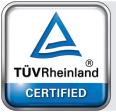
012 719 9736| info@unica.co.za
9th Street Erf 87, Babelegi, Pretoria, South Africa
EDITOR Joe Forshaw
joe@enterprise-africa.net
SENIOR PROJECT MANAGER Sam Hendricks
sam@enterprise-africa.net
SENIOR PROJECT MANAGER James Davey
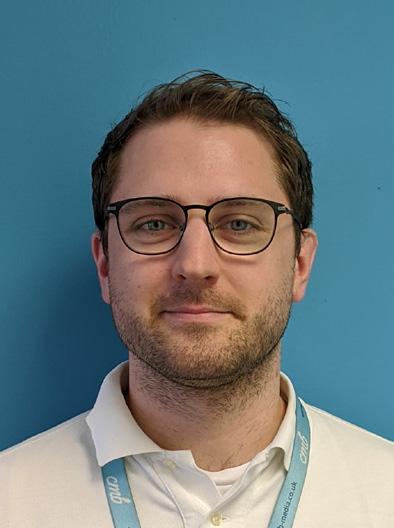
jamesd@enterprise-africa.net
PROJECT MANAGER Ekwa Bikaka
ekwa@enterprise-africa.net
PROJECT MANAGER Eleanor Sarbutt-King
eleanor@enterprise-africa.net
PROJECT MANAGER Jamie Waters
jamie@enterprise-africa.net
LEAD DESIGNER Aaron Protheroe
aaron@enterprise-africa.net
FINANCE MANAGER Isabel Murphy
isabel@enterprise-africa.net
CONTRIBUTOR Manelesi Dumasi
CONTRIBUTOR Timothy Reeder
CONTRIBUTOR Benjamin Southwold
CONTRIBUTOR William Denstone
Repurposing, replacing, reusing, and reshaping are key parts of a circular economy, and it is the responsibility of big business the drive this concept. No more is it acceptable to succeed at all costs. There is renewed focus on sustainability, and those that invest are those that thrive.
At Sappi, there was a need to reuse a machine that was lacking capacity. No newspaper orders as a result of the pandemic left it dormant. The company quickly went about developing a new product which could run through the machine and solve a new problem in the market. It was quick and quality, and resulted in major success for Sappi and its clients.
At Dogon Group Properties, an “old brown building” on Bree Street in Cape Town has been demolished and is set to be developed, by Lurra Capital, into the first biophilic building in Africa. Instead of abandoning the area, repurposing the corner block is breathing new life into the area with a 24-storey beacon of what is possible.
For the EduPower Skills Academy, part of the Daly Group, the repurposing is more of an upskilling as it helps to train and develop young South Africans out of work, preparing them for a career in the BPO sector.
GAIA, the infrastructure investment company, is creating a structure where funders of vital projects can exit successfully, before recycling their capital in new projects. This drives the ongoing rollout of vital developments in South Africa.
This type of attitude towards making things work, whatever the input, separates the good from the great. If you can take something that has been used and enjoyed, recycle and repurpose, and it make it useful once again – whatever it might be – then you are already two steps ahead.
Get in touch and tell us more about your company’s circular endeavours. We’re online at LinkedIn
Published by
Chris Bolderstone – General Manager
E. chris@cmb-multimedia.co.uk
Fuel Studios, Kiln House, Pottergate, Norwich NR2 1DX +44 (0) 1603 855 161 www.cmb-media.co.uk
CMB Media Group does not accept responsibility for omissions or errors. The points of view expressed in articles by attributing writers and/or in advertisements included in this magazine do not necessarily represent those of the publisher. Whilst every effort is made to ensure the accuracy of the information contained within this magazine, no legal responsibility will be accepted by the publishers for loss arising from use of information published. All rights reserved. No part of this publication may be reproduced or stored in a retrievable system or transmitted in any form or by any means without the prior written consent of the publisher.
© CMB Media Group Ltd 2022
6 16 24 34 42 50 56 62 68 74 82
16 MIRO
Connected MiRO Successfully Navigates Turbulent Environment
DOGON GROUP PROPERTIES
The Fynbos Takes Root in Cape Town
SAPPI – LUFIL PACKAGING
Partnerships Drive Promising Paper Innovation
NAMIB MILLS
40 Years and Still Cooking at Namib Mills
BATA SOUTH AFRICA
A Confident Step Forward for Bata South Africa
SAKHIWO HEALTH SOLUTIONS
Universal Understanding Underpins Trusted SAKHIWO
METSO OUTOTEC
Planet Positive Approach Accelerates Sustainable Development
RHEINMETALL DENEL MUNITION
Sights Set Firmly on the Future
JOTUN PAINTS SA
Jotun Goes Lean in Growth Push
GAIA GROUP

New Gaia Funds Accelerate Ethical Opportunities
HOLLARD MOZAMBIQUE
Optimistic Outlook for Healthy Hollard
90 96 104 110 116 122 128 134 140 146
STANDARD LESOTHO BANK
Customer-Centric Banking with Added Cloud Convenience
EDUPOWER SKILLS ACADEMY
EduPower Bets on BPO to Close Skills Gap
MARSH AFRICA For Marsh, the Purpose Is Possibility
AVBOB There for You in Your Times of Greatest Need
RAND MUTUAL ASSURANCE A Constant Source of Warmth, Compassion and Care
QUESTEK ADVANCED TECHNOLOGIES
Getting the Right Message to the Right People, at the Right Time
MASTERPARTS
Masterparts Growth Shows No Signs of Slowing
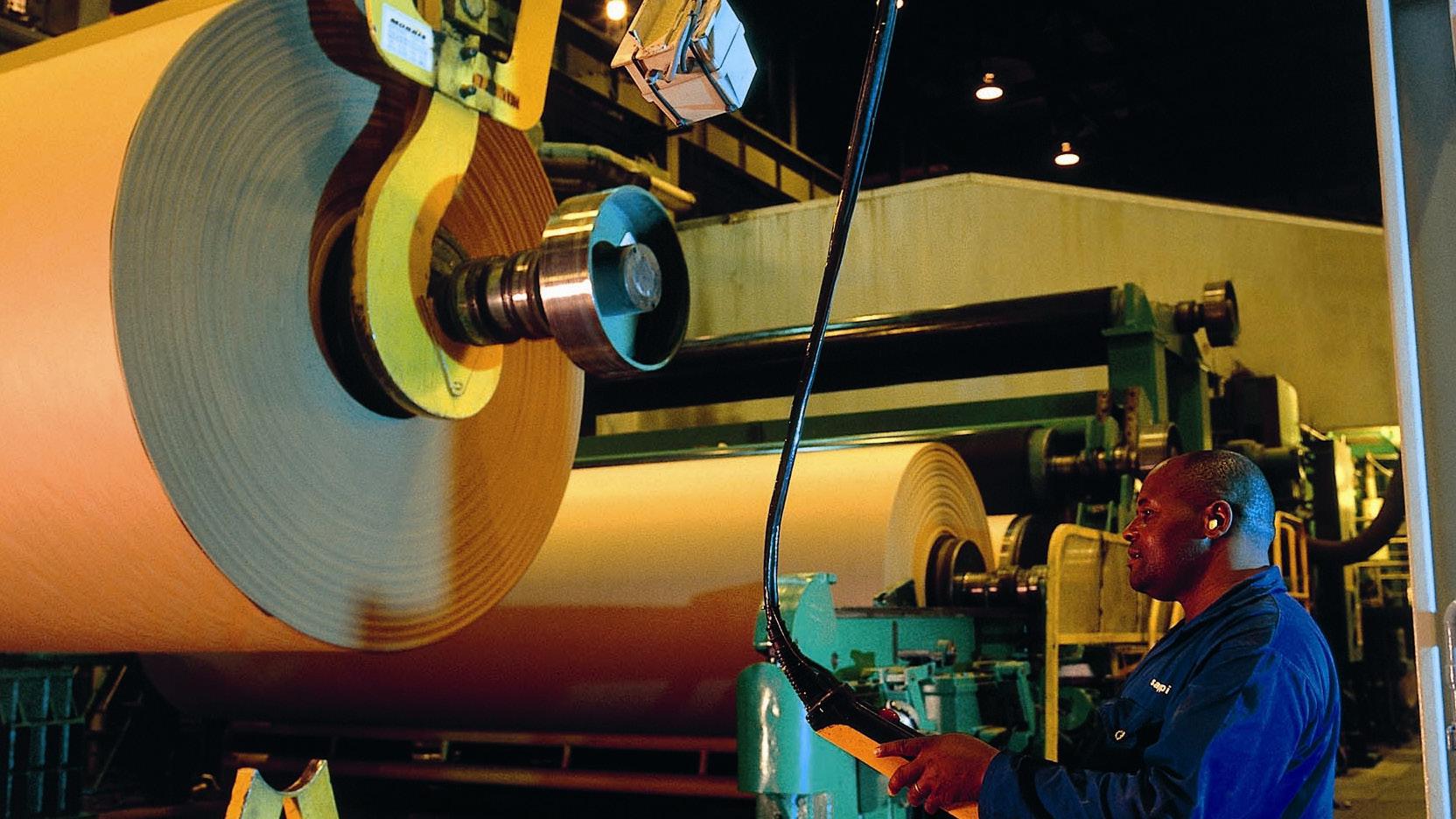
WEBUYCARS Hitting Top Gear and Still Accelerating
ACKERMANS
Vision of Value at Ackermans’ Heart
BRITISH AMERICAN TOBACCO
120 Years at the Top of the Tobacco Tree
MiRO – the leading distributor of broadband and related tech products in the SA market – has the wind in its sails following tremendous demand for its brands in 2020. Now, the business has its sights firmly set on growth, pushing world-class brands wherever possible as SA continues its connectivity drive. Head of Marketing & Training, Ryan Dunford, talks to Enterprise Africa about the company’s outstanding proposition.
 PRODUCTION: Joe Forshaw
PRODUCTION: Joe Forshaw
For 20 years, MiRO - southern Africa’s leading distributor of Wireless, Networking, VoIP, and IP Video products – has been solving problems for clients and bringing world-class IP convergence solutions that ensure the country can connect, communicate, and inevitably succeed. An unrivalled support experience combined with an exceptional product range has helped the company to grow significantly, making meaningful progress and living by its mission statement of ‘empowering your company to connect communities’.
With offices in Johannesburg, Mbombela, Durban, and Cape Town and a vast distribution
network across sub-Saharan Africa, MiRO’s coverage is continental.
After a tough few years, where many have felt the pressure from a problematic demand and supply environment, MiRO has used its knowledge and scale to ensure customers can continue growing their businesses at all times.
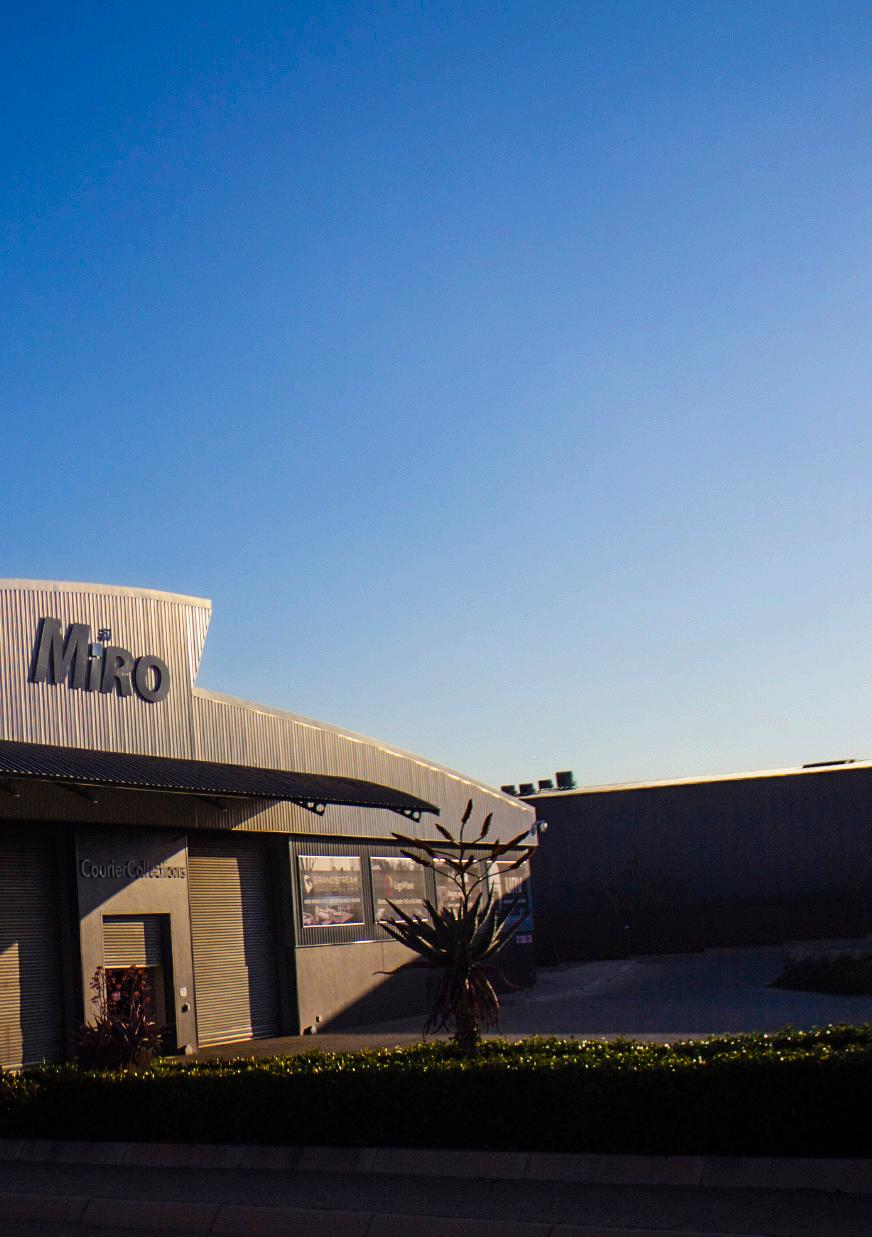
“A calm sea never made a skilled sailor,” smiles Head of Marketing & Training Ryan Dunford. Remembering the harsh lockdown in South Africa in March 2020, he says MiRO braced for a challenging period but took a confident outlook. “We weren’t going to sit back and wait for the storm to hit. We rode headfirst into it. We believe those who can bend with the wind can weather any storm. All businesses had unique challenges, and we looked at what we could do, our values, and how to manage this unpredictable environment. We went back to our values and our vision – to serve as an inspiration to the industry. Being
pessimistic was simply not an option.”
This approach helped the company weather unpredictability throughout the pandemic, ultimately leading to significant growth and adding to a long history of innovation and progress.
Founded in 2003 in what Dunford labels a ‘classic, heart-warming entrepreneurial story’, starting in a home with a vision to solve a connectivity problem, MiRO’s initial offering was the import and local assembly of wireless access points – network devices that connect wireless appliances.
From 2000 to 2010, the number of people using the internet went from around 400 million to more than two billion. The number of websites boomed from approximately 17 million to more than one billion in 2018. MiRO thrived as more and more people moved online. The company became the local expert in access points and
ALL BUSINESSES OUT THERE HAD THE SAME CHALLENGES, SO WE LOOKED AT WHAT WE COULD DO, WHAT ARE OUR VALUES, AND HOW WE COULD MANAGE THIS UNPREDICTABLE ENVIRONMENT
internet connectivity in its early years. It began partnerships with the industry’s best brands as demand for coverage spread and people and businesses needed to transition online.
“The company had already cut its teeth assembling access points, and when world-leading suppliers started coming to the market – big brands like EnGenius, Ubiquiti, and Mikrotik – the MiRO executive committee wasted no time onboarding them,” says Dunford.
At the turn of the millennium, devices with the ability to connect to a wireless network became more popular, everything from laptops, security cameras, alarm systems, and phones. In 2007, with the launch of the first iPhone and the subsequent development of the era of touchscreen smartphones, wireless connectivity shifted from being a luxury to a human necessity.
“That was a big deal, and through
partnerships with the industry’s best, MiRO grew drastically, expanding its portfolio into other complementary IP categories,” says Dunford.
“When you have an internet presence, that’s when the party starts,” he adds. “That is when you can start building IP surveillance systems, hosting countless simultaneous voice calls, creating large capacity broadband backhauls, introducing the internet of things etc. The infrastructure provided by wireless broadband internet was a catalyst for a massive surge in demand, and MiRO was perfectly positioned.”
Joining MiRO in 2015, moving from a sister company, Dunford knew immediately that MiRO was the place to be and that there was an evident appetite to succeed while helping to grow the industry.
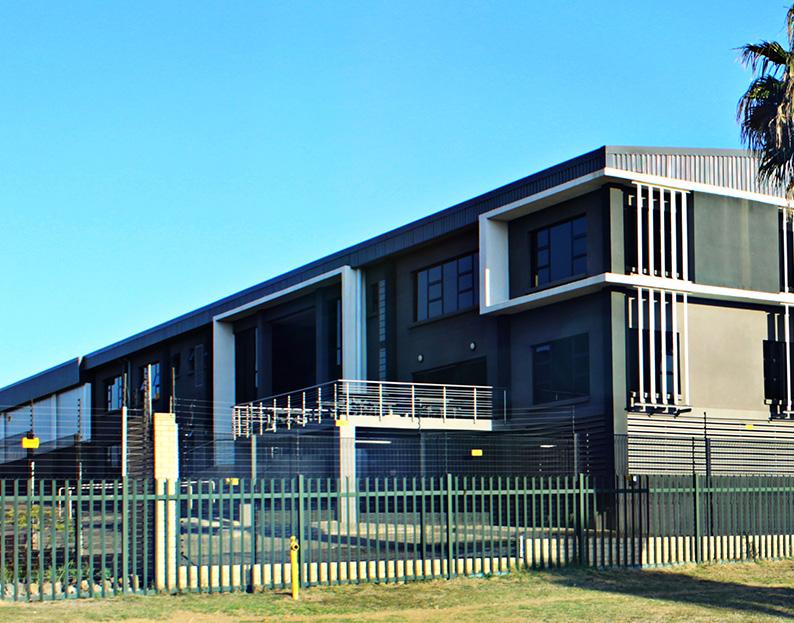
“I remember walking in and being amazed by the speed of everything. Things were fast, people
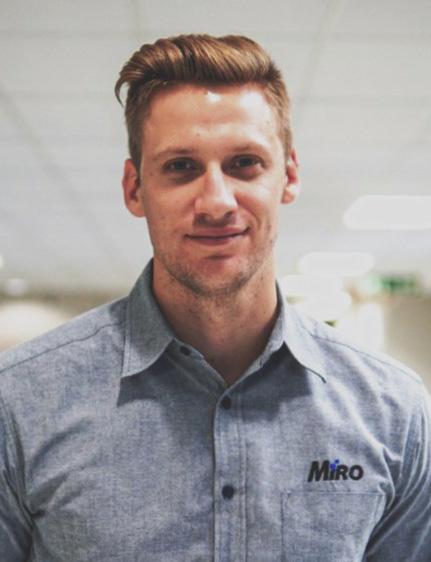
WHEN YOU HAVE INTERNET, THAT IS WHEN THE PARTY STARTS
moved quickly, and deals were happening. I could see it was a thriving and evolving business.”
MiRO is a business-to-business organisation selling leading products and brands across southern Africa.
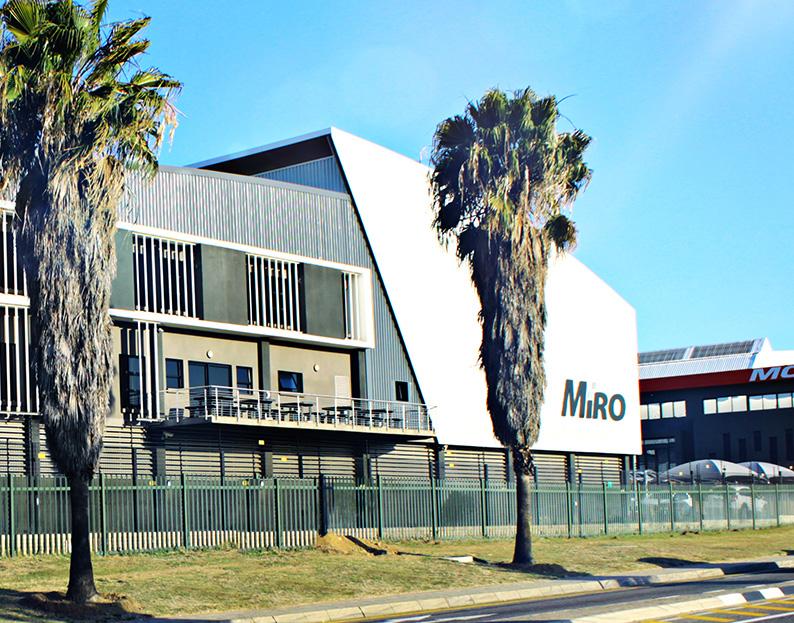
The company’s vast brand portfolio contains only the highest quality products. Supplier relations that have been built and nurtured over decades, these brands have incomparable intellectual property and solve many problems for Internet Service Providers (ISPs), integrators, and
managed service providers (MSPs). From its core access points and wireless connectivity to IP security, networking, VoIP, IoT, access control, and more, MiRO can provide a fully-fledged IPconvergence solution for any client.
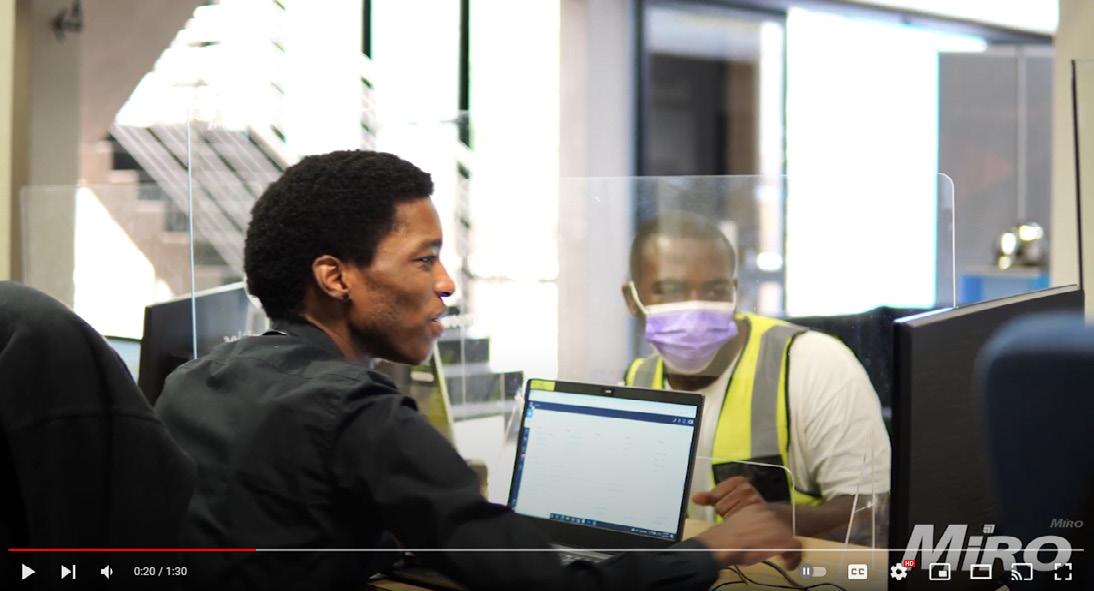
“Wireless ISPs come to us and get the masts, broadband connectivity equipment, assistance with the licensing, the cables and connectors, the panels to run the system off-grid, and much more. Our six primary solution categories are broadband wireless, Wi-Fi, voice over IP (VoIP), IP security, fibre networking, and training and certification. We have headline brands in each of these solution categories,” he adds.
Mimosa – a division of Airspan – is a wireless broadband enabler perfectly suited to more challengingto-reach areas, not suitable for fibre. A pioneer of gigabit wireless technology, this affordable partner has a range
of solutions available in South Africa, exclusively through MiRO.
Cambium Networks manufactures outdoor broadband wireless, enterprise Wi-Fi equipment, and network switching gear. The company can build world-class networks with the support of a global community and MiRO teams in southern Africa to assist in the speedy rollout.

Grandstream Networks is globally recognised for manufacturing VoIP, video communications (VC), and IP networking technology. The company has a range of phones, adapters, access control devices, and other solutions to manage unified communications for SMBs and large enterprises.
Uniview is a security provider in the IP surveillance sector. One of the largest manufacturers in the world and available in 145 countries, this brand has a strong product portfolio known in South Africa through MiRO.
Tenda Technology is a leader in the networking sector, offering a range of technologies, including
home routers, network switches, range extenders, and smart plugs. Perfect for home and small office applications, Tenda and MiRO can price affordably to move clients’ business forward quickly.
The MiRO Academy helps entrepreneurs and employees (internal and external) to upskill in the ICT space, learning about IP networking, Wi-Fi, Fixed Broadband Wireless, VoIP, and power solutions. Online and in-person courses are delivered nationwide through a sophisticated blend of certification and fundamental courses to lower the barriers to entry into the industry.
These, as well as a strong range of other brands, are essential in the MiRO business, and each solves a problem in the market. But MiRO will not simply start supplying the flavour of the month. There must be a solution to a challenge, the technology must be robust, pricing must suit its intended market, and a brand must have social evidence of its results. MiRO is only as good as the brands it promotes, and vice versa. Without MiRO, these
brands would struggle to access the potent southern African market.
For Dunford, without social proof of outcomes, a stringent onboarding process would not even begin for new brands.
“The main thing about our partnerships is that we must solve a customer’s problem,” he says.
“It’s about reputation; because of the nature of the physics behind our solutions, it’s tough to fake it. The proof is in the pudding. The thing about technology is that you absolutely cannot fake it. Your equipment will break, you will lose customers, and your reputation as a quality supplier will be damaged.”
A team of product managers scour the globe for solutions from reputable brands that can add to existing offerings, allowing MiRO’s customers complete flexibility and reach to do all their shopping under one roof. If an ISP wants to connect a lodge in rural Limpopo or a full, business-
critical end-to-end technology suite for a corporate HQ in Sandton, MiRO can provide an end-to-end tailored solution and back it up with project financing and credit accounts.
“We do our best to stay on the forums, listen to the chatter, attend as many industry events as we can so that we can make informed decisions about a new venture,” says Dunford. “When we believe a vendor is a suit for us, we check to see if a competitive gap exists. We check multiple sources before starting a conversation. We want social proof that a brand does its job. We must ensure they are solving a problem, and we have a rigorous ISO onboarding programme
that looks at several factors, namely environmental and social impact.”
MiRO enjoys positive relationships with many local and international distributors and can quickly dial into the wider industry to evaluate. MiRO works closely with customers to understand the needs of the market. “We do not like to over promise and under deliver,” says Dunford.
In September, MiRO announced a new partnership with Ring Internationally acclaimed for solid performance, affordability, and ease of use and set-up, Ring products include video doorbells, security cameras, and alarms for home applications. All are connected to a wireless network and backed up with cloud storage. This simple but effective solution filled a gap in the market, and MiRO is so far delighted.
“Ring has universal appeal, and the technology suits us,” says Dunford. “Not everyone wants a full end-to-end surveillance system for their house. Some people want a single doorbell and a floodlight
camera outside. Ring has solid social proof and validity in various markets, making them an ideal partner. Their product range fits with us very well alongside the larger enterprise-type solutions that we offer. It is part of a listed company, and therefore we can see the level of compliance, which also gives us confidence.”
Recently, MiRO was able to put its range to full use at the exciting Leonardo building in Sandton. Newly complete and labelled as the tallest African building, a stone’s throw from the JSE, the Leonardo is a flagship in the South African development space. Described by its owners as ‘the ultimate luxury lifestyle destination’, the building is home to 232 apartments, gardens, sporting facilities, retail space, a restaurant, a hotel, and much more.
MiRO was on hand to provide all the Wi-Fi required to connect the space, which stretches 234 m into the Gauteng sky, including more than 15,000m2 of premium office
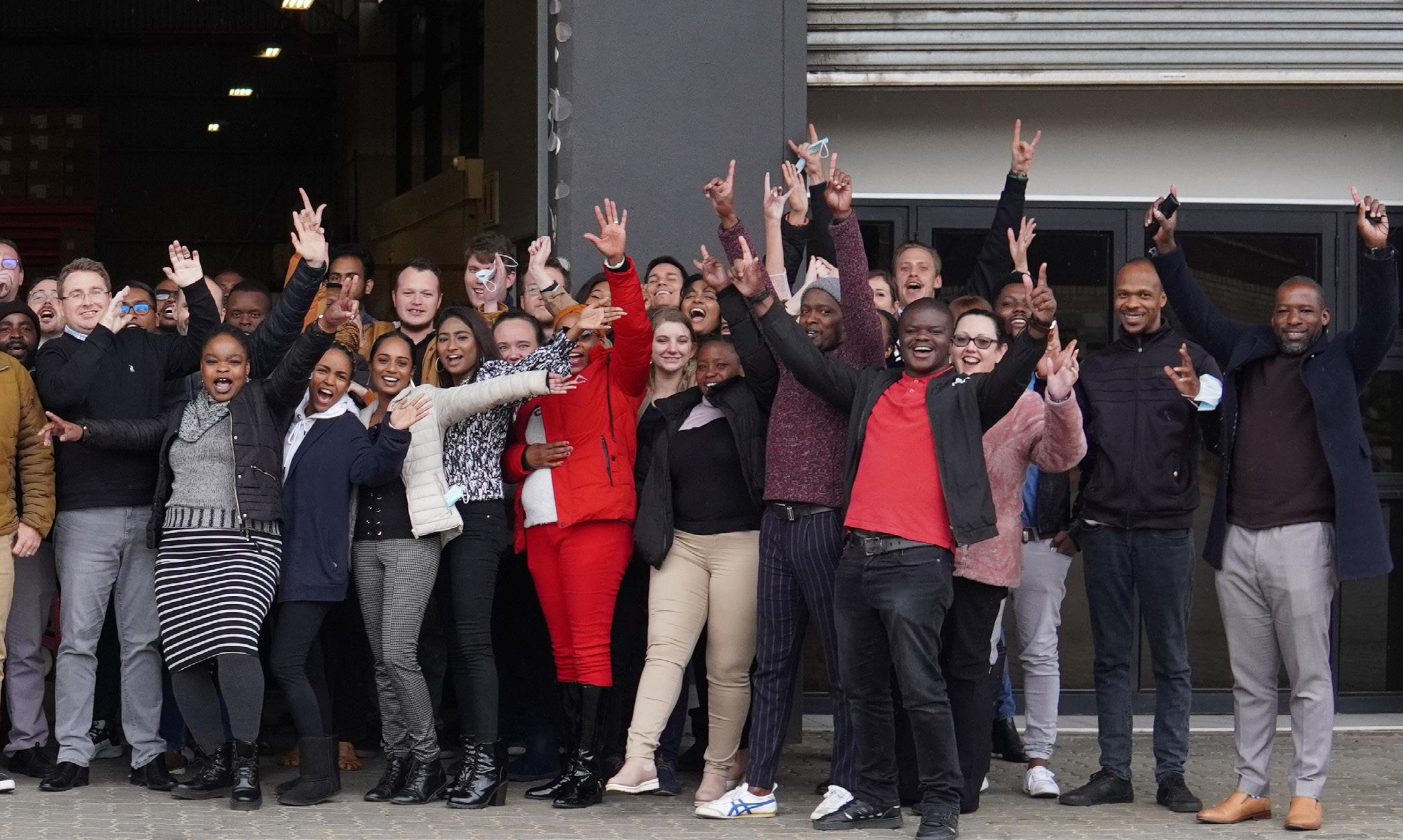
WE DID BRACE FOR A DOWNTURN IN DEMAND. HOWEVER, WE REALISED THE COMPLETE OPPOSITE
building on the continent’, with the help of MiRO products, the Leonardo will remain connected, and so will its patrons.
space and a 2100m2 penthouse which will be one of Africa’s most expensive properties. Utilising UniFi technology from Ubiquiti, Wi-Fi coverage is uninterrupted for everyone, even in elevators.
“We completed the entire Wi-Fi solution, and it is one of the largest corporate buildings in Africa. They told us what they needed, we helped plan the solution, and then delivered everything. We don’t do the physical installation or provide any last mile services, but all the equipment and project support comes from us,” says Dunford.
Typically, MiRO has strong and historical relationships with project managers, landlords, installers, and building managers, providing solutions to keep property connected efficiently.
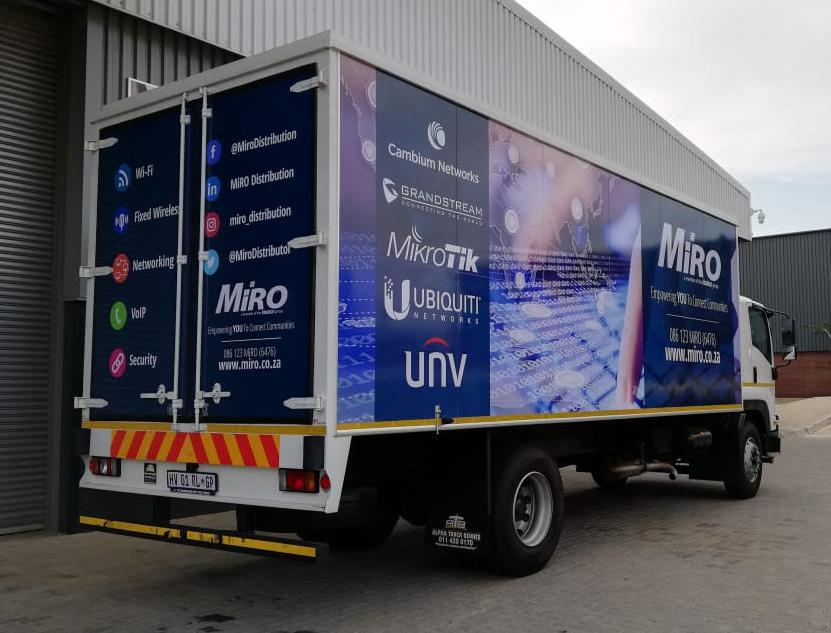
“A landlord might say to a project owner that they want LTE failover for all Wi-Fi routers and backup power for the entire building. The project owner will hire an installer to contact MiRO, and we will provide recommendations.
“Our core business is to enable the growth and development of other businesses. We provide training on managing, monitoring, and maintaining the network,” he continues.
“Technology is very sophisticated and is becoming more complex. For our customers, installing an enterprise Wi-Fi solution ten years ago is vastly different today because of new innovative management tools and increased sophistication of the devices.”
Described by the development group as ‘the most technologically advanced, environmentally friendly
As supply chain chaos followed periods of mass uncertainty around the world from 2020, and manufacturers struggled to get the parts they needed to keep up with demand in ’21 and ‘22, MiRO was quietly continuing to serve its channels with products and technology that others could not access. Holding a healthy stock level and partnering with reliable brands worldwide, the company did not immediately run dry.
“It has been a wild ride and a crazy experience,” says Dunford. “South African lockdowns were harsh and scary, but our business was already primed to manage a shift to working remotely. We could move staff to work from home very quickly. Shifting the business was seamless, but we did brace for a downturn in demand. However, what happened was the complete opposite. We were deemed essential, and everyone was working from home and requiring not just good internet but coverage as well.”
Previously, homes typically had a single router providing Wi-Fi across the house for multiple devices. With the lockdown, many people were sent to work from home, with laptops pulling bandwidth, TVs streaming, children online learning, and phones updating software. The need for secure connectivity was dramatically increased. “You couldn’t maintain that position with existing infrastructure, so there was a massive spike in demand. 2020 was probably the busiest we’ve been in our existence, and we grew significantly,” highlights Dunford.
But following the boom of 2020, the next 12 months were more of a challenge as the international shortage of semiconductor chips hit manufacturers. Integrated circuits are present in all electronic products
OUR ONLINE BUYING EXPERIENCE IS BETTER THAN THE REST OF THE INDUSTRY AND IT GIVE US A LOT MORE EXPOSURE
but only made in a limited number of locations globally. As demand far outweighed supply, only the stronger brands were able to gain access to chips. Those that failed to meet the needs of their clients felt the pinch.
“We managed to service all of our customers in 2020,” says Dunford, “but in 2021, we couldn’t get our hands on stock. Fortunately, the way that our business is positioned, we weren’t reliant on any single manufacturer. Three of the five Wi-Fi vendors we worked with went bust, but the other two were well-placed. We backed those two and ordered significant volumes. The way MiRO had diversified its product lines a decade ago was our saving grace.”

He adds that even now, some vendors still struggle to keep up with demand, further reinforcing the need for MiRO to maintain good, robust, quality stock levels. As online activity becomes more accessible and the digital world is further embedded in the physical, there will be more demand for products that enable that bridge.
“We have backed the brands that were there for us through this period of unpredictability. While it has been bumpy, we believe there will be a surge in demand. Our research shows that 30% more South Africans are online shopping now. That number is only growing as people become more comfortable online.”
MiRO has invested heavily in its online presence, allowing customers to purchase seamlessly. Now, clients can log onto the secure MiRO website and complete a simple onboarding procedure before ordering stock, gaining credit, and reselling into their local market – MiRO handles all certification, approval, and marketing.
“We have seen that when a business buys online for the first time, there is a high probability they will buy online again. We have worked hard to deliver an online buying experience that is better than the rest of the industry, giving us much more exposure. For the next year, we must ensure we have enough stock to deliver to our customers. Stock is king. In our game, you’ve got to have the merch to make the sale,” smiles Dunford.
The key strength of the MiRO business is its brand portfolio. But the company’s reach is also what makes it powerful. With three essential channels for the business – resellers or sub-distributors; service providers; and IT managers, system integrators, security installers, or project managers – MiRO reaches across southern Africa. Where it doesn’t have a physical branch presence, the preference is to form productive partnerships with reputable local players. This strategy has allowed the company to become known as an industry leader.
“Whenever technology needs to converge over IP, we have the solutions,” said Dunford. Bringing the world’s best technology and partnering with those that understand the local conditions and can ensure efficient rollout, sees MiRO able to stride closer every day to achieving its mission.
“We deal with thousands of clients, and they are comfortable sharing information with us because we are transparent. We want our industry to make smart, informed decisions so that they can grow. If they grow, they can order more. Hopefully, we then build long-term partnerships that could not happen without us,” says Dunford, adding that broadband infrastructure is now vital in daily life. Without substantial rollout in South Africa, many will be left behind.
“Our slogan is ‘we empower you to connect communities,” he concludes, and the company does just that. By holding consistent stock from an unrivalled portfolio of brands and servicing clients across a vast geography – even through the pandemic and ensuing economic slowdown – MiRO is driving the region’s connectivity, navigating stormy seas as a good captain of industry.
Mimosa Networks, a division of Airspan, provides wireless broadband solutions that enable service providers to connect dense and hard-to-reach areas at a fraction of the cost of fibre. Their access, backhaul, and client solutions are deployed in a hybrid- fibre-wireless architecture and is engineered for both point-to-point and point-to-multipoint connections across a variety of applications.
Cambium Networks is a leading manufacturer of broadband outdoor wireless and enterprise Wi-Fi equipment. The Cambium Networks technology portfolio is used by internet services providers and integrators around the world to connect people, places and things.



Grandstream Networks is a manufacturer of voice-over-IP (VoIP), video communications (VC) and IP networking technologies. Their extensive product offering includes SIP IP Phones, FXS and FXO VoIP Gateways, analogue telephone adapters (ATAs), video conferencing solutions (GVC series), access control devices (GDS series), Wi-Fi access points (GWN series) and IP-PBXs (UCM series) which facilitate and manage unified communications for SMB and large enterprises.

Founded in South Africa in 2003, MiRO has grown to be amongst South Africa’s leading distributors of Wireless, Networking, VoIP and IP Video products. MiRO has the experience and a proven track record of supplying powerful, flexible and scalable solutions to our client’s communication requirements.

Uniview is a front runner in the IP surveillance industry, offering customers the perfect security solutions with their wide range of products, competitive pricing and the latest in surveillance technology.

Do you have a big surveillance project? Submit your details here to qualify for exclusive project assistance and deals.
Tenda Technology is a leading networking supplier of affordable, feature-rich home and small office solutions. They offer a range of connectivity appliances such as home routers, network switches, range extenders and smart plugs.

Do you have a big opportunity on Tenda? Click here to submit your details and stand a chance to qualify for additional MiRO discounts.
MiRO Academy is aimed at helping you understand ICT concepts and put them into practice. Access everything you need to master concepts such as IP networking, Wi-Fi, Fixed Broadband Wireless, Voice over IP and the Internet of Things.Our online courses enable you to upskill and prepare yourself for the job market. This is also a great platform for aspiring entrepreneurs to discover everything they need, for their next start-up.
www.miro.co.za

Dogon Group Properties is very excited about progress on site with the Fynbos – Africa’s first biophilic building. A living, breathing structure in the heart of Cape Town, demolition is underway and soon, the building will grow and blossom from roots being set deep in Bree Street.

In December 21, Alex Horne, Managing Director at Dogon Group Properties, told Enterprise Africa that the company was thrilled to be involved in Africa’s first ever biophilic building. As the lead agent, the company would sell modern, beautiful homes in the new high-rise on Bree Street in the heart of Cape Town – voted as Africa’s Best Destination at the World Tourism Awards in 2019 and the third greatest city on earth by UK newspaper, the Telegraph in 2022.

A development from Lurra Capital (Lurra Capital is an invitationonly private capital investment firm headquartered in Switzerland, overseeing $5 billion from a group of families and wealthy investors. It sources the most desirable and strategic investment opportunities globally via a highly effective and powerful network), the Fynbos will be a living, breathing
piece of art in the centre of Cape Town’s city bowl. 689 apartments will span 24 storeys, alongside a rooftop sunset terrace with lap pool and co-working space, a rooftop fitness centre, as well as a ground-floor plant-based restaurant, a tearoom, and a botanical bar.But it is the green credentials and the inclusion of real life in the design –before people move into the building – that is attracting buyers from all over the world. Dogon Group Properties is known for marketing world-class developments, and there is something extra special about the Fynbos.
“Selling a development is like selling art – you have to sell a dream. At the moment, we don’t have anything to show the client but, we expect to see a lot more interest now that demolition is underway,” says Sales Lead, Keagan James.
Clearance of the site was finished recently, with a former building
completely removed, and the whole city-block opened up. Close to the city’s famous Company Gardens, in a chic but busy neighbourhood, progress had to manged carefully.
“It’s a very exciting time,” says James. “We have waited some time to get demolition going because there was a meticulous process required to remove an old asbestos roof. The developer appointed a registered asbestos contractor to remove the 39 tonnes of asbestos safely. That
// WE HAVE STARTED WITH DEMOLITION
AND WE HAVE SEEN SO MUCH PROGRESS IN THE LAST FEW WEEKS //
was painstaking but we are now past that, and the team is on site. We have started with demolition and we have seen so much progress in the last few weeks. The roof has come down, the exterior walls have been worked away, and it’s a densely populated area so we cannot just go in with a wrecking ball and flatten the place – we have to be very careful with the process.”
The next steps on site will see construction go down as four-levels of basement are put in place, before builders move upwards and the muchanticipated show unit is completed.
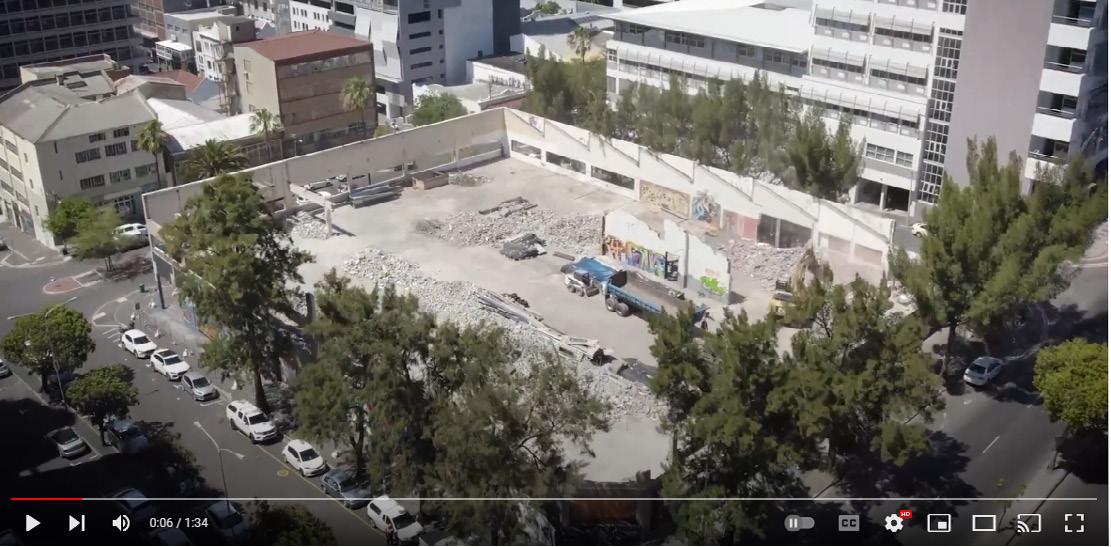
“It looks very different. Before, it was a run-down old, brown building but now, the area is totally open,” smiles James.
The Fynbos is named after a distinct type of vegetation and plant-life found only at Southern Africa’s tip. Present
across Table Mountain national park, and widely across the Western Cape’s natural environment, fynbos adorns the crest of the South African national cricket team and the country is proud of its unique biodiversity.

“What is also unique is that, not only is it an incredibly good-looking product, it assists with the absorption of
CO2, it minimise heat impact, it benefits from reduced energy consumption, and the design has integrated solar panels which will generate double the power needed for the common areas of the building - this is not just another cookie cutter building,” boasts James, of the soon-to-be green building certified structure.
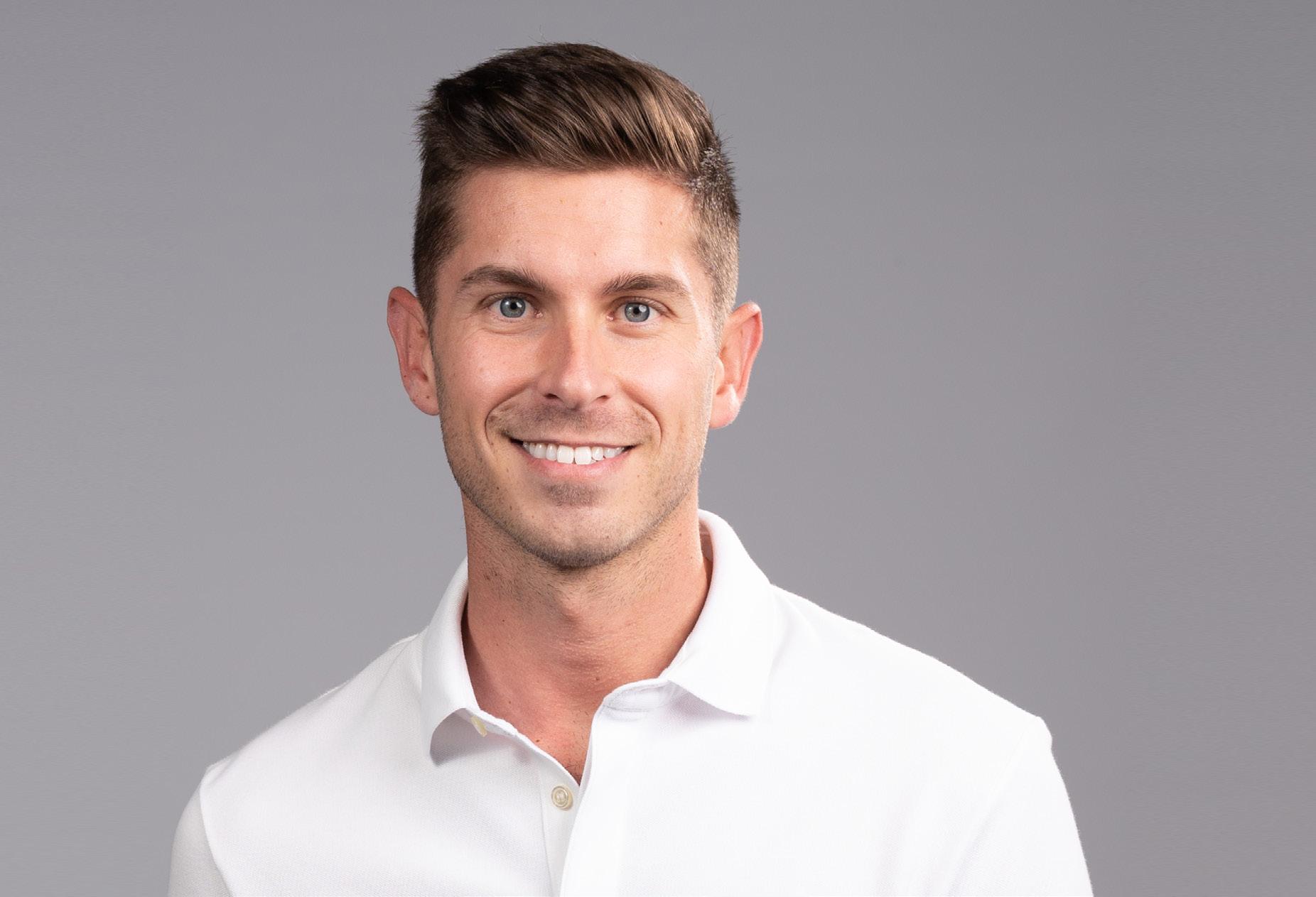
Plants on the building’s exterior have been specifically selected to provide shading and cooling. They will also deliver noise buffering and air filtration. A sophisticated rainwater harvesting system will help reduce dependence on the local supplier, and large glass windows and sliding doors will be double-glazed to ensure warmth and energy efficiency in the winter. Solar panels will help reduce fossil fuel consumption, and the 1200m2 vertical gardens will be home to more than 50 different species of tree and shrub which will beautify and elevate. Plants have been selected for their ability to withstand harsh conditions, but will be supported by a complex monitoring system which will track root progress and inform specialist gardeners of
issues that require attention. Trees will be anchored in special planters, and the whole system will follow the design of Mother Nature across Table Mountain with larger trees at the base, heavier bushes in the middle, and lighter, cascading shrubs at the top.
“We have seen other green developments pop up since we launched but not to the scale of the Fynbos,” says James. “There is certainly effort to make green elements part of developments and I am very
pleased that Lurra Capital has set a precedent – I’m sure we will see more of it because it is needed. In a densified area, in the city, it will be such a standout building. There will be different trees and other plant species growing, and the different in colour and shapes as the seasons comes and go will make it a constantly changing landmark. Of course, everything is 100% indigenous to the Cape. We are
Continues on page 22
// I HAVE RECEIVED MANY CALLS FROM PEOPLE WHO ARE NOT NECESSARILY IN A POSITION TO PURCHASE BUT JUST WANT TO COMMEND US FOR THAT WE’RE DOING //Keagan
For various valid reasons – whether business continuity, estate planning or tax liability efficiency –properties are often held by entities or trusts. From a conveyancer’s point of view, there are a few important considerations that seller and purchaser entities are often unaware of and which lead to a bumpy start for the process to register transfer in the deeds office. We list a few of the most common omissions below


Where a company or close corporation enters into a sale or purchase agreement, the conveyancer will require proof of the decision-making by the entity This is achieved when the company’s directors (or close corporation’s members) sign a resolution confirming the details of the transaction that they approve for the entity For example, the resolution should at least reflect the details of the property involved, the transaction amount and the director or member that will represent the company or close corporation in signing the transfer documents
In addition, if the land being sold is the only asset of the company or represents more than 50% of its assets, a shareholder resolution must be obtained (This Companies Act requirement protects shareholders and calls for their consent when a major asset of the company in which they are investors, is being disposed of)
In the instance where it is a trust that is transacting, there is the additional warning bell that the resolution must have been passed and recorded in writing before the agreement to buy or sell the property is signed Failing to do this renders the agreement invalid

In the event of companies and close corporations, on the other hand, ratification is allowed

With money-laundering rife and fraudsters targeting property transactions more and more to facilitate the flow of ill-gained funds, our Financial Intelligence Centre Act and “FICA obligations” have become more rigorous These include an obligation on accountable institutions (including the conveyancing firm and estate agent involved in the transaction) to establish and verify who the beneficial owner of a juristic person (as a party to the transaction) is Essentially, the enquiry after the identity of the beneficial owner is to ascertain who the living person is who manages, controls or benefits from the transaction To identify this person(s), the entity or trust will be asked to obtain and disclose details of the individuals ultimately involved in the entity’s management and control, which may be onerous to comply with.
To ensure that your transaction proceeds without stumbling blocks, it is advisable to work with a conveyancer from the start, as soon as you have decided to sell or purchase Contact James Phillipson (JamesP@stbb co za) or visit us on stbb co za or at info@stbb co za
Continued from page 20
definitely proud to be a part of it.
“I have received many calls from people who are not necessarily in a position to purchase but just want to commend us for that we’re doing. They appreciate that it is a building that can help the environment and encourage more green urban development,” he adds.
The reason Dogon Group Properties is trusted and admired for its work on major developments is because of its ability to nurture strong relationships with clients, based on transparency and human interaction. Alexa Horne said in 2021: “Digital technology will never replace human interaction… At Dogon we control tech. It doesn’t control us.” James agrees and says that this
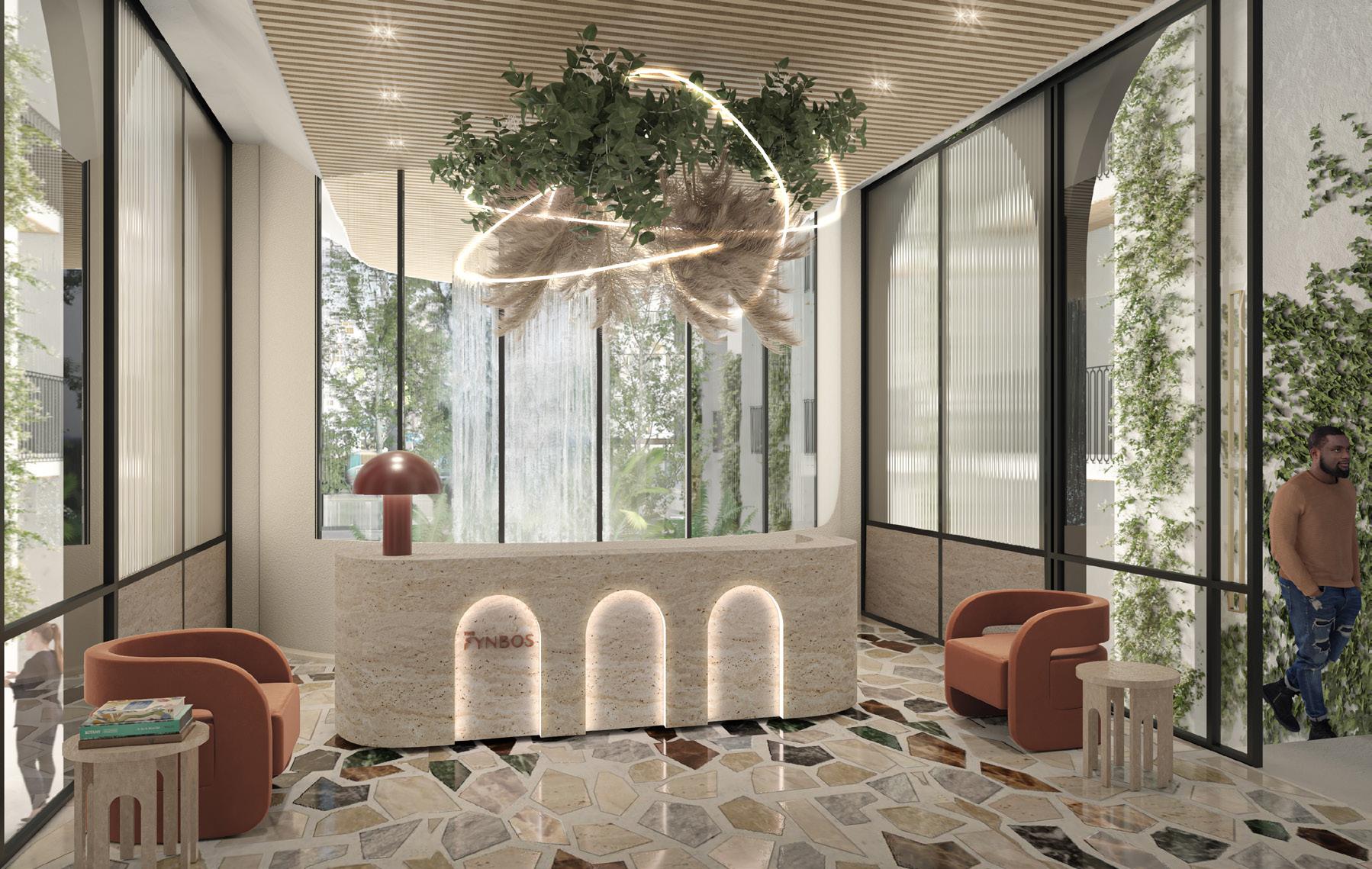
approach has seen the company reap the rewards in an industry where so many are trusting technology to do the hard work for them.
“It is so much easier to discuss things, and you can see the emotion of a buyer. This is not any little transaction – you are assisting people with the largest investment in their life. It’s so important to deal with people in person. Technology is great but you have to make it work wisely. I always encourage our clients to meet at the office and Covid made that tough. Now that things are more stable, we truly cherish our client relationships and it is easier for us to instil trust in a personal setting.
“We are a very strong development agency, and we are very fortunate that our brand is well-known and developers know they will get the best service and advice from Dogon. Providing the best service and giving the best advice is what is most important to us; that generates repeat business and that is so important in an industry like this where it is incredibly competitive – we put our clients first, for sure.”
As activity on site at Bree Street ramps up, James and team are entering an important stage in the sales process. Quickly, apartments will be viewable, and this beacon of what is possible with strong imagination will emerge
// THIS IS NOT ANY LITTLE TRANSACTION – YOU ARE ASSISTING PEOPLE WITH THE LARGEST INVESTMENT IN THEIR LIFE //
from the bowl. Capturing interest for local and international clients will be key, and that is why human interaction and expert knowledge is key.
“Interestingly, a lot of our investors are local but there is a healthy portion from Europe - that is thanks to the concept,” James details. “Lurra Capital found a gap in the market and they are filling that gap with an incredible product. It appeals to seasoned property buyers but because of the price point, we have had a lot of first-time homebuyers.
“It is an exciting time as it is summer season and there are many tourists in Cape Town. They see the action on site and that pivots us towards more growth and more sales.
Foreign investors love the green concept and despite the tough times – market conditions are not what they used to be – it is very promising to see investors approach us from all around the globe,” he says, adding that
Dogon eclipsed its initial sales target set by the developers very quickly.
In the coming months, new units will come to the market and Dogon will talk to local and international buyers, whether buying a first home in the city or looking for a rental with real earning potential.
“When we saw the initial suggested pricing, we thought it was fair as it appealed to a whole range of investors. Our apartments started at R890,000 and that is in reach for a lot of people. Those apartments sold very quickly as there was such huge demand. Now, apartments start at just over R1 million and those are still very much in reach,” says James.
The legacy that the Fynbos is already building will be lasting. Clearly, the appetite for green building and sustainable management is substantial. Evidently, the market for quality property in Cape Town remains. Obviously, the requirement

for a leading agent, able to provide efficiency alongside human touch is essential. Thankfully Dogon can provide. Originally expected to be completed in the second quarter of 2024, recent works have pushed expectations out, but James remains confident.
“Completion will be in Q4 2024 and that small delay is because we wanted to do things properly, safely with the asbestos and not cut corners.
“Many in the industry are very negative but you cannot think like that. I have hope, positivity breeds positivity, that is how we do business and that is why we succeed,” he concludes.
You can see more about this amazing project at www. thefynbos.com and you can contact Keagan James to learn more about progress and availability.
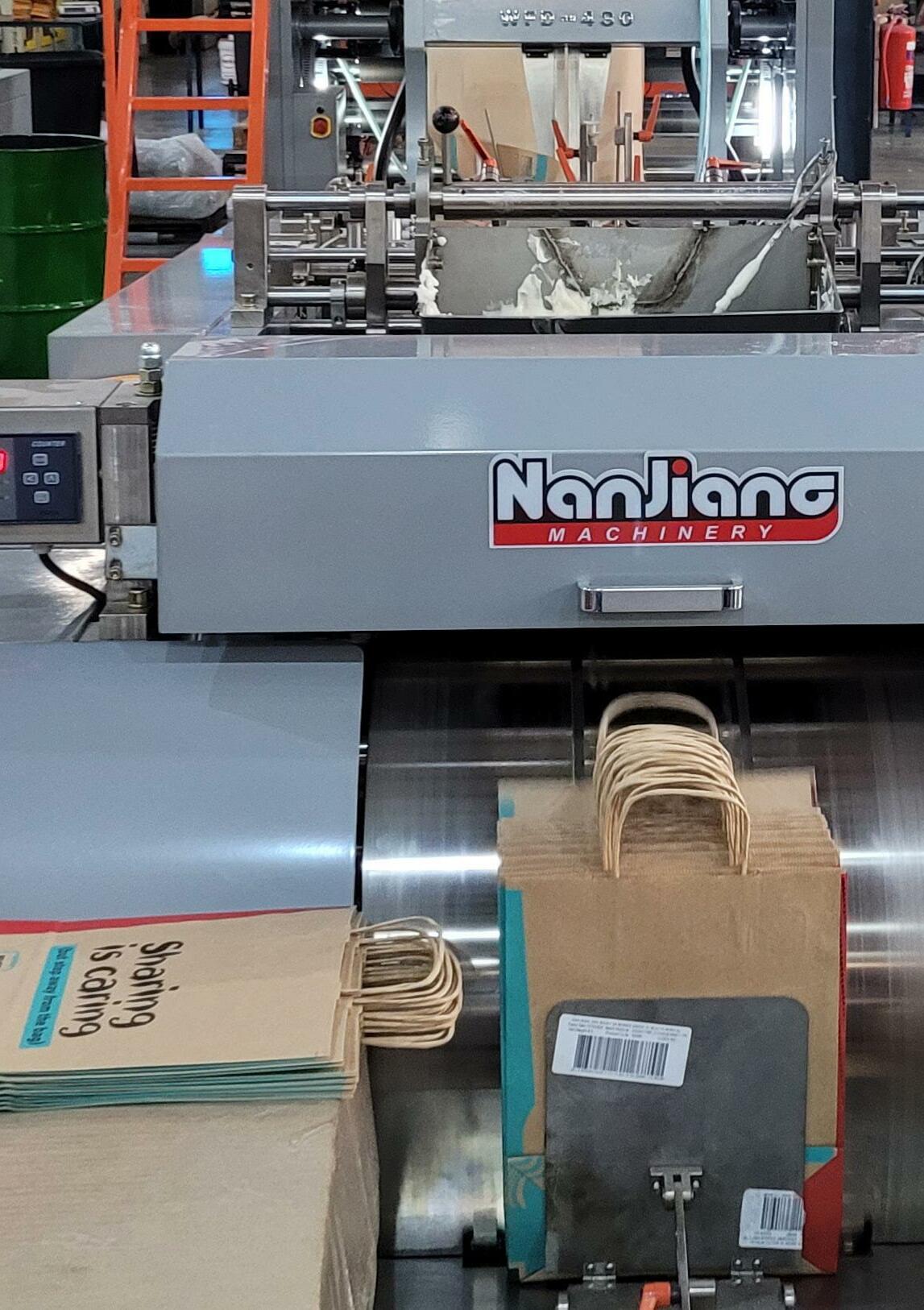
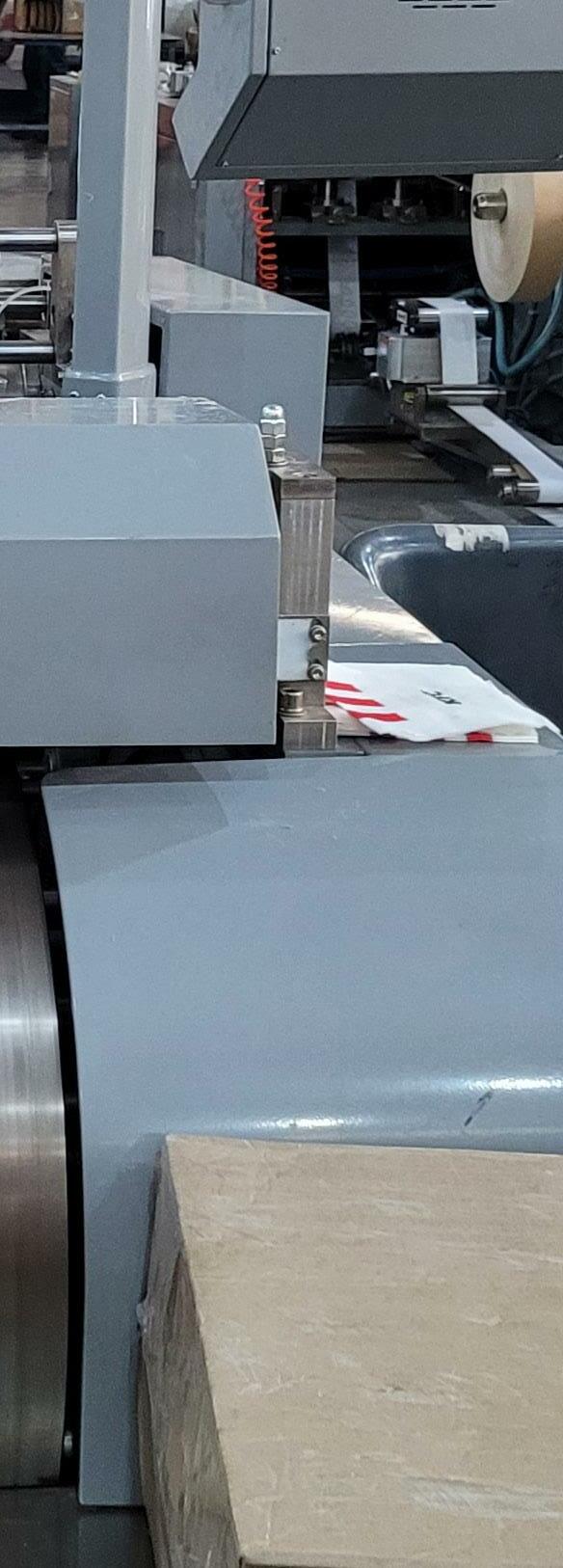
2020’s tough market conditions taught us all to be innovative, dynamic and quick off the mark in order to stay afloat and in-business. This was certainly the case for Sappi who required a new market for an already declining Newsprint paper machine. Lufil Packaging required a local and consistent supplier of unbleached kraft paper for their bag manufacturing plant. And as a result of great partnerships, an exciting new product, PrimePak Unbleached, was launched. It has taken the QSR market by storm, as brands search for environmentally-friendly packaging materials that are strong enough to get food to customers through new home delivery platforms.
In 2020, as the full impact of the Covid pandemic became obvious, there was despair and worry, but also invention. People were locked in their homes, prevented from visiting stores or interacting with each other. This was a troubling time for most businesses, forcing them to adapt or close. An example of quick adaption was observed in the retail and food sectors, where deliveries to the home boomed in South Africa. Around the world, in the US, delivery service Instacart reported achievement of its monetary targets for a 24-month period in just three weeks as restrictions on movement were implemented.
In South Africa, major restaurant chains and supermarkets upped their digital presence during the lockdown periods, partnering with platforms like Uber Eats and Mr D Food to get products to customers as efficiently as possible.
But a problem became apparent. The packaging used in transit was not as good as it could be. The quick increase in volume developed a need for a tough, reliable and sustainable solution.
“Now, the packaging must be more robust than it was previously as it takes more knocks as it travels from restaurant to home. Our QSR customers have asked us for more robust packaging. The easy win was to switch to virgin
kraft paper which offers tensile and burst strength,” says Stephen Weston, Managing Executive at Lufil Packaging, the Johannesburg-head-quartered manufacturer of paper bags and related products, part of the Bidvest Group.
Lufil Packaging engaged with clients to understand the quickly changing needs in the paper bag market before approaching potential suppliers to assist in solving the problem.
At the same time Sappi was facing their own challenges. A rapid decline in market demand for Newsprint had been observed over the last few years, but when COVID-19 hit in early 2020, the
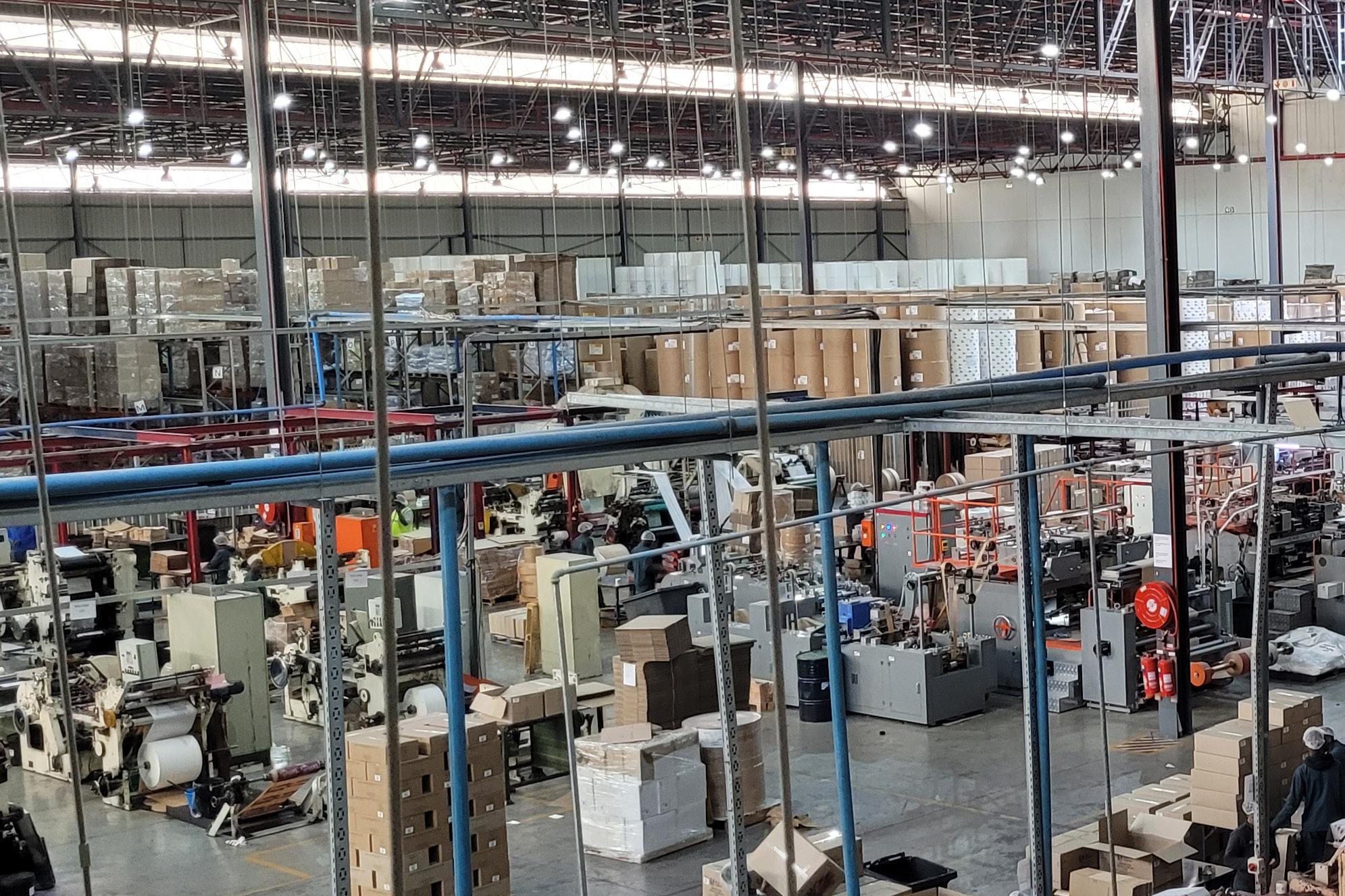
demand fell so critically that something had to change, and fast. The Sappi Southern Africa business had acted with speed to find other markets that could assist in filling the Newsprint machine as well as supplying an alternate market.
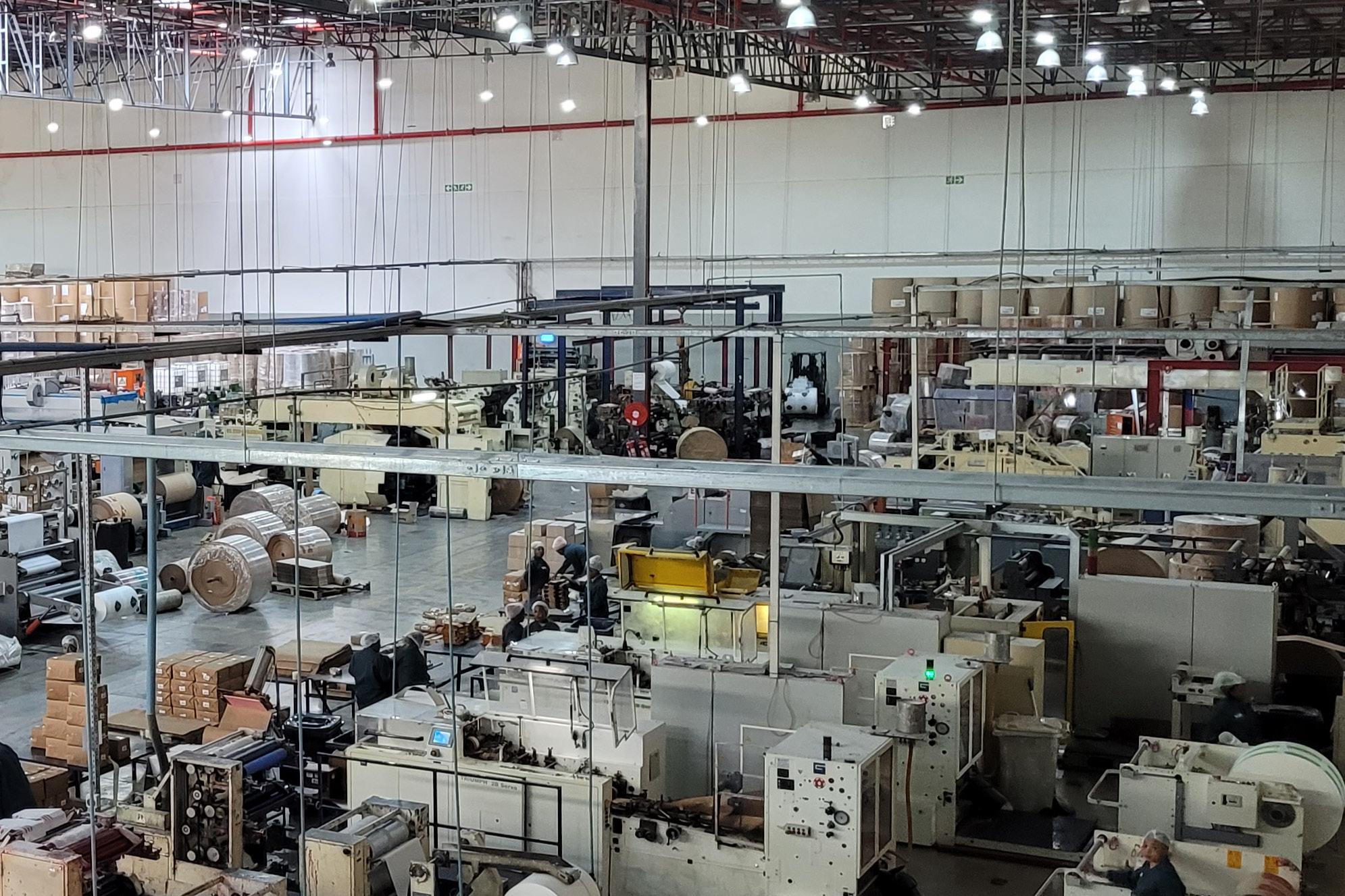
“Our newsprint machine was battling during COVID,” says Product & Development Manager at Sappi, Katherine Wölke. “The newsprint
machine was offline for months, not running, and we were not sure of what the future of that machine looked like. We didn’t want to lose jobs or carousel the machine altogether, so we were tasked with finding a new market to share the machine with. Some market research was required, a lot of discussions with Lufil Packaging and other key customers was had and a new
product, PrimePak Unbleached (PPU), was developed within three months.”
PPU is an uncoated, unbleached kraft paper, designed for various flexible packaging applications, such as secondary fast-food packaging, specialised grocery bags, home and fashion bags, consumer electronics and general point of sale packaging as well as wrapping paper. It is made up of a higher percentage of virgin fibre giving it excellent strength properties. Brilliant printability, higher speeds through the converting machines, less breakages and waste are experienced, are just some of the benefits to using Sappi’s PPU range.
“It has been a major success
// THE PRODUCT WAS DEVELOPED WITHIN THREE MONTHS. IT SAVED JOBS, RUNS ON THE MACHINE AT FULL CAPACITY, SEVEN DAYS A WEEK, AND IT HAS BEEN A FEEL-GOOD STORY //
in terms of machine productivity and customer satisfaction,” says Weston, who has been using the product for major brands including Nando’s and Steers.
“Sappi approached us with a project around making grades of paper which would be a majority virgin as opposed to 100% recycled paper that we had been using previously. We did some trialling, we launched the product with Nando’s
and it was such a success that we have rolled it out to all customers. We use around 400 tonnes each month and it has been very positive,” he adds.
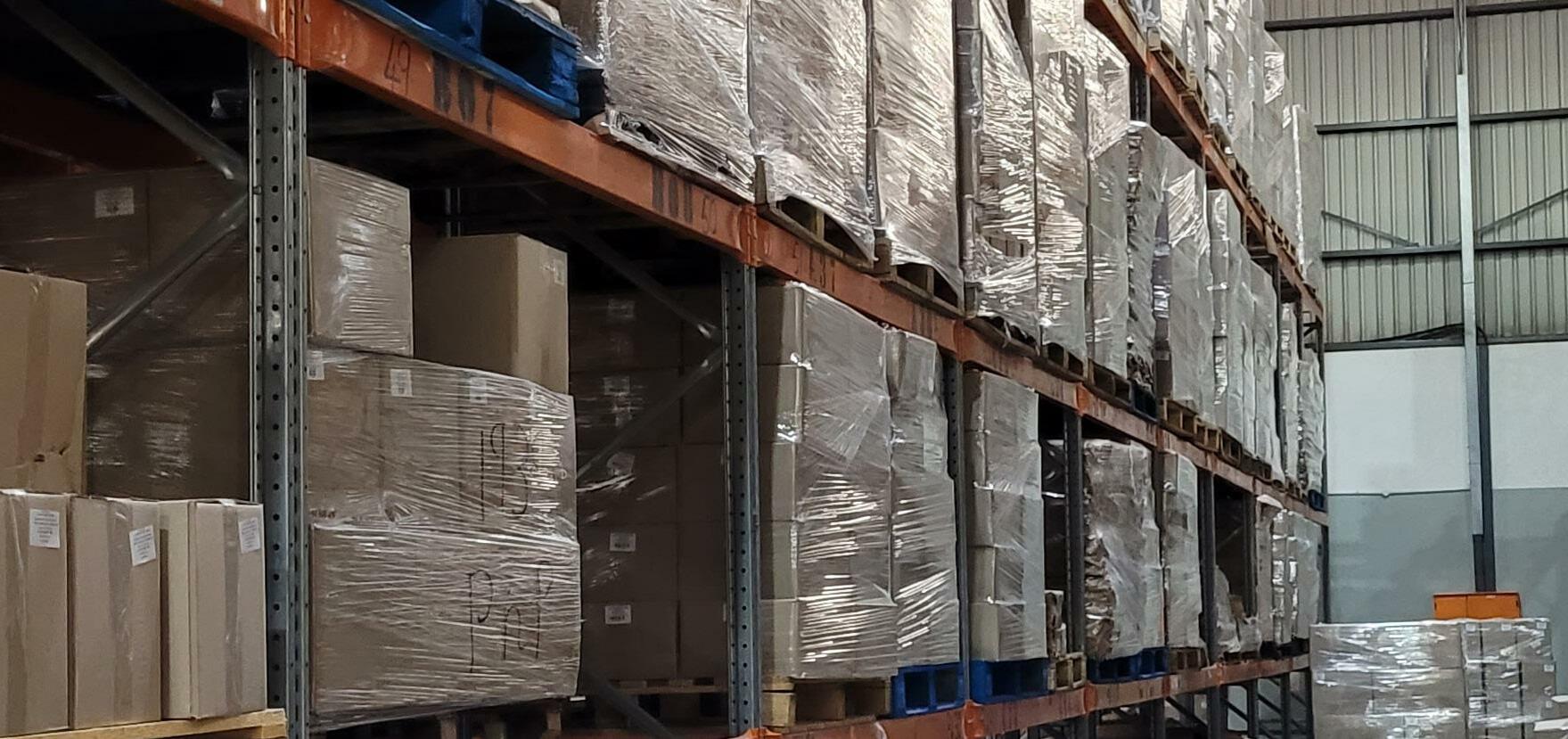
Recycled fibres are short and weak, which is only suitable for some product applications. However, using majority virgin fibres means that the fibres are longer and provide paper with muscle, perfectly suited
to the nature of home delivery.
“PPU is a great product, the strength properties are there,” reiterates Wölke. “It is unique and sets us apart from our competitors. The trend around online deliveries that emerged in 2020 has not stopped growing.”
Because of such aggressively growing demand, both Wölke and Weston are confident that PPU will become central in strategy for endusers. In terms of the lifecycle of paper products, the addition of new fibres is only a benefit to the longer-term circular process and breathes new life into paper bag products requiring strength, longevity and functionality.
“It is important to remember that there is a time and place for both virgin and recycled fibre. All that is
Continues on page 30
// SAPPI APPROACHED US WITH A PROJECT AROUND MAKING GRADES OF PAPER WHICH WOULD BE 100% VIRGIN AS OPPOSED TO RECYCLED PAPER THAT WE HAD BEEN USING PREVIOUSLY //









Sappi has an innovative and sustainable paper bag packaging alternative for the QSR (Quick Service Restaurants) and retail market sectors. PrimePak Unbleached is an uncoated, machine-finished, unbleached kraft paper offering superior strength properties and ensuring less bag breakages. This is due to the majority of virgin fibre used in the production.
Sappi’s PrimePak Unbleached range is recyclable, biodegradable and forms part of the circular economy. With excellent printability, good run rates and conversion speeds, PrimePak Unbleached should be your natural choice!

























Continued from page 28
required is to understand the end-use application and what properties are required to ensure that the product meets the demands of the end-use.
It is also important to remember that without new virgin fibre in the cycle, there would be no fibre to recycle. In other words, we would need virgin fibre to ensure that there is enough recycled fibre in the market. There needs to be a union between virgin and recycled fibres,” says Wölke.
“There always needs to be fresh fibre that needs to be put into the mix to give products some strength,” agrees Weston. “We still bring in a lot of material that is semi or fully recycled but in terms of our lightweights (50, 60 and 80 gsm), it needs that extra strength to run through the equipment effectively.”
Highlighting the success of PPU, Nando’s, Spur, Steers, Wimpy, KFC, and a host of other national and international brands have adopted the product. Lufil Packaging now runs PPU for the majority of its QSR clients.
Importantly, PPU is not only perfectly crafted for its purpose, it also serves as a beacon of what is possible from a sustainability perspective, high on the agenda of both Lufil Packaging, Bidvest and Sappi.
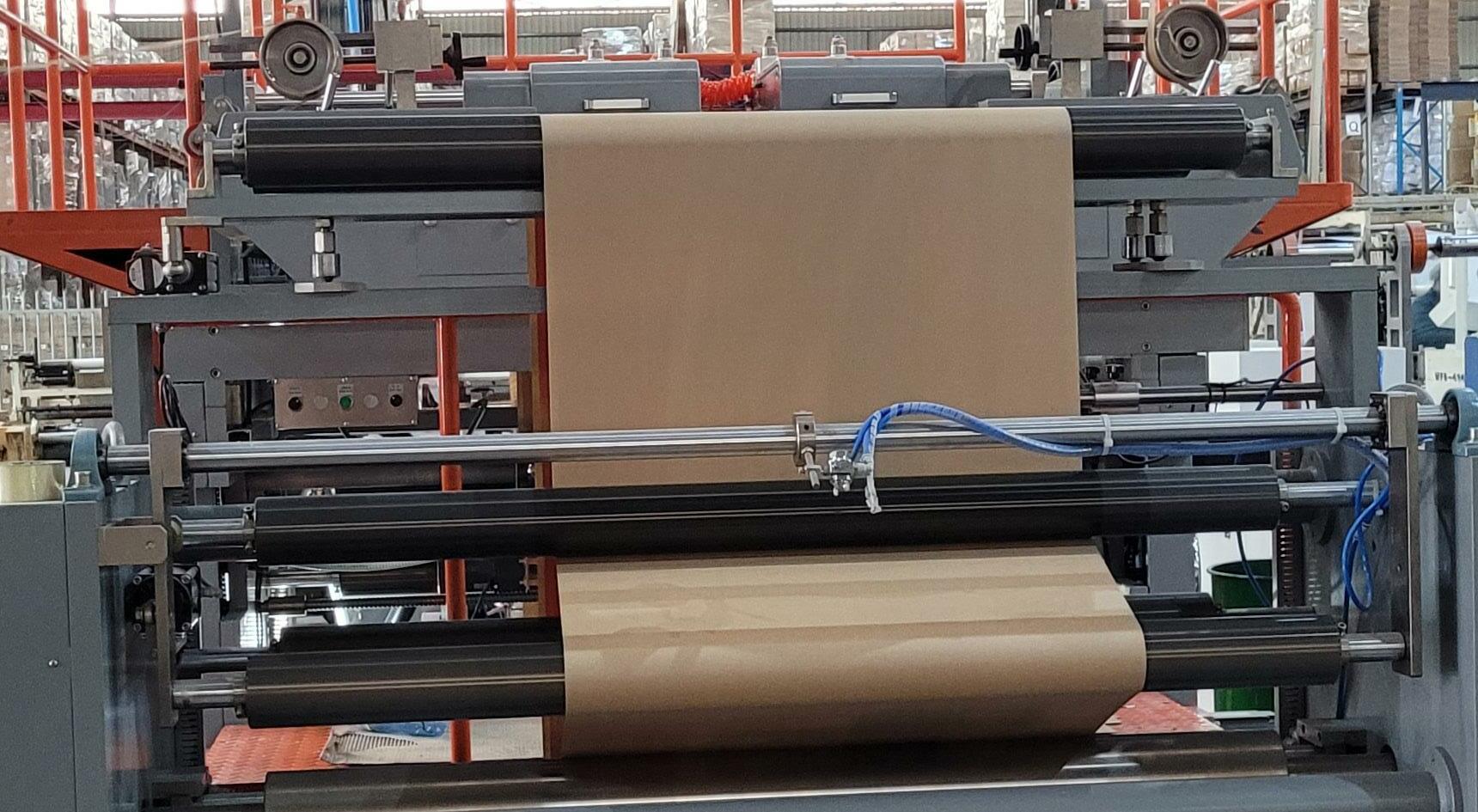
FSC™ CERTIFIED
Sappi takes sustainability and the planet seriously. Sappi have ensured that their food paper packaging products offered to the market tick all the sustainable boxes. PPU is produced locally using locally grown trees. In full adherence to Forestry Stewardship Council (FSC™) requirements, Sappi acts as a champion for sustainable forestry, working to keep forestland forested for generations to come.
“The PPU product range is
Continues on page 32
// THE PPU IS FSC CERTIFIED AND THE FORESTRY SIDE IS TOTALLY GOVERNED BY THE FSC PROCESS, ALL THE WAY FROM NURSERY TO FORESTRY TO PROCESSING TO PAPER //
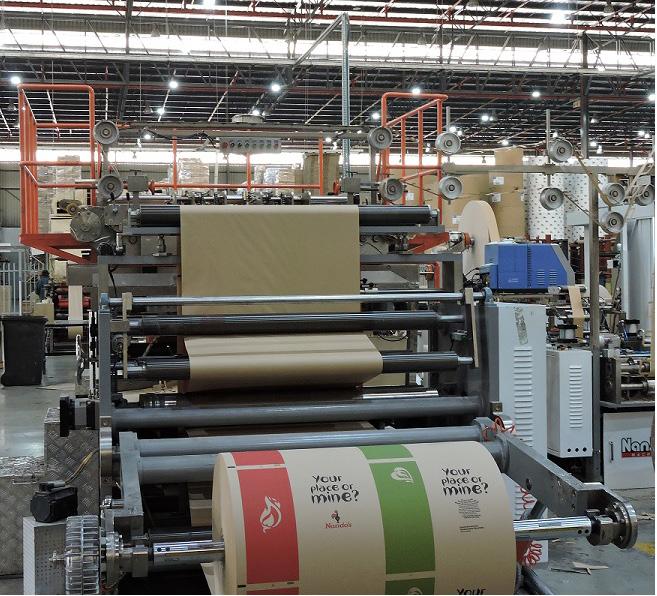

Continued from page 30
FSC™ certified. Sappi follow very strong values and ethics in ensuring conservation,” says Wölke.
Sappi owns and leases 394,000 hectares of land in South Africa. One third of this land is managed for biodiversity conservation. There are approximately 160 Important Conservation Areas (ICAs) and seven declared nature reserves all within Sappi managed land. Sappi have established a biodiversity 2025 target to enhance biodiversity in our conservation areas by 10% per annum.
For Weston and Lufil Packaging, this commitment to sustainability fits perfectly with his message to clients.
“From the moment the tree is planted until it arrives at Lufil’s factory, that chain follows strict processes,” he says, adding that sustainability has moved to the top of the agenda for many brand managers in South Africa.
Sappi’s mill in Ngodwana, Mpumalanga is responsible for all of the production of PPU, located right at the heart of the company’s commercial forestry operation. The mill produces 210,000 tons of unbleached chemical pulp, 110,000 tons of mechanical pulp, 255,000 tons of dissolving pulp and 380,000 tons of paper (newsprint and kraft linerboard used for packaging) per annum.
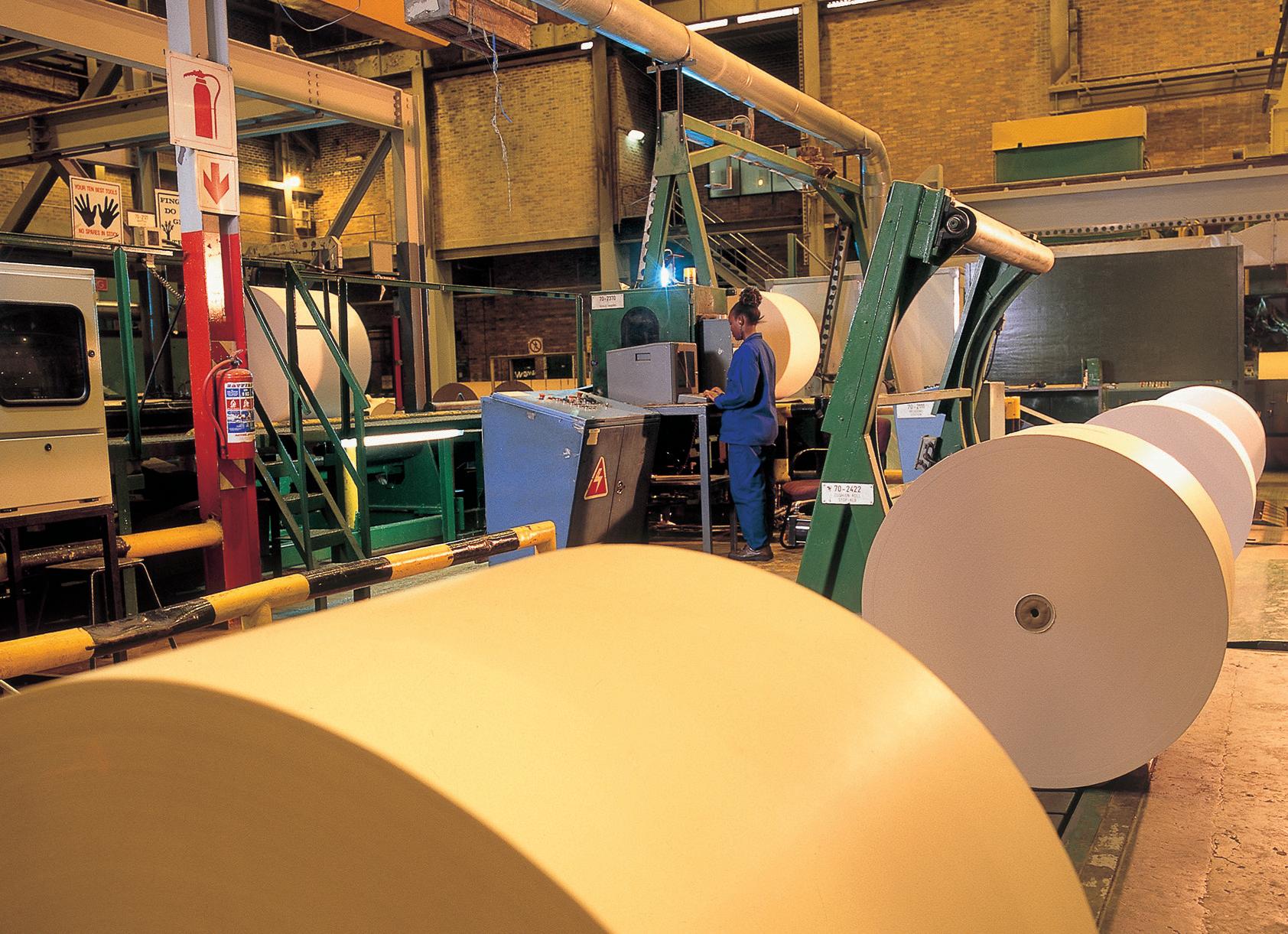
“Sappi has a strong forestry presence in the area, including a lot
of good socio-economic work. All of the pulp that is used for this product is from those forests,” says Weston.
The development of PPU, in such a tight timescale, against a challenging economic backdrop was recognised by Sappi, awarding the PPU project team the Technical Innovations Award (TIA). The TIAs are an internal initiative from Sappi spanning the entire global group and highlighting innovation and success.
Taking all of the positivity achieved so far, there is much more to come from PPU. Both Sappi and Lufil Packaging are expecting ongoing improvement and the companies
are looking forward with ambition.
“There’s always innovation to ensure we are ahead of the curve,” smiles Wölke. “We work closely with Lufil Packaging to understand what opportunities there are in the market. The primary market right now is in QSR and with the grocery retailers,” she says, adding that the company would love to get into wider home delivery space.
“We need to achieve specifications that the industry is looking for and that is our ongoing development.”
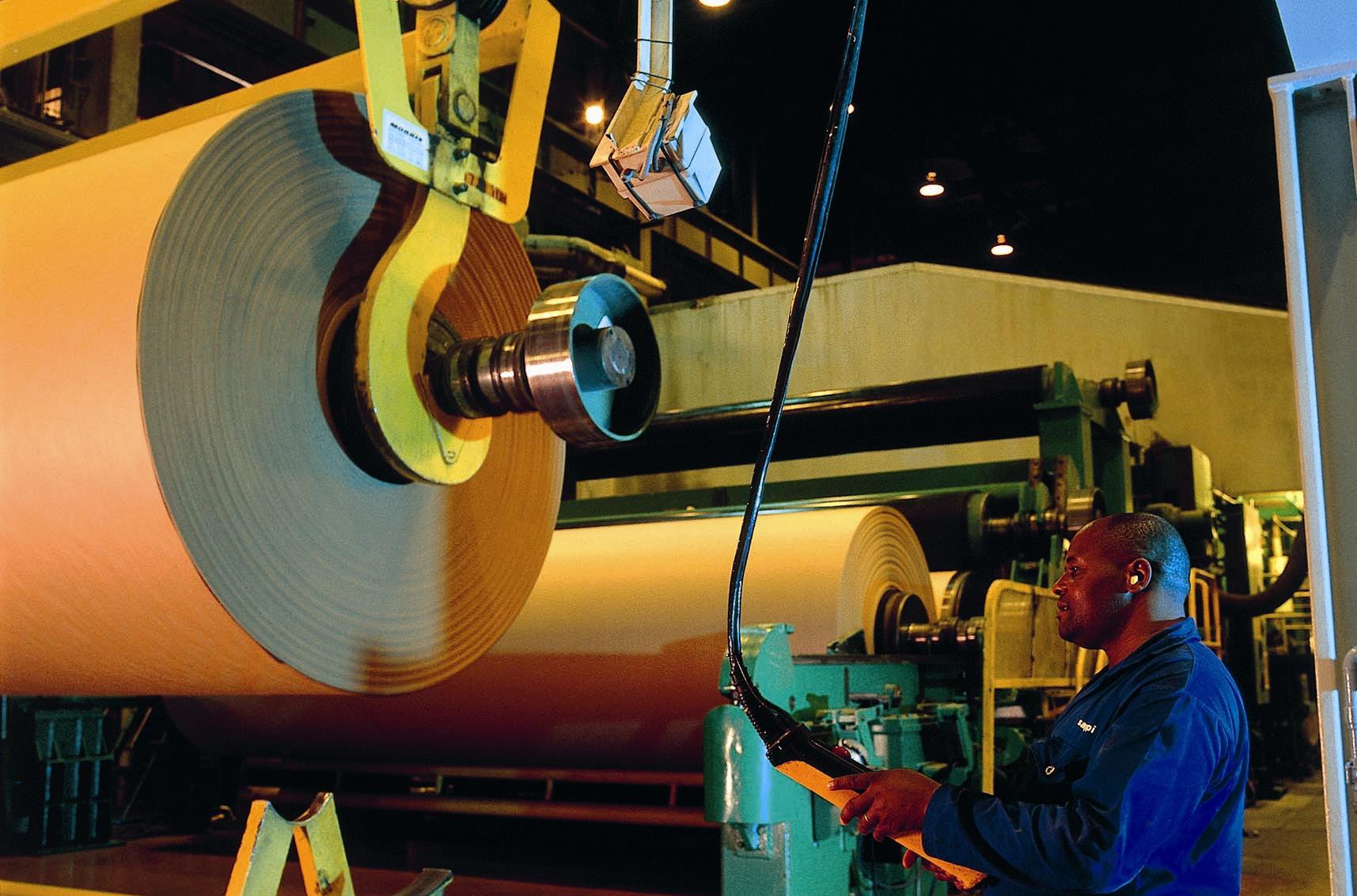
Lufil Packaging and Weston are riding the wave and the company is always looking for opportunities to expand its offering.
“There is huge demand here right now - if you can’t sell a paper bag then there is something wrong with you,” he smiles. “We are still not legislated to use paper bags and plastic bags are used freely. However, people with an ethical approach are swapping to recyclable plastic or paper. There is major demand for paper bags from retail, grocery, textile, fast food and agriculture. We have purchased four new machines and around 20 new people in the past year to cope with demand, especially in the shopper carrier bag sectors.”
Clearly, there is more to come
from this exciting product and positive partnership. With every business trying hard to satisfy price-conscious clients, the ability to offer value alongside high quality is essential. Thankfully, Sappi and Lufil packaging can deliver in abundance.
What was created in a time of shift across industries is now promoting a change agenda of its own. If PPU can become the dominant material in the QSR and grocery sectors in just three years, there is no telling what will come next. Sappi will ensure sustainability is at the core of anything developed and Lufil Packaging will ensure clients and end users are delighted with what is produced.
// THERE IS HUGE DEMAND HERE RIGHT NOW - IF YOU CAN’T SELL A PAPER BAG THEN THERE IS SOMETHING WRONG WITH YOU //
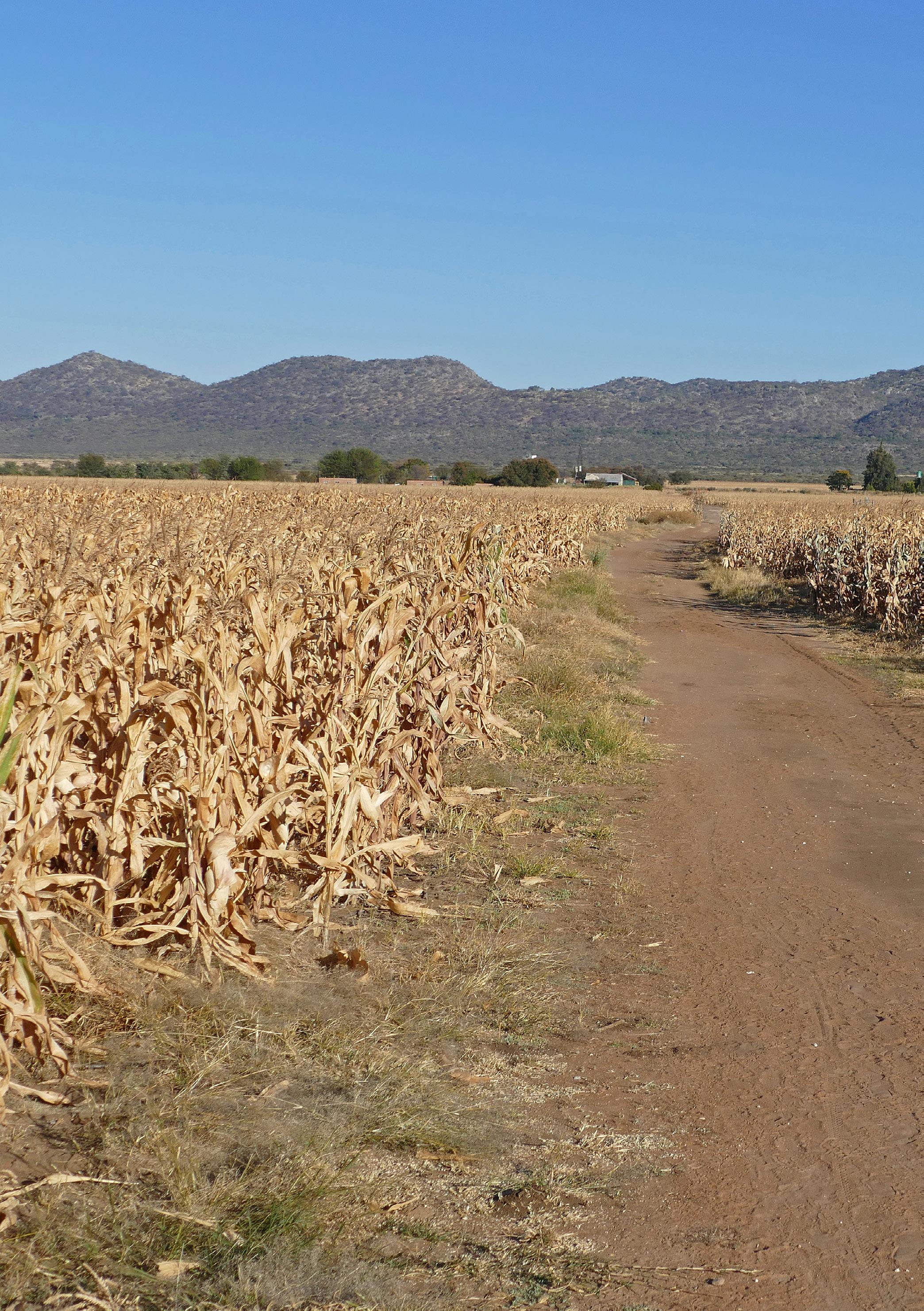
Celebrating its 40th anniversary with new product launches and brand campaigns, Namib Mills – the largest FMCG company in Namibia – is looking forward with ambition as it assigns the pandemic to the history books. “We remain popular and we are doing well,” Brand Manager: Corporate, Selma Moongo tells Enterprise Africa.
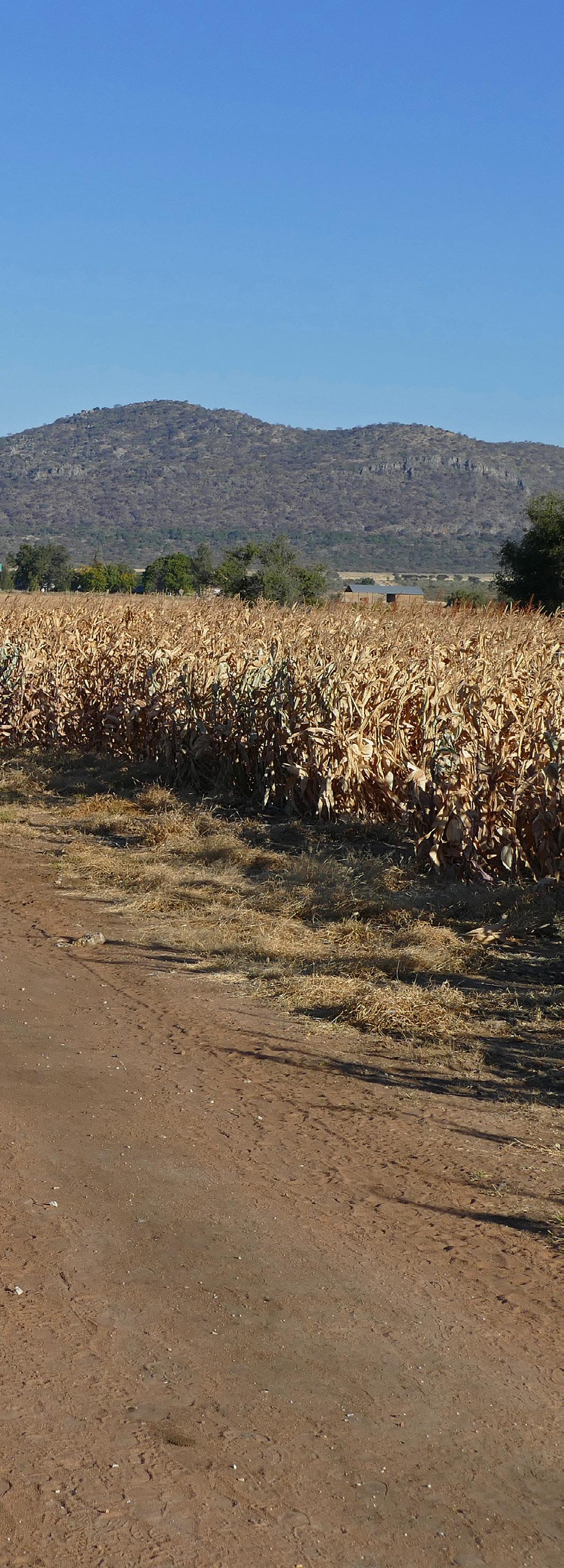
//40 years ago, Windhoek Maize Mill opened its doors, producing 16 tons each month; this marked the birth of Namib Mills. In 1982, before the country achieved independence, just over one million people faced food insecurity and there was a need for growth in the production of staple foods in the region. In 1986, the mill began the production of wheat flour at 12 tons per hour, recognising the need for drastically increased output.
By 1995, the Buhler Wheat Mill was commissioned and the following year, the company acquired the Otavi Mill bringing sugar packing into the portfolio. A string of acquisitions over the next decade saw cross-border expansion and improved capacity as the company continued on a journey
to the top of the industry. The Gordonia Mill in Upington was acquired, a pasta plant was commissioned by Sam Nujoma, the Katima Mulilo Mill was purchased, and the Otavi Mahangu Mill was opened. Then, from 2005, more growth was achieved as product lines were added and new equipment commissioned. By 2020 – the year the latest Bakpro bread factory was inaugurated – the company was the beating heart of the country’s food industry, becoming recognised as the leading FMCG business.
But Covid eclipsed development, and the country – like all others – was forced into a crawl. GDP dipped by almost 8% and economic conditions were challenging. Namib Mills faced a significant challenge.
Thankfully, a considered strategy
and a strong product portfolio helped the company get through. This year, Namib Mills celebrates its 40th anniversary and the company is remembering all that has been achieved while looking forward to cooking up in the future.
Brand Manager: Corporate, Selma Moongo tells Enterprise Africa that while the pandemic did present

// THE MAJORITY OF FEEDBACK HAS BEEN THAT THE QUALITY, ESPECIALLY WITH INSTANT NOODLES, IS AMAZINGSelma Moongo, Brand Manager: Corporate
hurdles, the company has been successful with its recipe in 2022.
“We did not retrench a single person and we saw that, even with price increases, there are many who are loyal to the brand, who grew up with the brand, who wanted to stick it out,” she says. “Eventually, it became more about what people could afford and, with a significantly high unemployment rate in Namibia, we totally understood that. That pushed us to submit some budgets to suit a new financial environment. Last year, we had to remove the year-end bonus scheme but it was either that or face potential retrenchments – it wasn’t pleasant. This was a business decision for us to remain sustainable and avoid letting go of staff. It allowed us to pull through and we did secure all jobs in the long-term.”
While difficult, the choices made at the time achieved the goal of longer-term continuity. Since then, new products have been launched and new positivity has been mixed into the business.
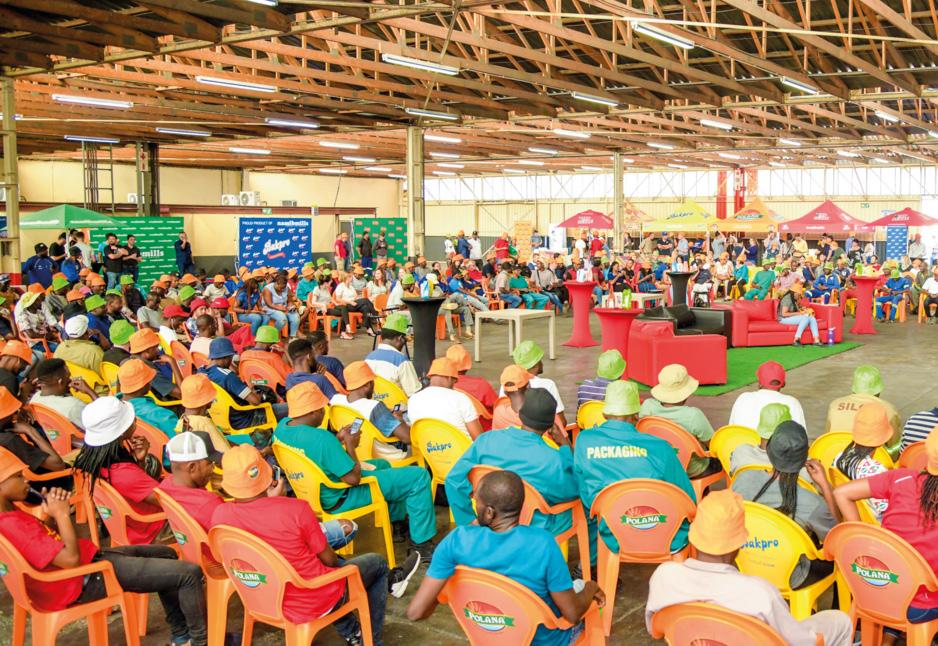
In April, the Pasta King brand launched its 500g fusilli bags, adding to a strong range already available across the nation. In September, Namib Mills brand Pasta Polana launched a new instant noodle product, and there was also an addition to the Top Score instant maize porridge range with chocolate flavour joining tastes of vanilla, banana, strawberry, and more on the shelves.
“We start with the ground level research around texture and flavour and we try to understand more about
what customers expect in terms of quality, preparation, and potency of flavour,” says Moongo. “We conduct that primary research externally before involving internal people to get expert opinion. We then meet to create a direction before testing the product and providing it for samples. We then create artwork and look at a date for official launch. We like to start in the sales department as they need to push the product in the market. The second launch is with the media who can carry the product further than we can through advertising. We then deliver a nationwide announcement through various national campaigns and regional campaigns,” she says, adding that a penetration pricing model is followed post launch to generate interest quickly. For the porridge – naturally high
overall been hailed by consumers.
in energy, made of 99% natural ingredients, fortified with vitamins and minerals, a strong source of protein, low in fat – there has been a welcome response to the new flavour. With instant noodles – ready to eat in minutes, a first for Namibia – the flavours are under review but have

“It has been taxing for the team on the ground, but the products have been received very well. The majority of feedback has been that the quality, especially with instant noodles, is amazing. The market wants the flavour to come with more of a kick, so we will adjust, but people are happy with the quality and that is something we always guarantee,” states Moongo.
The instant noodle product has already become one of the most popular in the Namib Mills portfolio, and encouraging retailers to stock the product is essential.
“It is an entirely new product and we are not surprised that is has gone down so well,” details Moongo. “We have
very strong relationships with retailers and that is something that has to be constantly maintained. Although we are the largest FMCG company in the country, we do have competitors. If we become complacent, we could easily lose our position and market share. Our partnerships with the retailers are beautiful but we do have to constantly oil the engine. That is why we invest in product research and development.”
Namib Mills has strong Namibian heritage, but its excellence has crossed borders and timelines, with the company exporting products far and wide. While Namibia remains the core market, Moongo is happy to report that international opportunities continue to be explored.
// WE EXPORT TO SOUTH AFRICA, AND WE ALSO HAVE OFFICES IN AUSTRALIA AND ZAMBIA

“Manufacturing happens in Namibia but we do import some raw materials. Namibia doesn’t have the correct climate for wheat growth. We source the maize supply locally and we import other raw materials, and this helps us ensure quality. Right now, the instant noodles are manufactured elsewhere as we are wating on delivery of new machines but we sell locally and regionally.
“We export to South Africa, and we also have offices in Australia and Zambia. We have a commercial

department with a new business division that scouts for clients in Europe and further afield,” she says.
This ambition is part of a wider desire that has helped the company to grow to where it is today. It has certainly been four decades of hard work, but as the company looked back over its history, there was nothing but celebration.

“We definitely celebrated,” smiles Moongo. “Apart from the company
turning 40, one of our brands, Top Score, also turned 40 as the first brand in the business. Top Score gave away N$14,000 every month for 12 weeks, and then N$4000 every week for 13 weeks. There was also a grand prize – a Toyota Land Cruiser.” Consumers simply needed to buy a 5kg or 10kg Top Score bag, or send a SMS to win the car.
“Corporate celebrated with stakeholders that have been part of the journey and we celebrated as a business, downing tools for the day, inviting everyone in the business to a gathering to see live musical performances with food and prize giveaways,” she adds.
The company was understandably proud of its anniversary, especially achieving so much through many economic ups and downs, both
// IF YOU LOOK AT HOW MANY COMPANIES DO NOT EVEN ACHIEVE FIVE YEARS, TO BE ABLE TO MAKE IT TO 40 YEARS IS A BIG DEAL //

locally and internationally.
“If you look at how many companies do not even achieve five years, to be able to make it to 40 years is a big deal – especially considering Covid and recession was a part of that,” admits Moongo. “We have had to put in price increases and battle for brand loyalty - it wasn’t easy and the fact that we made it to 40 is certainly something to brag about.”
In September, the celebration at the Bavaria site in Windhoek allowed colleagues to come together, smile, and reminisce about many success stories. This included recognition of the company’s Gold awards at the Africa’s Best Brand Awards event, where the company claimed top prizes in the categories Most Admired Namibian Brand – Consumer Non-Cyclical, and Most Admired Consumer Non-Cyclical Brand.
Looking forward, after years of successful acquisition and growth, more new products are in the pipeline and the company remains hungry for opportunity. But, according to Moongo, Namib Mills will likely wait until there is renewed stability in market conditions before completing major transactions.
“It remains in the pipeline considering we are looking to expand our product basket. We will require new facilities and storage capacity. It will happen, but unlikely in the next three to five years.
“Some of the new products we are looking into are still in the very early stages of development, but we are very excited,” she shares.
Since day one, Namib Mills has been conscious of the role large business plays in the wider community of
Namibia, and it has developed a Corporate Social Responsibility programme that addresses issues across three main pillars.
“Our pillars are education, childhood development, vulnerable, and other on an ad hoc basis,” says Moongo, explaining that budgets are split annually, monthly, and impromptu.
“Annually, our CSR is focussed on education. We sponsor one entity for them to be able to stream academic lessons in remote areas so that children there get the same quality of education that those in urban areas get.
“Monthly campaigns surround nutritional value and we give away food products to feed more that 80,000 people. We distribute to an organisation who send products out to less-privileged entities,” she adds.
This endeavour speaks to the vision of Namib Mills: ‘Feeding the Nation’.
Without contributions like this, one of the company’s key values of Social Responsibility could never be aligned.
Alongside the annual and monthly campaigns, the company is also heavily involved in the development of micro businesses, helping to promote brand-Nambi Mills while providing opportunities.
“We are focused on SME informal market development,” details Moongo. “We have a scheme around imparting skills for women in the workplace and we include business and financial management skills. We do include the entire informal market as these are the backbone of our communities,” confirming men can also participate.
“We identified aspiring business owners in the informal sector and we train them how to prepare different foods with our products, how to manage their finances, and how to run a small business. We brand their establishment and provide all the necessary tools to start up successfully. When they show keen interest to run a business and serve the community, they will receive a lot of support from Namib Mills,” she says, adding that some of these small businesses now employ other people.
“Some are so popular that they are trending on social media for their quality. It is beautiful to see that people are not dependent on donations
We are a well-established manufacturer of industrial bags for the grain milling industries, as well as the sugar, salt and animal feed industries in South Africa. We also produce coin bags for the commercial banking sector.

and they can sustain themselves.”
This type of activity drives reputation for Namib Mills and while a big business – employing around 2700 people – the company is capable


of making decisions quickly, acting in a nimble fashion to react to demand in the market. This, says Moongo, will be its strength going forward.
“We are in a good position. We remain popular and we are doing well. The industry is unpredictable and things change quickly. We are happy to adjust as the situation forces us to.”
Even after 40 years, Namib Mills remains ambitious, baking pride into everything it does. Expect more from this Namibian powerhouse.


PRODUCTION: Eleanor Sarbutt-King
Leading footwear manufacturer Bata South Africa, emboldened by new opportunities and robust partnerships post-pandemic, is confident in taking its next mighty step forward. Country Manager Michael Wyatt talks to Enterprise Africa about the shoe company’s exciting new five-year strategic plan that will lay the foundation for its expansion and growth into the African market.
//Just a few months ago, leading South African footwear manufacturer, Bata South Africa –well-known for creating much-loved products for consumers around Africa as part of the international Bata Group – was consolidating and searching for opportunities post-pandemic.
With consumers and markets impacted both positively and negatively by the pandemic, some prospects had been lost, but –importantly – new opportunities were ripe for the taking.
Michael Wyatt, Bata South Africa Country Manager, tells Enterprise Africa that a new, bold, global Bata strategy has subsequently kicked off, which will see the footwear giant stepping forward with its sights set on significant growth in trusted markets alongside expansion in new sectors.
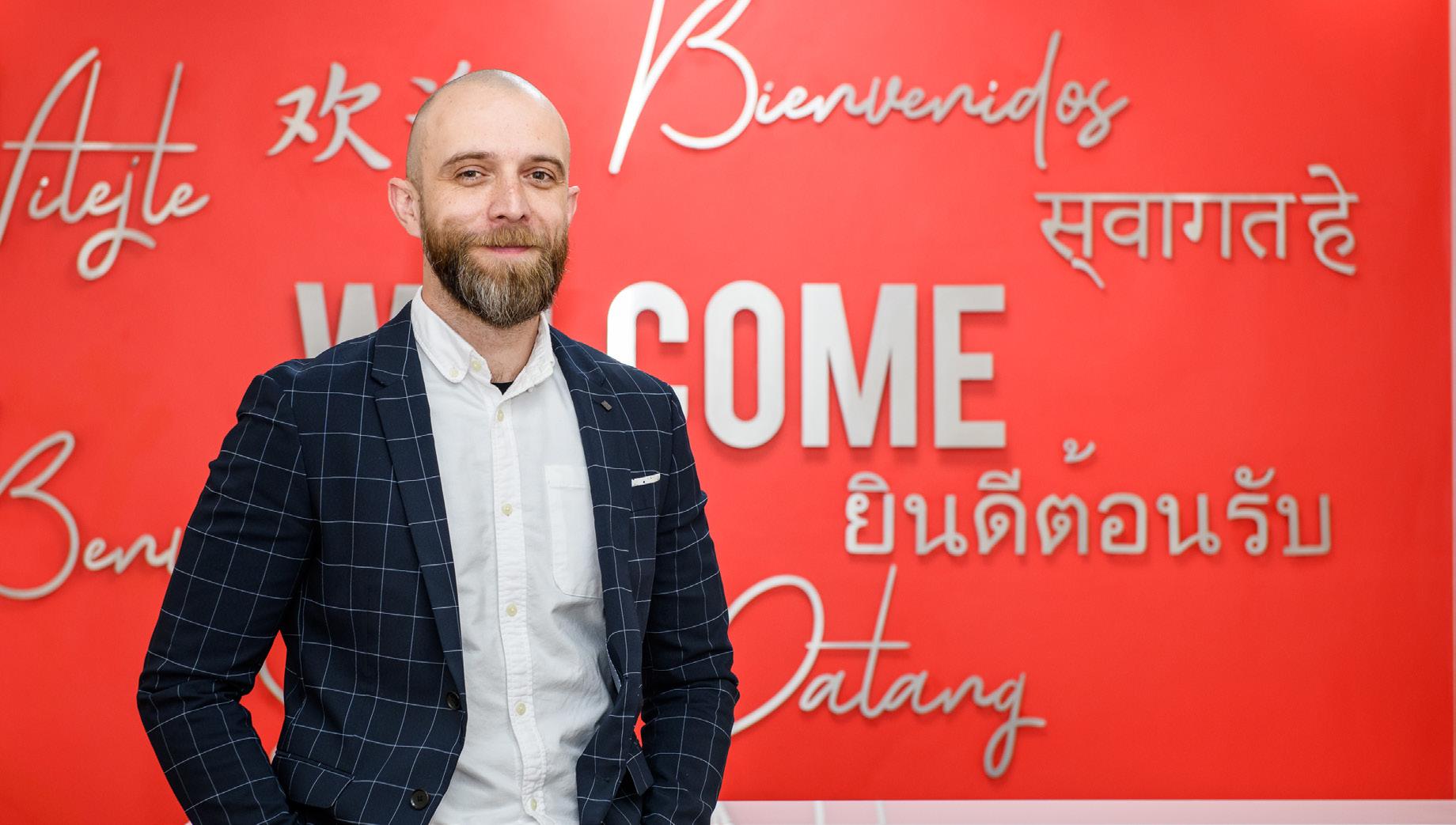
“Our Covid-19 strategy was deliberately modest. By focusing on our core South African business of
school shoes and industrial footwear while markets were tight during international lockdowns, we were able to deliver on our budget through the pandemic, overperforming against what we had set out to do despite a record number of challenges globally. This meant an easier transition post-lockdown with an appetite for growth going forward,” he says.
“We are now well underway in
executing the first steps of our next five-year journey, and plugging into our overall global Bata strategy, through which we are looking to expand the business aggressively in South Africa and the Africa region.”
South Africa, backed by Bata’s global retail, franchise and e-commerce channels holds an

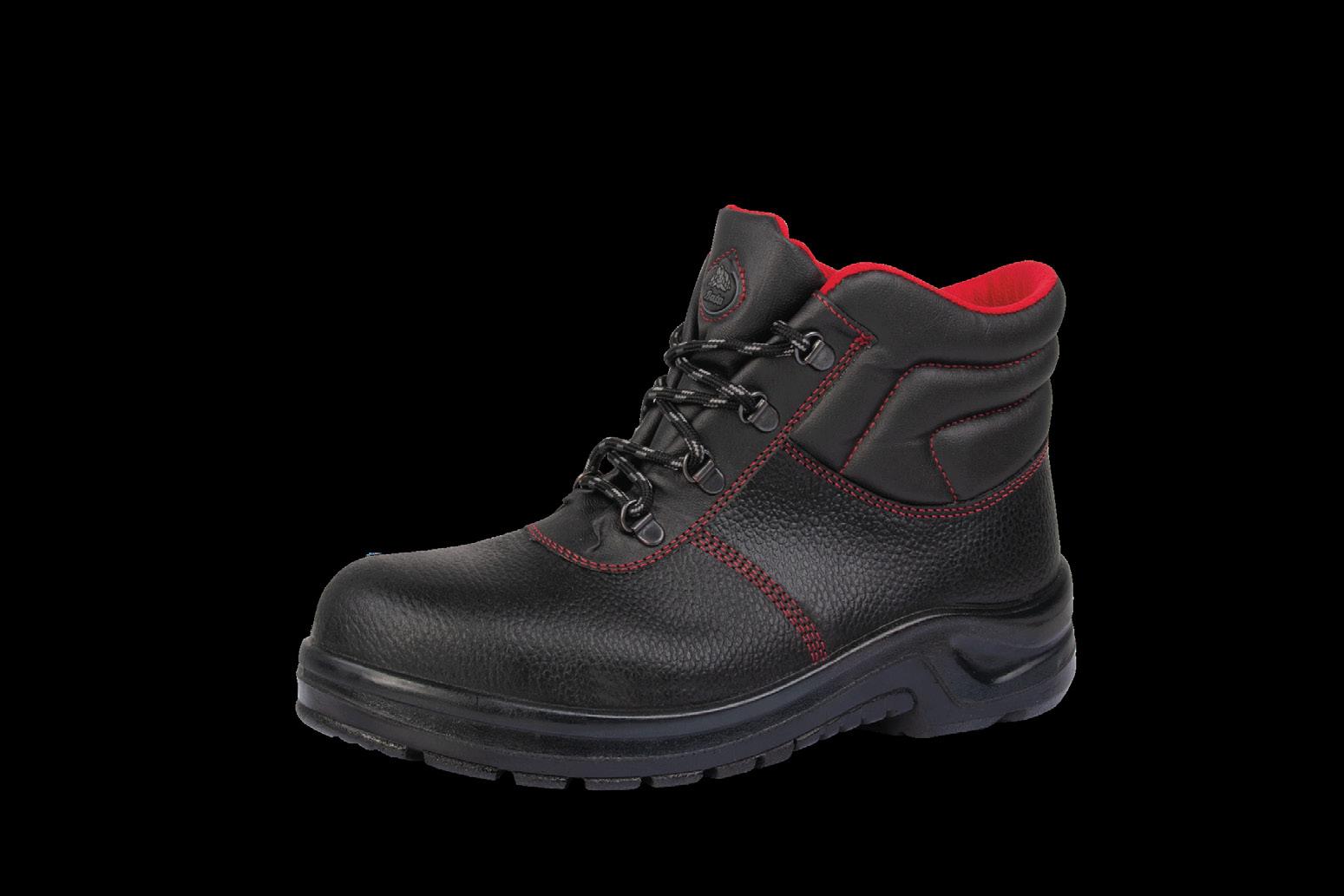
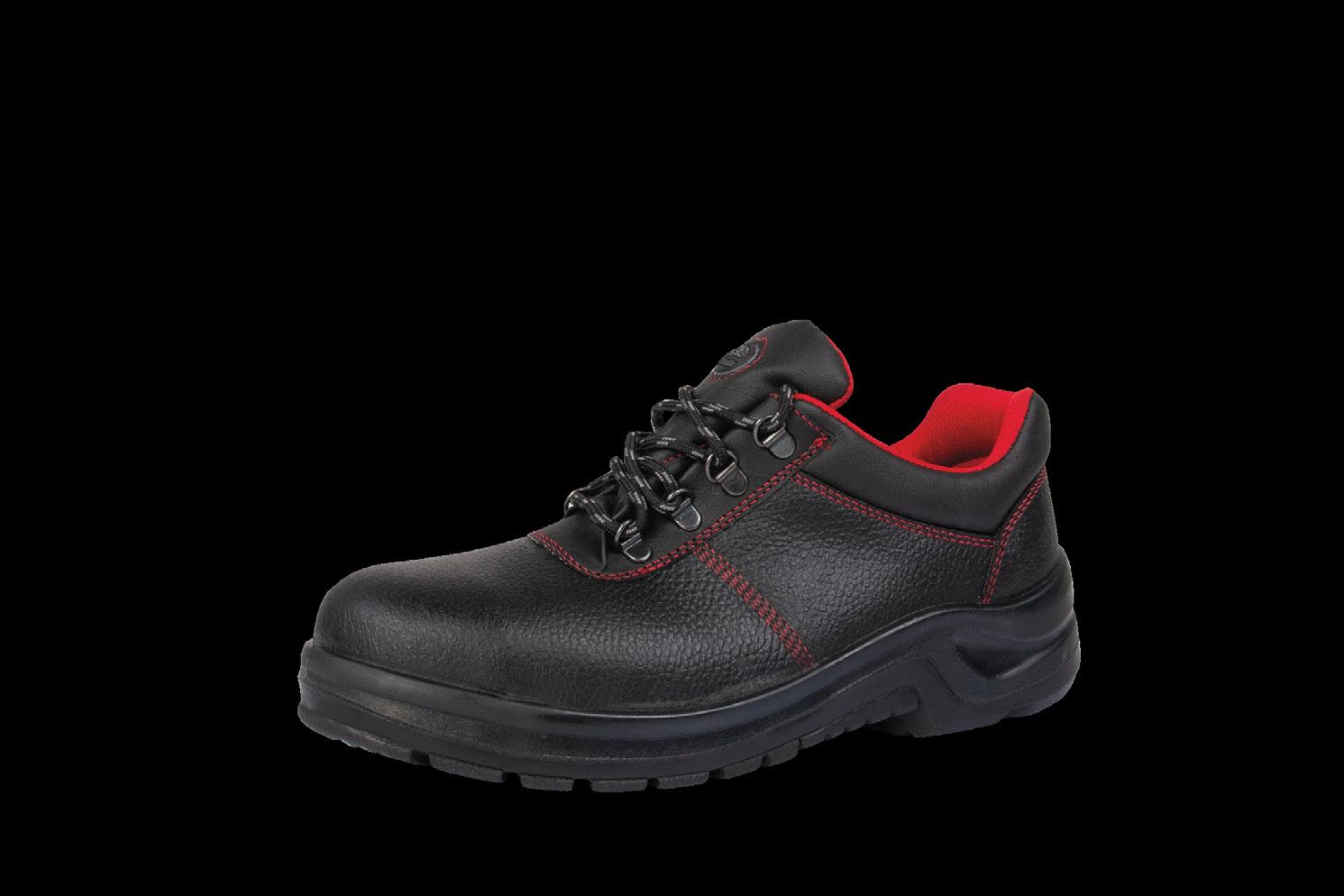

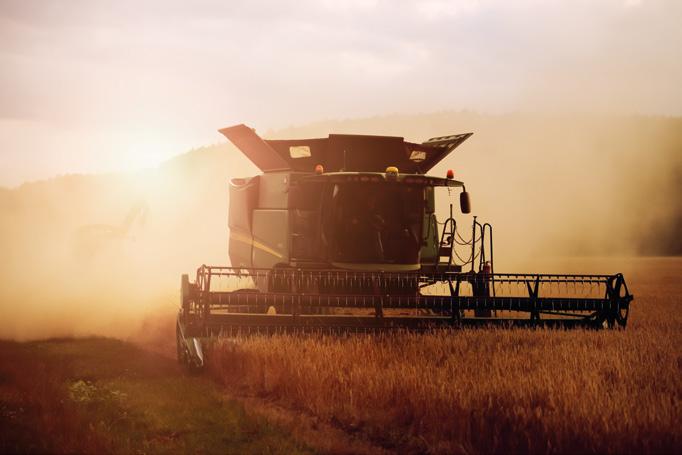

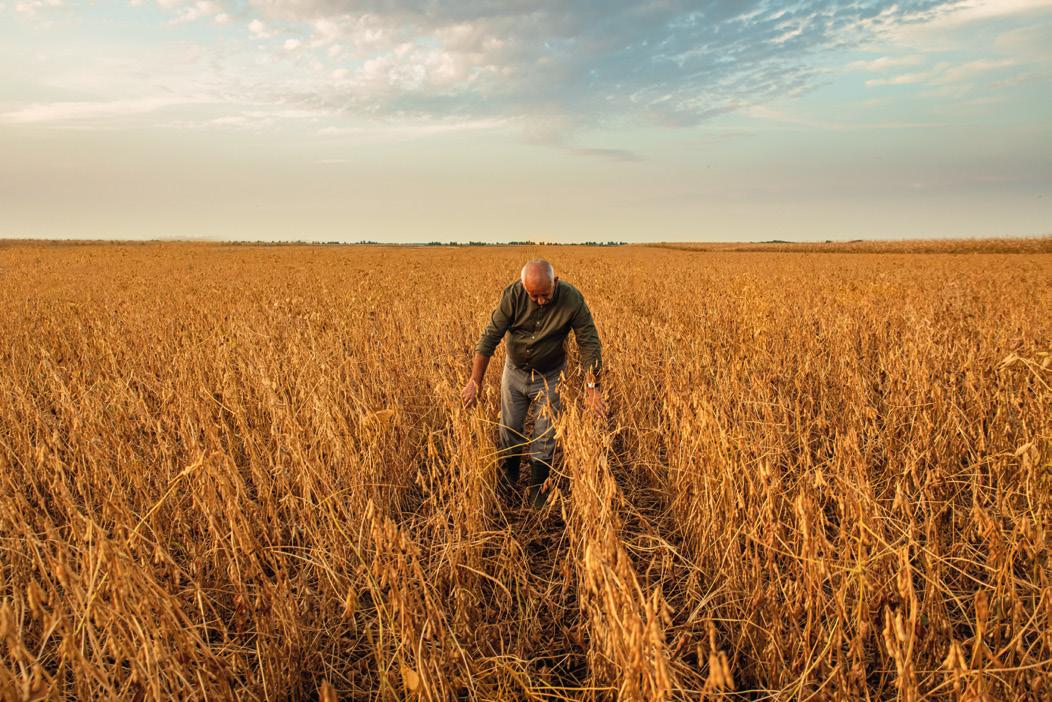

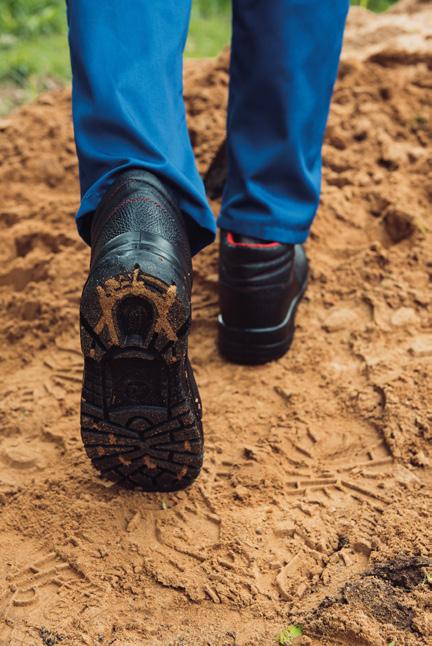


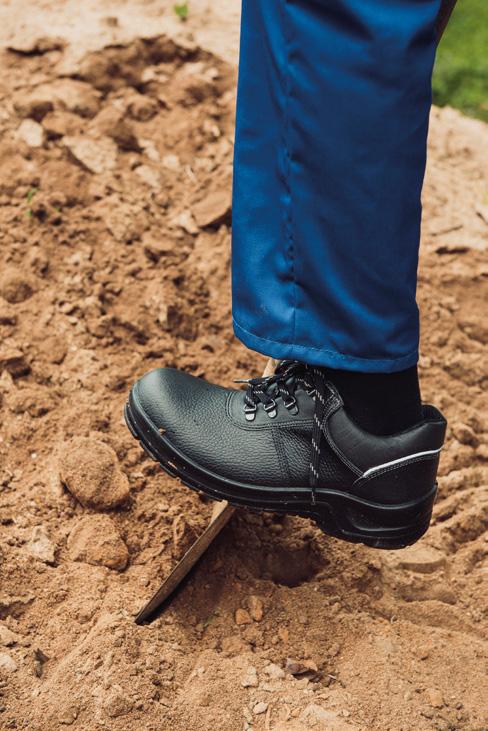

Continued from page 44
impressive portfolio and wide assortment of international brands. The local South African company will be broadening its business beyond the school and industrial categories for which it is so well-known. Its focus will now be on introducing select international sneaker, comfort and outdoor and categories to the local market, and leveraging key collaborations with national retailers.
Globally, Bata is a major footwear and fashion organisation, with a history dating back to 1894 when siblings Tomas, Anna and Anthony
Baťa created the Bata company in the Moravian town of Zlín, AustriaHungary (modern day Czech Republic). Today, the group sells 150 million pairs of shoes each year, has a retail network of over 5,300 stores, spanning more than 70 countries, employing 32,000 people around the world, owning 21 manufacturing sites, and boasting more than 128 years of footwear and retail experience.
Established in South Africa in 1947, Bata is a household name with a reputation for affordable, reliable footwear. It is the custodian of a number of the country’s favourite footwear brands, including the most popular school shoe brand - Toughees, the iconic South African TOMY Takkies

brand, as well as a range of robust Bata Industrial safety footwear.
With a powerful manufacturing facility in KwaZulu-Natal, it employs roughly 500 people, mostly women, and sustains the local community with its production of over five million shoes a year.
Anchored by this solid footing, Bata South Africa has strong ambitions for growth.
Wyatt says Bata will look to climb into new categories, harnessing the strength of its existing lines to introduce retail partners to new and trendy lines from the global Bata portfolio.
“We are bringing a number of our global brands to the South African

market, as can be seen with the recent return of one of Bata’s most iconic lines, North Star, which was originally launched in the 1940s in Canada and made its way across the world in the 80s, including South Africa,” he says. North Star is newly available on the virtual shelves of Africa’s biggest online fashion retailer, Zando.
Other global contenders lined up for expansion within the local market include the children’s favourite, Bubblegummers, athletic lifestyle brand, Power, and the innovative Bata Comfit range.



Key collaborations with major retailers are a big focus for Bata South Africa, which closed its own branded South African retail stores several years ago. Bata’s brands are currently sold through its own digital platforms, such as Toughees.co.za, as well as via retailers such as PEP Stores, Ackermans, Mr Price, Edgards, Zando, and Superbalist.
“We are currently working on new key strategic partnerships with retailers in South Africa and Africa,” confirms Wyatt. “New retail collaborations are at an advanced stage,” he says.

“We are partnering with South Africa’s leading retail chains to win shelf space for Bata’s leading portfolio of brands. Think brands such as North Star, Power, Bubblegummers, Weinbrenner, Comfit, Toughees, and Bata Industrials. While doing this, won’t lose focus on our core business and we are still very much focused on our core role as a local manufacturer and distributor,” explains Wyatt.
New brands mean a whole new level of support required to deliver for retail customers. Ordering, processing, logistics, marketing and more will
// WE ARE WORKING ON KEY STRATEGIC PARTNERSHIPS WITH RETAILERS IN SOUTH AFRICA AND AFRICA – THAT IS THE BIG PLAN //
all be boosted by investment into new systems, reducing the need for outsourcing and retaining strict control over quality.
“Post-Covid, there is a lot more emphasis and willingness to start reinvesting in people, systems and the back end of the business. We are launching a new enterprise resource planning system in Africa warehouse management system, as well as a direct-to-consumer e-Commerce platform,” says Wyatt.
“South Africa is now also the regional hub for Bata in Africa terms of IT. It is all about setting the business up for the next five years,” he furthers, adding that a new structure has been formed within the business including new leaders in sales and marketing, fresh designers in the footwear team, and a new head of sneakers to focus purely on athletic products from Bata.
Coming out of a challenging two years, there are many hurdles
that linger for businesses searching for growth. The economy is still slow, investor confidence is weak, and consumers are battling against inflationary pressure and increasing interest rates. Globally, political landscapes are changing, and logistics and supply chains remain challenged.
But Bata South Africa was quick to put in place strict protocols to protect the business from external issues, and this focus has remained. Controlling everything within its remit, the company continues as a beacon of quality manufacturing in the country, and endlessly displays ethical and sustainable business management.

“The environment is now much more conducive for us to seize opportunities, having thus far survived difficulties including the pandemic and its global logistics challenges, rising inflation, the war in Europe, the South African riots in July 2021, the provincial KwaZulu-Natal floods and a year of
record loadshedding in 2022, coupled with a number of remaining economic challenges to overcome,” states Wyatt.
“Retailers themselves have changed their outlook and are looking for points of differentiation and growth opportunities. As a global retailer, we can offer our customers in Africa products, brands, and learnings from the rest of the world that they wouldn’t necessarily get from elsewhere or from other local brands. These partnerships will be key for us going forward and will be mutually beneficial, as we are not interested in only wholesaling a brand; we really want to partner with retailers and offer them something different and exclusive while in return helping to ensure mutual business growth.”
The country’s big retailers have boomed in the past 12 months, with reports suggesting that the
NALIDI KNITTING cc trading as
This 35-year-old company, opened by Nalidi Knitting cc (in Durban, RSA), has been proudly supplying and supporting Southern Africa’s leading and best GUMBOOT manufacturers for over thirty years.
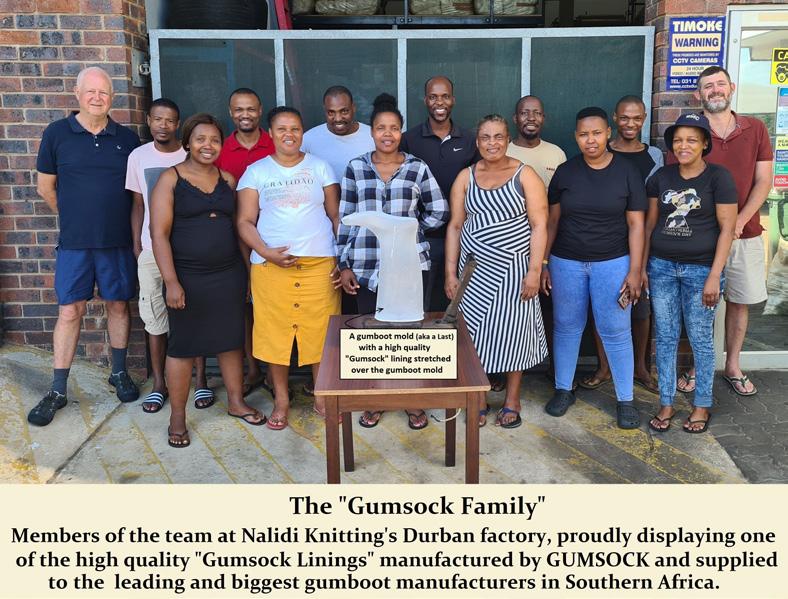
GUMSOCK, started in 1987 by CEO Chris Thomson, are the trusted supplier of high quality “gumboot linings” to Southern Africa’s leading and biggest GUMBOOT manufacturers. The close-knit team at GUMSOCK developed by Chris and his two sons Josh and Luke embrace “family values”, a formula that’s helped every staff member grow and develop in this caring company. GUMSOCK’s production manager, Sandile, developed from a trainee machine operator 12 years ago, to his current position. Like Sandile, all the staff, are nurtured and coached to value and appreciate the importance of maintaining high standards, built on reliable and ethical value systems.
The GUMSOCK TEAM embrace, having a positive attitude, and understand the consequences of their hard work at GUMSOCK, help deliver the best quality linings, and also contribute to building and maintaining solid relationships with their customers.
GUMSOCK’s
top brands in the country grew by more than 20% collectively, opening new stores and building new digital capabilities to the delight of customers. If Bata can strike significant and sustainable partnerships with South Africa’s retailers – especially those active on the continent –increased market share should quickly become more attainable.
“The South African manufactured product is a huge part of it, but this strategy will also take into account
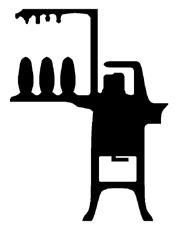
more of an import arm as well, for certain brands where it makes more sense to rely on the technologies that other countries have already mastered. We will continue to offer a high percentage of our total output from local manufacturing, even while bringing other brands in from Bata internationally,” Wyatt says.
As this strong and busy company prepares for an exciting period of long-term growth, it is now clear that all steps are moving
THEY
forward, and the road ahead is full of opportunity. A new strategy, a new structure, new technologies, and new partnerships will all result in further joy for customers around South Africa, and all over the continent.
“The last two years have been cautious and focused on our core business, but we are now looking at an expansion model, with more risk, where we will invest in the brands, back end, staff, and lay the foundations for stepping forward through to 2027,” concludes Wyatt.
GUMSOCK – THE “GUMBOOT LININGS” MANUFACTURER TRIED, TESTED AND TRUSTED BY THE BEST GUMBOOT MANUFACTURERS
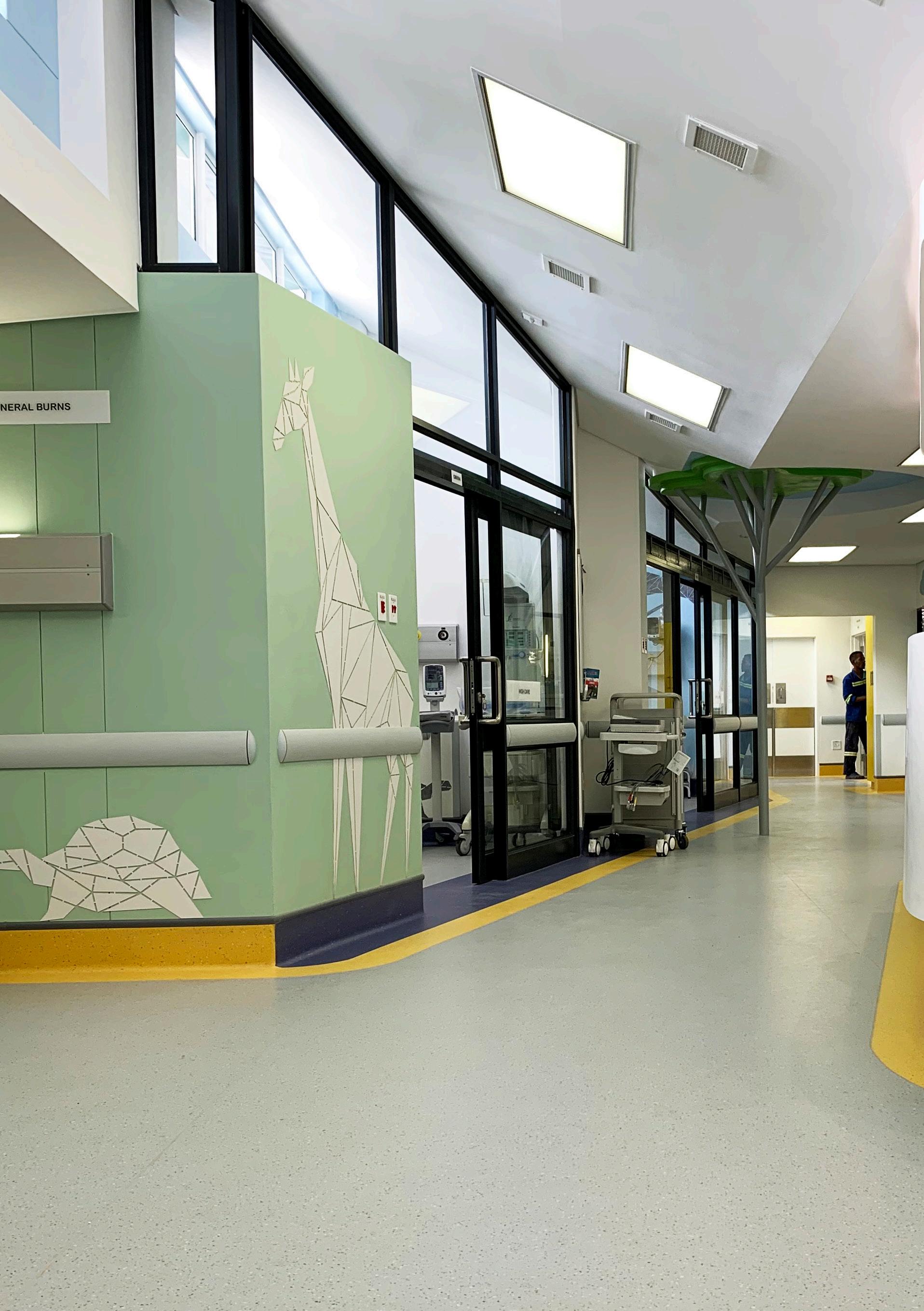
PRODUCTION: Eleanor Sarbutt-King
SAKHIWO Health Solutions continues to provide solid structure for sub-Saharan Africa’s healthcare industry, delivering important project management and development skills where they are desperately needed. CEO Dr Tebogo Mphake talks to Enterprise Africa about his desire for new partnerships to keep the company at the cutting edge.
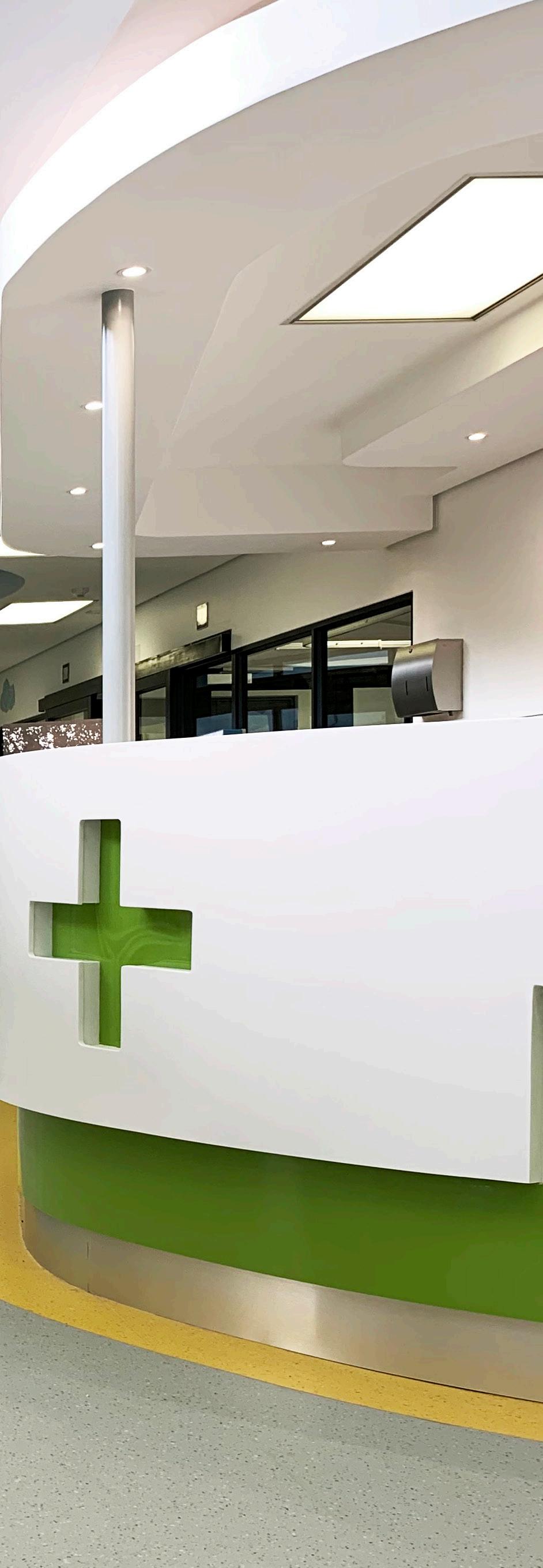
“We are looking for clients – government departments –who see value in a company that creates healing spaces but also can look at alternative funding models,” says Dr Tebogo Mphake, CEO at SAKHIWO Health Solutions.
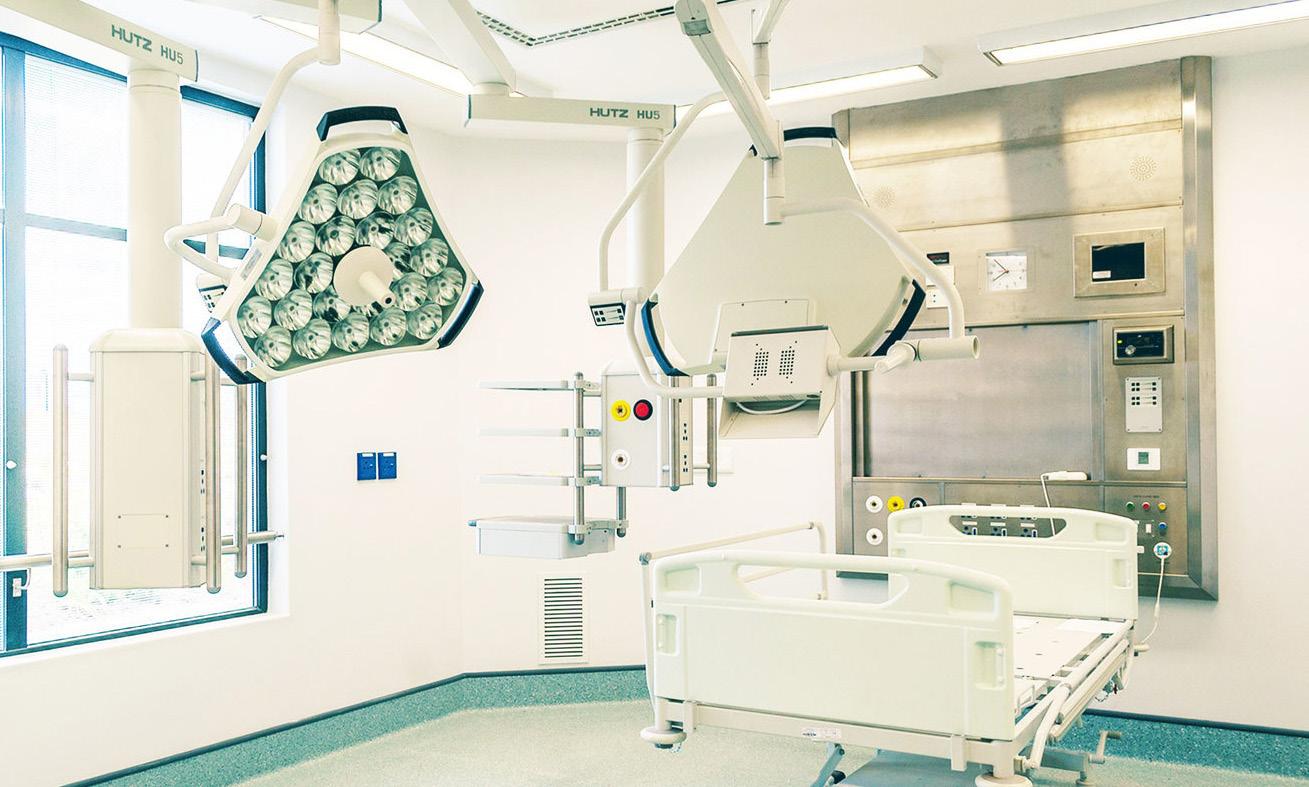
The company, busy with multiple projects around southern Africa, is hungry to partner with clients that share a vision of a better, more inclusive, more technologically advanced healthcare system that ultimately heals more people. Famed for its work on the Cecilia Makiwane Hospital in South Africa’s Eastern Cape, where leading technology was installed in a state-of-the-art building, SAKHIWO has become recognised as an industry leader with a reputation for delivery.
“Almost anyone – architect or project manager - can put together a project to the best of their ability but there is no company, certainly
on the continent, that has as many health professionals involved in deigning facilities,” says Mphake of the company’s deep knowledge pool.
50 people and a number of highly specialised consultants make up this specialist organisation, headquartered in Pretoria but expanding in sub-Saharan Africa.
“Our facilities our highly influenced by health professionals for health professionals,” Mphake adds. “Our facilities show that those professionals have been an integral part of the design process and it is not simply an architect sketching a plan. It starts with a health worker walking through a facility and imagining it working for a patient. We imagine facilities where patients come to be cured and healed. We look for healing spaces and we are dedicated to the design of healing spaces more than just beautiful and high-tech facilities.”
SAKHIWO provides turnkey
solutions to African healthcare problems, while coming up with unique, alternative funding models that allow for publicprivate partnerships to thrive.
In South Africa’s north, Limpopo Province, the healthcare industry is challenged – like much of the country – with capacity and quality issues. Around six million people in the province are subject to a public health system comprised of outdated infrastructure and minimal investment. But SAKHIWO is looking to modernise and update with its project at the Siloam District
Hospital, situated between Louis Trichardt and Thohoyandou.
“We have been involved in the district hospital project in Limpopo where we have finished designs and construction has begun with this R1.2 billion project,” says Mphake.
The hospital will house 224 beds as well as a new ward and doctor’s residence. In phase two of construction, local people have enjoyed employment opportunities and improved access to vital healthcare infrastructure. Set for completion in 2026-28, this is a hospital that was originally constructed in the 1940s and had fallen into a state of disrepair. Serving the residents of Vhembe, run by the Limpopo Department of Health, linking these rural villages to a modern health centre is seen as essential in the region’s economic development ambitions.
“We are looking forward to showing considerable progress on construction of Siloam Hospital,” says Mphake.
Also in Limpopo, SAKHIWO has been a key provider at Limpopo Central, Thabazimbi, Letaba, George Masebe, Voortrekker, Philadelphia, WF Knobel, Evuxakeni, and Mankweng Hospitals, while also delivering services and consultancy for smaller clinics and laboratories.
In the Eastern Cape, SAKHIWO is busy with the development of the oncology unit at the Frere Hospital in East London. Here, Mphake is keen to showcase the company’s ability to deliver an entire project on a design, build, and equip-style model.
“We were awarded a contract to build an oncology unit in the Eastern Cape and that will be a state-of-the-art oncology unit that we will design,” he says. “It will be on a slightly different basis from what we have worked with government previously and will be a design, build, and equip contract. In the past, we were appointed as a professional services provider, coming
in and completing designs, with the government handling procurement of a contractor and equipment. This is different as we will supply turnkey; from design to construction to equipping, and that is in Joint Venture with GVK in South Africa.” This should be a pathway to more contracts like this, where value is achieved by all. “For Government, it saves quite a lot of time as they don’t need to be involved in all of the various stages,” highlights Mphake. Already involved with a number of other projects where the company is not the lead consultant, SAKHIWO’s knowledge is much sought after.
“In the Eastern Cape, we have three hospitals – Bambisana, Zithulele, and Sipetu. And we still have a contract for consulting on community health and health technology. We are also breaking ground on Limpopo Central and that will be our flagship in terms of the future,” says Mphake of a strong pipeline and wide reach.
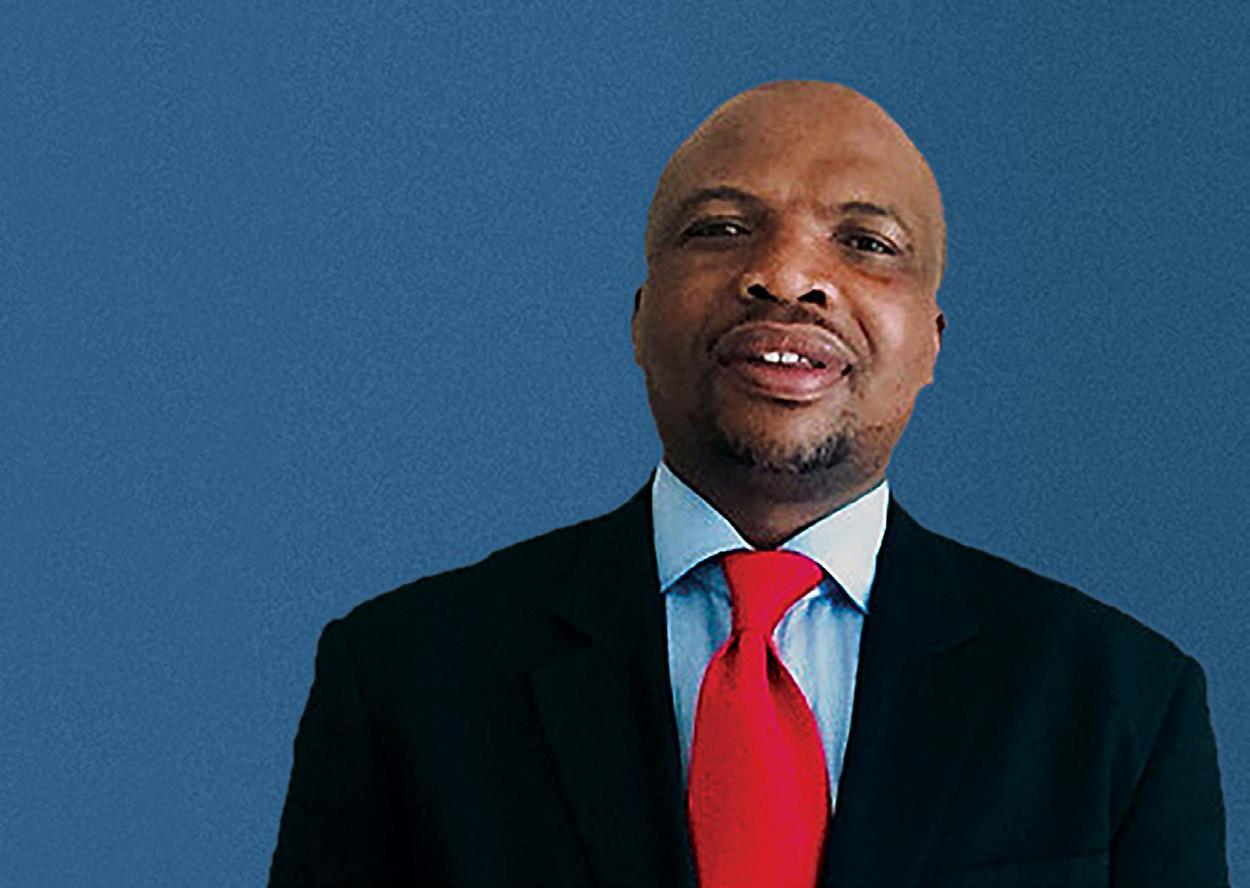
The cost of delivering high-quality health care, that produces results, is challenging. In South Africa, where a complex public system exists alongside a strong private sector, there is a difficult structure to navigate when looking to drive funding for projects. Simply, the government cannot afford to deliver what is required, and the private sector is unaffordable for many. For this reason, SAKHIWO has been a champion of alternative funding methods and has been pushing the idea of export credit funding for some time.
“We were set on getting the government to buy into alternative funding mechanisms such as export credit fund solutions with EPC. In South Africa, there has not been traction and we have not found a great degree of willingness to look at that,” admits Mphake. “We are not giving up and we are still pursuing. In other of our key markets, we have
// WE IMAGINE FACILITIES WHERE PATIENTS COME TO BE CURED AND HEALED //Dr Tebogo Mphake, CEO
made progress and we have been given a mandate to go and raise export credit funding for a number of public hospital projects.”
The company has a broad base of suppliers and a strong partnership focus across international markets which sees clients able to install industry-leading technology across facilities. When looking at developing projects from start to finish, significant sums are involved and these are not always easily accessible in Department of Health budgets.
Thankfully, the company’s expertise is recognised and trusted – through the pandemic, many SAKHIWO staff were involved in the planning of the national response. The intelligence in the business is unrivalled and this is the same when it comes to funding.
“We wanted to pursue publicprivate partnerships and we are now a pre-qualified for easily the largest public-private partnership in southern African healthcare – the Inkosi Albert Luthuli Central Hospital. It has been running on a PPP for some time and they are now going out for procurement again, looking for a partner to continue on that basis. The government asks for a RFQ and we submitted. Out of five bidders, we were pre-qualified among two others. They have since submitted their financial and technical proposals.”
Opened in the early 2000s, the hospital requires modernisation in terms of equipment and process. Its budget is stretched and senior management have commented on the ability of the institution to meet the care needs of patients while

managing a thorough and robust procurement process. This is where SAKHIWO can assist, and where the company’s access to a wide supply base is a major advantage.
“Construction companies, for example, must show a solid track record of high-quality delivery with hospital infrastructure,” explains Mphake. “We are working with OEMs and they must also have a reputation for excellence and high-quality products and service. It’s not just about a piece of equipment; it’s about the solution that comes with it. How up to date and how current is the OEM in the field they are in? In oncology, they have to be cutting edge and highly vested in R&D. Above all they have to value customer service and be uncompromising when it comes to excellence in customer service.”
Importantly, SAKHIWO has a vision beyond South Africa and aims to be an outstanding leader in health infrastructure development while meeting the needs of clients and communities across subSaharan Africa. Mphake says that much progress has been made in many key markets and he is excited about the future after the challenges of 2020 and 2021.
“We have a strong base in Namibia and an office there. We have a project in Angola that we are busy raising funding for. We are seeking to establish a presence in Malawi where we are pursuing an oncology project. Right now, that is just a RFQ but we have submitted a proposal in partnership with a construction company.
“Over the past two years, we have defended our revenue – it has not grown significantly, but given the environment, we are not too worried about that,” he says.
“We are definitely going to be growing the design, build, and equip model for oncology and we are pursuing more of those opportunities,”
•
•
he adds, including that the company is also now offering a facilities maintenance and management service enabling a full turnkey portfolio.

Partnerships with ambitious companies and government departments remain at the heart of SAKHIWO’s growth plan, and

Mphake – a medical doctor for more than two decades – is certain that the time for exploring new financial plans in healthcare is now.
“We are seeking more partnerships with OEMs so that we can offer more for clients. Lastly, we still want to influence government to offer alternative funding models. We believe the time is right with the South African public healthcare system attracting publicity for the wrong reasons, under pressure from a capacity and infrastructure perspective – and the government under fiscal pressure – we think that we are close to displaying the positivity of export credit fund solutions. I don’t see how, with the backlog of infrastructure, they will be able to fund that entirely from the government purse.”
Clearly, SAKHIWO is an
industry leader from a knowledge and technology perspective, and there is profound experience that cannot be replicated quickly. Few competitors have anywhere near the reach of SAKHIWO and the evidenced portfolio of success. As the demand for upgrades and improvements in the country’s infrastructure grows, the capacity to fund must grow too, and this must be managed by a reputable partner.
“We want to be known as a turnkey professional services company that is highly capable and has demonstrated its collaborative nature across the value chain,” Mphake concludes.
// WE ARE WORKING WITH OEMS AND THEY MUST ALSO HAVE A REPUTATION FOR EXCELLENCE AND HIGH-QUALITY PRODUCTS AND SERVICE //


PRODUCTION: Eleanor Sarbutt-King
“We improve our customers’ energy and water efficiency, increase their productivity, and reduce environmental risks with our product and process expertise,” says Metso Outotec, a frontrunner in sustainable technologies, end-to-end solutions, and services for the aggregates, minerals processing, and metals refining industries globally. Planet positivity is high on the agenda for this sustainability-focused outfit, as it continues to expand its distribution spread further and wider.
Headquartered in Helsinki, Finland, Metso Outotecprovider of technologies and services to improve customers’ energy and raw material efficiency, water resources management and safety- employs over 15,000 people in more than 50 countries and accrued sales for 2021 in the region of €4.2 billion. “Our extensive offering for the full plant, from equipment to a broad range of services, helps our customers improve their profitability and lower their operating costs and risks,” Metso Outotec relays.
“We have strong R&D and innovation power, and we are continuously looking for new ways to introduce innovations for our customers’ benefit.” In Africa, Metso Outotec has been a key player in mining
operations for decades, and now the company is helping clients to use less power, less water, emit less carbon, and recover more while using less.
“We understand our customer’s world and the daily challenges they face. Together, we can partner for positive change,” Metso Outotec issues as its strong promise.
Over the years one of the company’s great successes has lain in its ability to straddle substantial involvement in heavy mining and with major manufacturing operations around the world with making sustainability a strategic priority. “It is at the core of our offering and operations,” Metso Outotec stresses. “We strive to create the biggest possible impact by actively
supporting and enabling our customers in their sustainability ambitions.
“Our Planet Positive offering focuses on energy and water efficiency which contributes to a

// WE STRIVE TO CREATE THE BIGGEST POSSIBLE IMPACT BY ACTIVELY SUPPORTING AND ENABLING OUR CUSTOMERS IN THEIR SUSTAINABILITY AMBITIONS //
circular and carbon-neutral economy.” Identifying the enormous demand for environmental efficiency within its customers’ key industries, in particular the highly energy and water intensive mining industry, Metso Outotec provides durable, energy-efficient equipment and services that last for a long lifecycle.
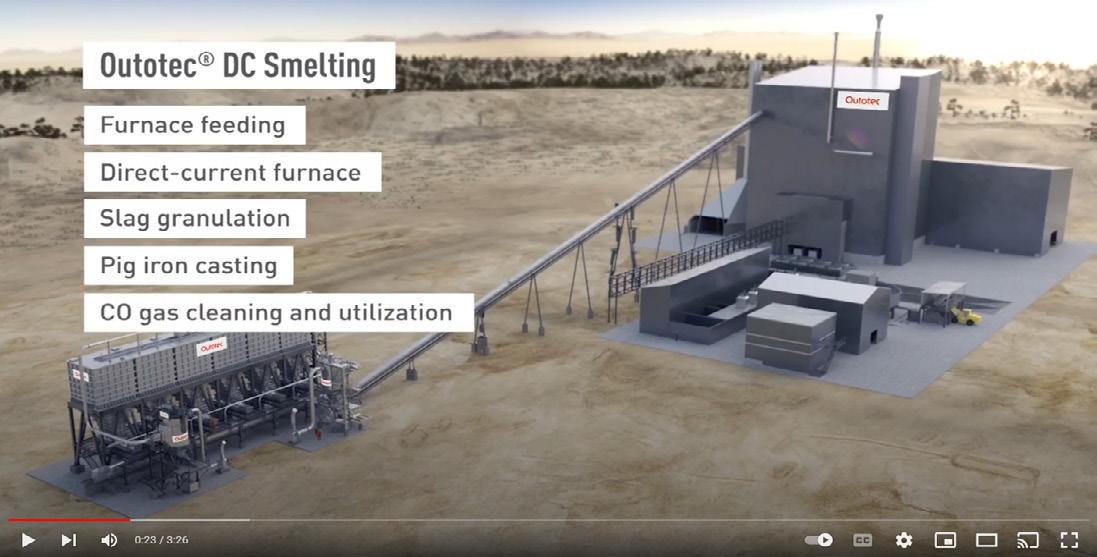
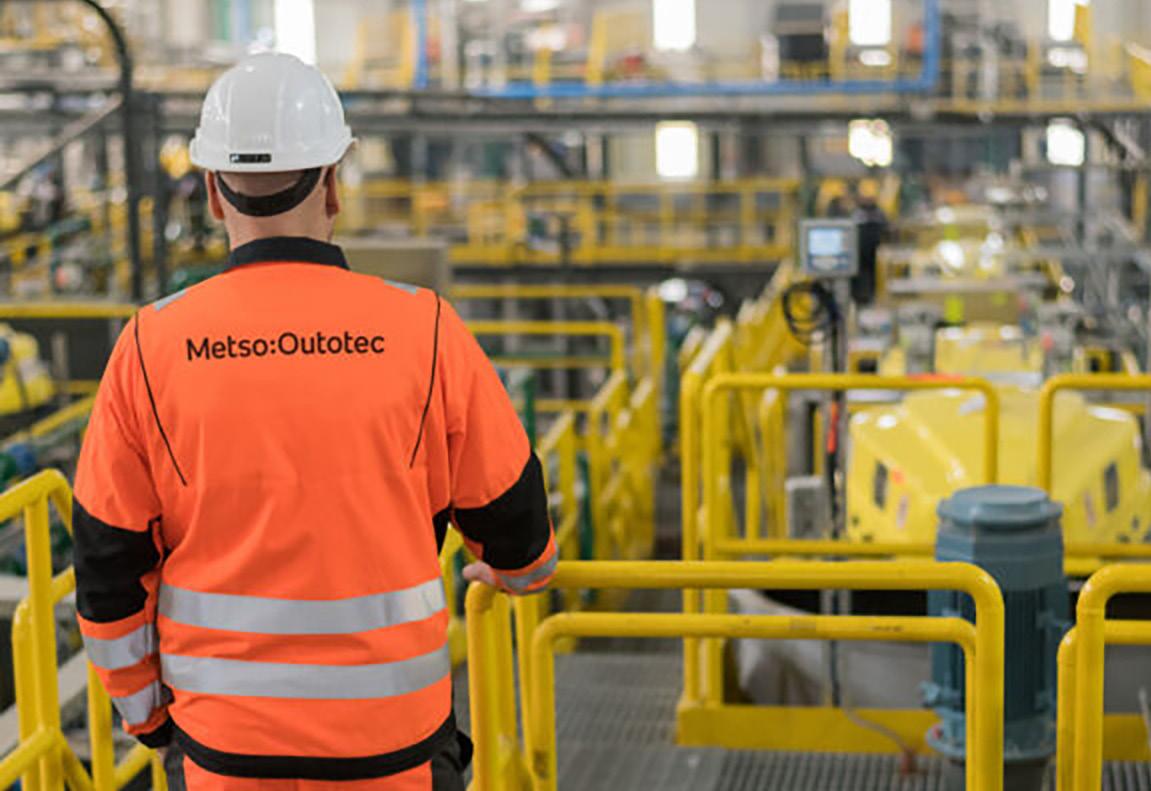
“We aim to be a sustainability leader in our industry,” is the lofty ambition towards which it strives daily. “By innovating new and better technologies and by improving our ways of operating, we help to create a more sustainable future. We are striving for net zero and committed to limiting global warming to 1.5 °C.”
In November, it was reported that Kamoa Copper S.A. had selected Metso Outotec to supply a high-capacity
Direct Blister Furnace to the company’s copper mining complex expansion in the Democratic Republic of Congo, the world’s largest capacity flash smelting furnace. Metso Outotec has delivered more than 60 flash furnaces around the
world since the 1950s, the most utilised technology in pyrometallurgical copper production. The company boasts the cleanest smelting method available, which forms an integral part of the company’s Planet Positive offering.
“Non-ferrous metals play a key role in the green transition,” underlines Jyrki Makkonen, Vice President, Smelting at Metso Outotec, “and a major increase in global copper production is required to support this transition. We are pleased to support Kamoa Copper in their ambitious expansion project, in which high capacity and reliable, sustainable processes play a vital role.”
Constantly evolving is Metso Outotec’s innovative Mining Truck
Body (MTB), a solution launched back in 2019 and now quickly gaining traction in the mining market. Its unique, one-piece, lightweight hybrid haul truck tray combines the best of high-strength steel and rubber, with the lighter weight also translating more sustainable to further align with the Planet Positive ethos, engendering increased payload and lower fuel consumption per hauled tonne.
“We have had very good customer responses,” shared Carl Samuelson,
Metso Outotec’s Director of Loading and Hauling Solutions. “I would say after payload increase and fuel/tonne savings the increased wear life is very much appreciated. The evolution of the MTB continues, and the design never stands still – it is continuously updated with new features, structural design tweaks and new rubber grades with a focus on reducing even more weight.”
Last year Metso Outotec and its distribution partner, BIA Group, announced the expansion of its aggregates distribution coverage to Africa, meaning that Metso Outotec’s stationary and mobile equipment, spare and wear parts coupled with BIA’s technical expertise and local presence, would become available for aggregates
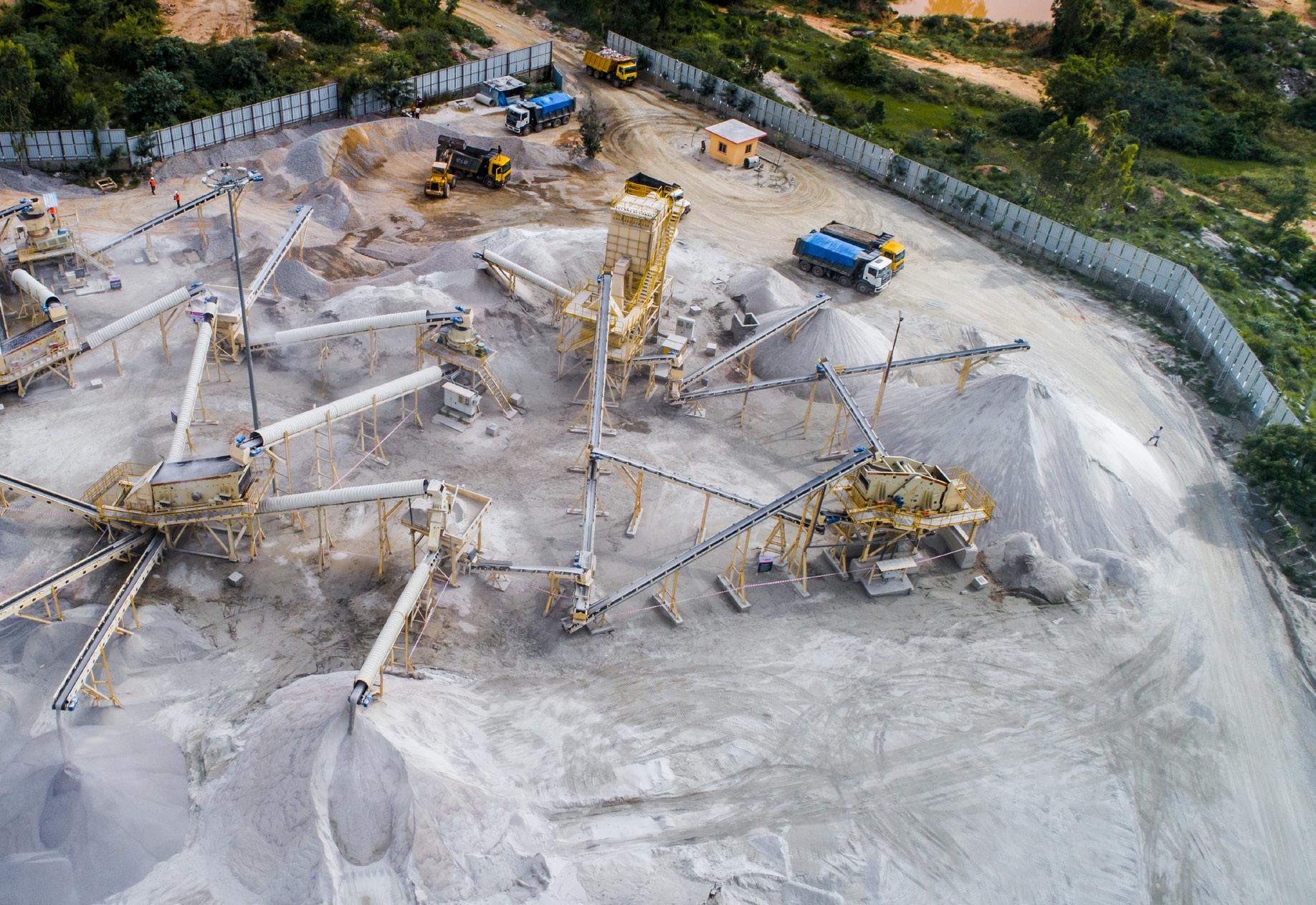
NON-FERROUS METALS PLAY A KEY ROLE IN THE GREEN TRANSITION, AND A MAJOR INCREASE IN GLOBAL COPPER PRODUCTION IS REQUIRED TO SUPPORT THIS TRANSITION //
customers in West and Central Africa.
“This expansion of our distribution partnership with BIA enables us to reach out to new territories, where we were not present earlier,” stated OlliPekka Oksanen, Senior Vice President, Global Distribution Management at Metso Outotec. “Our portfolio covers the needs of different types of customers and applications and meets the local requirements and standards. We are happy to be able to utilise the opportunities in the region in collaboration with BIA.”
The two companies have successfully partnered in the Benelux

region since 1930. This decision to expand to Africa was driven by a shared ambition to reach and serve customers in the region better than ever before, and capitalise on the dynamic nature of the African markets driven by both GDP and population growth and large construction projects which positively impact aggregate demand.
“This distribution agreement extension for West and Central Africa demonstrates the willingness of BIA and Metso Outotec to strengthen their historical partnership that started over 90 years ago with Nordberg for Belgium,” rounded
off Vincent Bia, CEO of BIA Group. “Since then, both companies have continuously developed their products and services to gain an unrivalled expertise that serves both the aggregates and mining customers.
“We are confident that BIA’s market knowledge and local presence together with Metso Outotec’s solutions and technologies will form complementary assets to meet the ever-growing needs of our customers.”
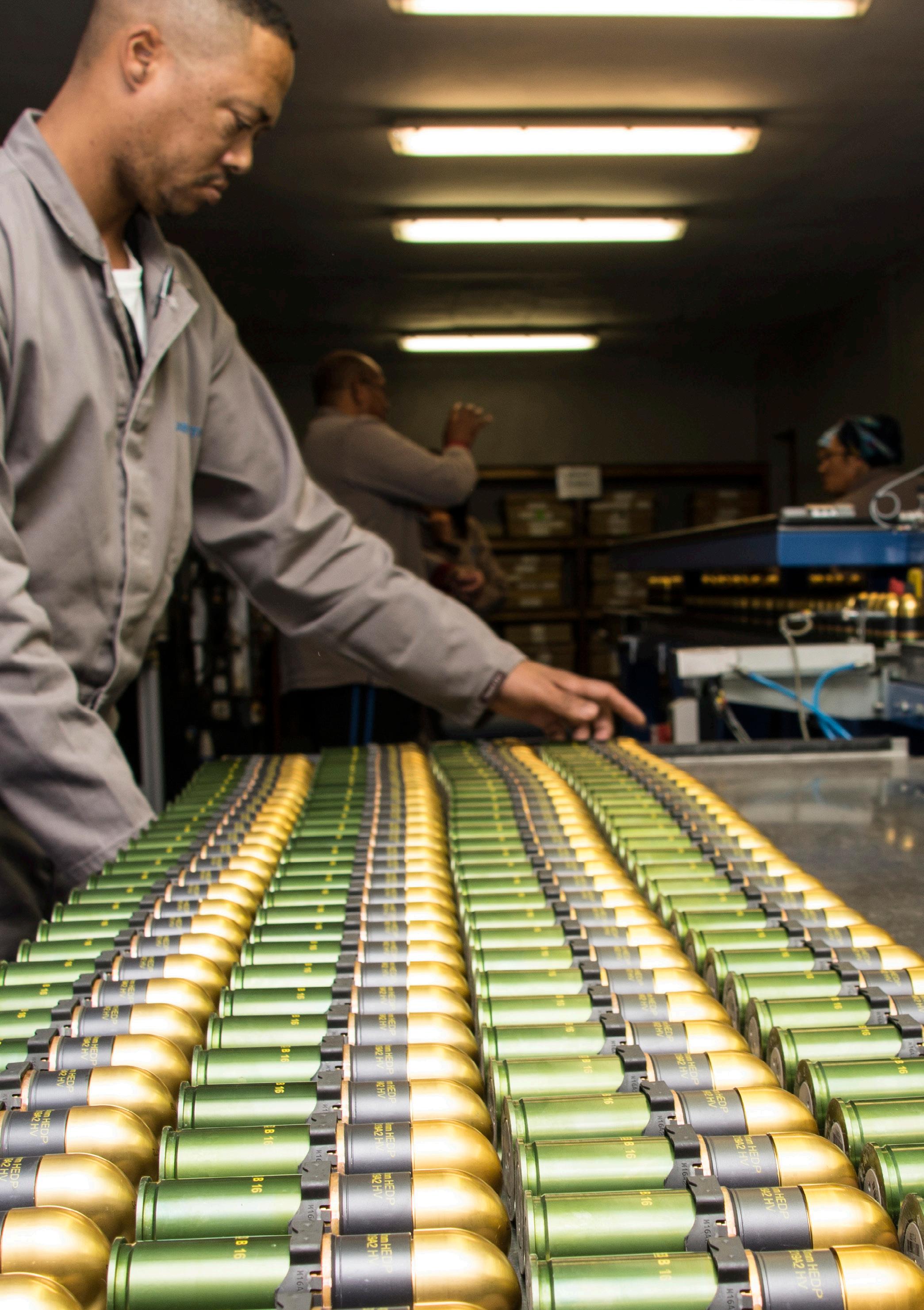
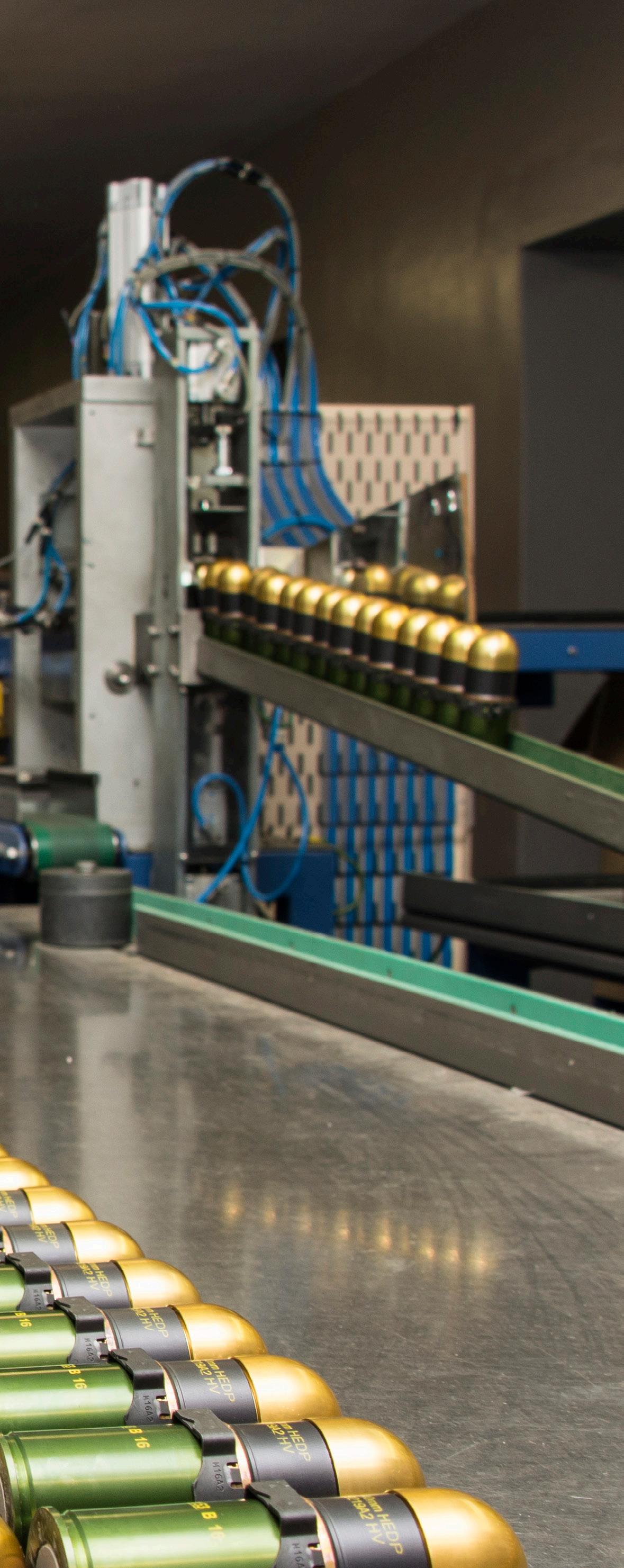
PRODUCTION: Eleanor Sarbutt-King
Bringing together Germany’s Rheinmetall Waffe Munition and Denel of South Africa, Rheinmetall Denel Munition (RDM) specialises in the development, design and manufacture of large- and medium-calibre ammunition families and is a world leader in the field of artillery, mortar and infantry systems. Huge customers fire major orders at the globally-renowned South African subsidiary, and now it enjoys massive progress on the path to attaining carbon neutrality by 2035.
As an integrated technology group, Rheinmetall AG stands for a strong, internationally successful company that operates in various markets world-wide with an innovative range of products and services. Rheinmetall Denel Munition (RDM)’s own establishment came about in September 2008, when the Denel divisions comprising Somchem - the Somerset West and Wellington sites - Swartklip, Boksburg and Naschem all became part of the Rheinmetall Defence Group. As such, Rheinmetall Defence became the majority shareholder and Denel retained its own 49% of the share.
Denel has been a foremost force in South African national security

since it was established as a stateowned industrial company in April 1992, having equipped the South African National Defence Force (SANDF) and other major players with hardware, technology and other products. Its Somchem division is known globally for its vision of being the best in solid propulsion products and energetic material applications, and Swartklip Products has origins
dating back to 1948, twice decorated in the chemical company category of the Technology 100 competition. Naschem’s heritage goes back even further, starting at the Lenz Factory which was used as an in explosives depot for the gold mines in 1896. The facility was overhauled in 1970 as a result of South Africa’s need for self-sufficiency in the armaments field and Naschem followed in 1978. At
// WE WORK CONSTANTLY TO IMPROVE OUR CUTTING-EDGE TECHNOLOGIES SO THAT WE CAN PROVIDE OUR CUSTOMERS’ SOLDIERS WITH THE BEST-POSSIBLE, MOST RELIABLE SOLUTION //
the Boksburg production plant forged shell bodies and metal components of outstanding quality are manufactured.
“We are a world leader in the field of artillery, mortar and infantry systems as well as plant engineering,” RDM offers as an opening shot. “Our people work together across all of our sites to produce and sell world-class artillery ammunition, to ensure that we go the distance, and then some.”
RDM enjoys being able to draw on an extensive product portfolio when serving its core markets, encompassing ammunition and metal components, minefield breaching systems, 40mm infantry ammunition as well as
pyrotechnics and artillery ammunition. Primary business focus remains locked on Asia, the Middle East, South America, South Africa and African countries, however in July RDM’s compelling expertise in the world of indirect fire systems brought a colossal order from a key NATO customer.
With delivery to take place over the next two years Rheinmetall Denel Munition has been courted to
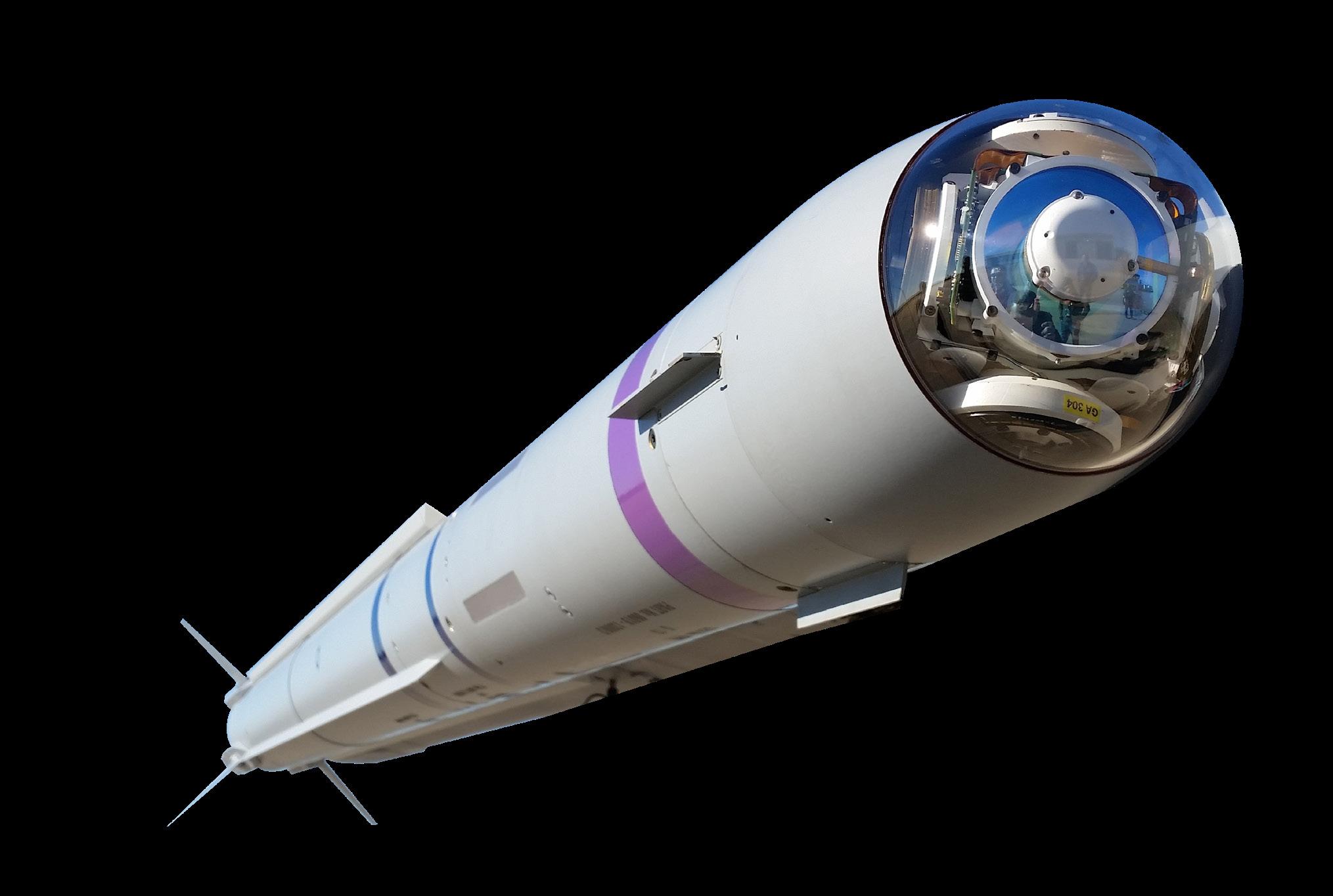
supply 155mm ammunition from its tried-and-tested Assegai product line, a contract worth a figure in the uppertwo-digit million-euro range. “We’re known worldwide for our long-range Assegai indirect fire technology and are pleased to be able to welcome a new partner nation to the Assegai family”, commented Jan-Patrick Helmsen, Rheinmetall Denel Munition CEO.
“As a systems maker, we
// WE’RE KNOWN WORLDWIDE FOR OUR LONGRANGE ASSEGAI INDIRECT FIRE TECHNOLOGY AND ARE PLEASED TO BE ABLE TO WELCOME A NEW PARTNER NATION TO THE ASSEGAI FAMILY //
work constantly to improve our cutting-edge technologies so that we can provide our customers’ soldiers with the best-possible, most reliable solution.”
The new order encompasses the complete 155mm Assegai ammunition system, including fuses, different projectile types such as high-explosive service rounds, and Assegai artillery propelling charges. The Assegai family of artillery ammunition can be fired
from any NATO STANAG-compatible artillery system, including the PzH 2000 self-propelled howitzer, one of RDM’s three recent new world-record holders for the 67 kilometres’ distance its 52-calibre gun propelled a shell during a test fire event in South Africa in 2019.
The Assegai system approach produced long ranges with various artillery systems. A non-NATO 155mm artillery gun with 52 calibre lengths and a 25-litre propelling charge
chamber achieved a record range of 76 kilometres, and Rheinmetall Denel Munition is already working on other future artillery technologies; the rocket motor in conventional 155mm Assegai projectiles is being improved, while a new development is imminent that will boost the maximum range to over 155 kilometres.
Further successes were hailed of late in the field of 40mm ammunition and the award of contracts for the supply of 40mm ammunition by two customers in Asia, one of which is a first-timer who has ordered 400,000 40mm low-velocity grenades and marks a significant expansion of its customer base. The other is for an existing customer constituting 100,000 rounds of medium velocity grenades to be delivered between December 2022 and February 2023, with a total
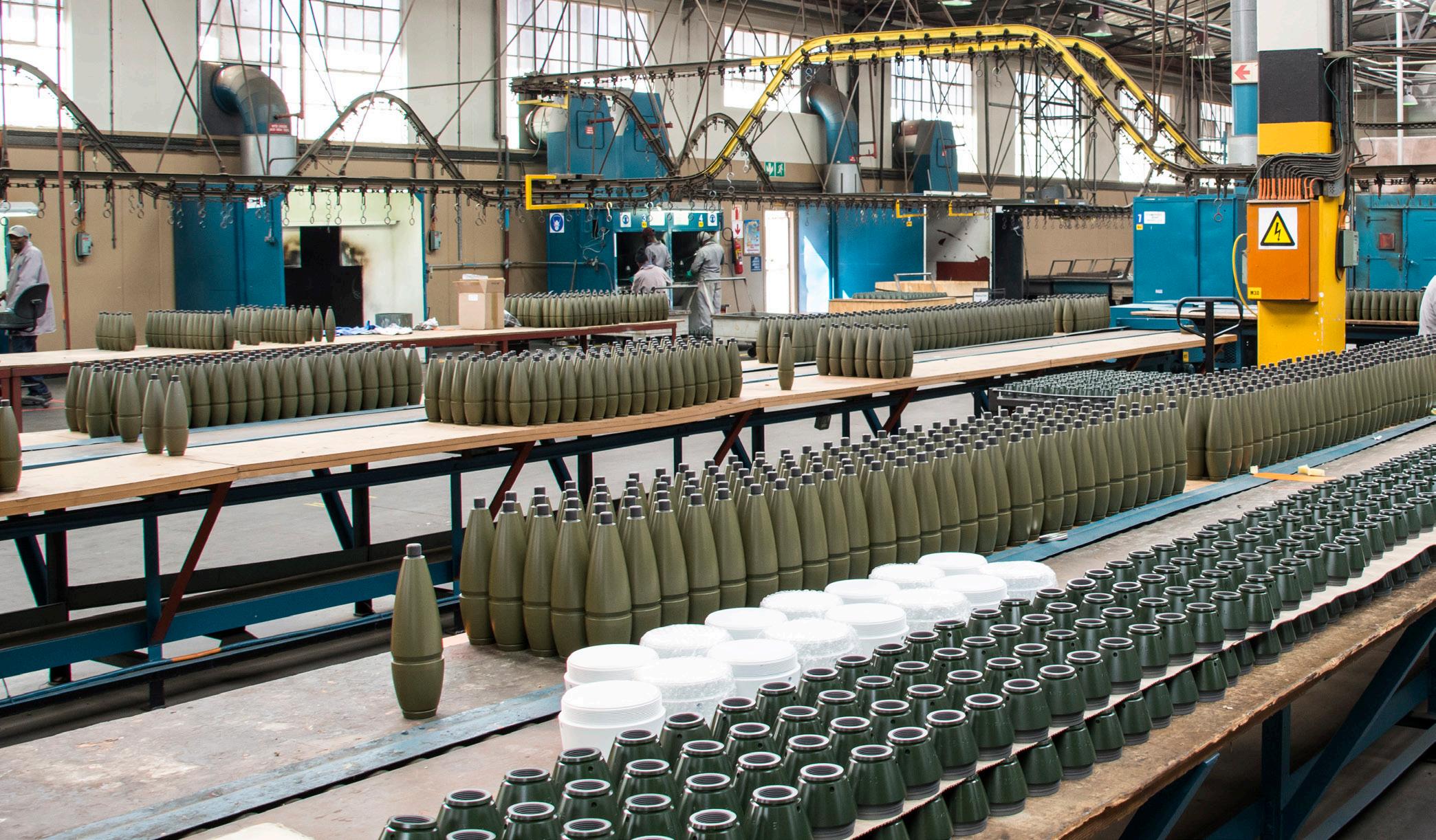
// AN IMPORTANT STEP IS OUR MOVE AWAY FROM THE INTERNAL COMBUSTION ENGINE IN OUR FLEET OF VEHICLES, WITH A COMPLETELY NEW MOBILITY CONCEPT AT ALL FOUR RDM LOCATIONS IN SOUTH AFRICA //
value approaching €25 million.
“With these two contracts, we are expanding our customer base in Asia,” Helmsen explained, as negotiations are already well underway to increase these quantities.
Rheinmetall has set itself the goal of attaining CO2 neutrality by 2035, and RDM has taken the first steps toward improving its climate footprint in support of the crucial and admirable global goals. introducing e-vehicles and off-grid, solar-powered charging stations at its Somerset West location.
“Around the world, we’re focusing a lot of attention on Environmental, Social and Governance (ESG) goals,” details Armin Papperger, chairman of the executive board of Rheinmetall AG.
“All over the Group, we’re
And Engineering Supplies
Puma Valve and Engineering Supplies has been in business since 1992, and with this comes vast knowledge and experience of the shipping industry and their service requirements.
Services include:
• Product Design
• Specialised Custom Design Valves
• Refurbishment
• Ex stock Supplies of Valves and Spares
• Technical and Solution Support
Supplying a full range of marine valves and associated products as well as number of specialised imported products.
We are Level 1 B-BBEE contributor :135% Procurement Recognition
www.pumavalve.co.za
067
committed to taking visible steps that demonstrate our sense of responsibility for the environment and society. The initiative in South Africa is just one example.”
In 2021 Rheinmetall signed the United Nations Global Compact, which fosters responsible, sustainable, and transparent corporate governance. RDM’s locations occupy a total of 5,000 hectares, meaning that large distances have to be covered not only between plants but also when onsite. The company’s app-based transport system has now been expanded to include e-scooters and e-bikes, to engender enhanced employee mobility and a muchdiminished environmental impact.
Helmsen himself unveiled the new vehicles at the company’s main location in South Africa, where they
will operate as well at Rheinmetall’s Boskop plant in Potchefstroom. “As part of the Rheinmetall organisation, which has set itself the goal of being climate neutral by 2035, RDM is supporting this ambitious objective with a masterplan that involves implementation of solar energy and green hydrogen,” he enthused.
“These, along with other projects in the renewable energy domain, are intended to lead to climate neutrality. An important step here is our move away from the internal combustion engine in our fleet of vehicles, with a completely new mobility concept at all four RDM locations in South Africa.”


Jotun Paints South Africa commands significant market share across various industries because of its delivery of the absolute pinnacle of performance coatings. Paints from Jotun are thoroughly researched, backed by global application, made to international standards, and manufactured locally. The company’s new MD and National Sales Manager talk to Enterprise Africa about ongoing success across southern Africa.
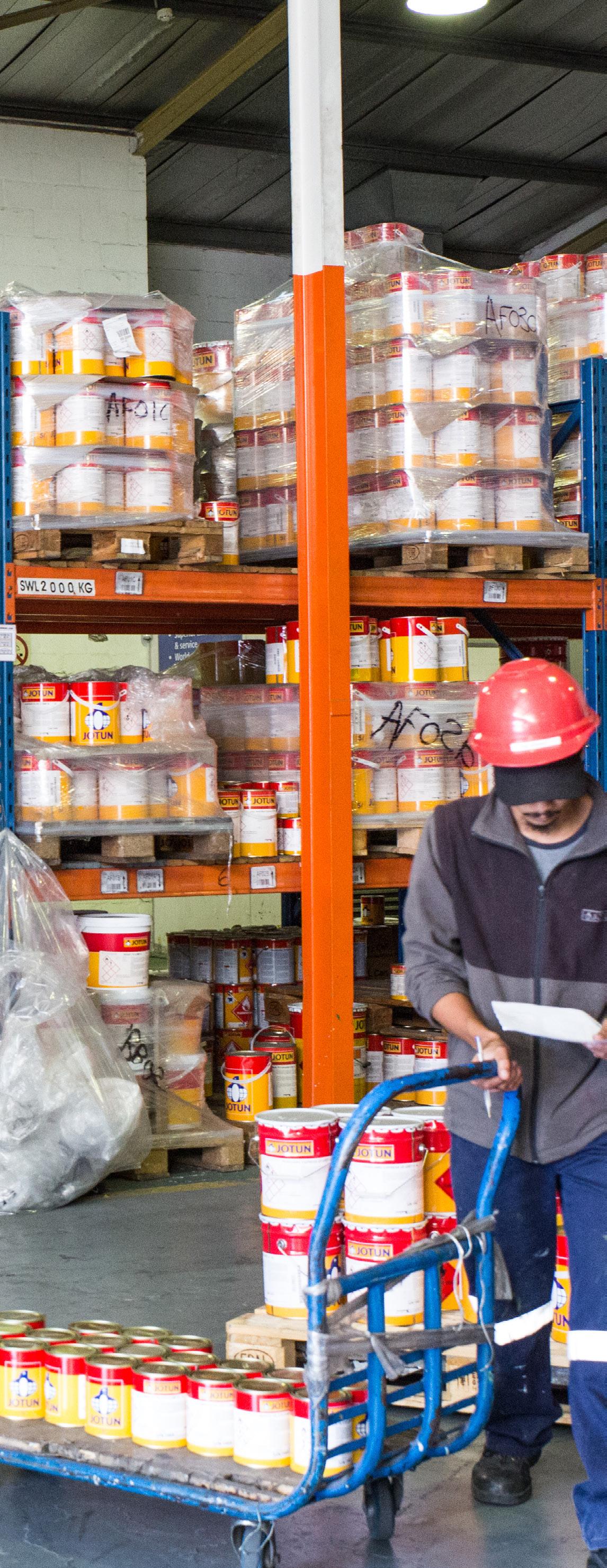
Protectors of property, Jotun Paints (Jotun), is one of the world’s leading coatings corporates, delivering premium quality products for decorative, marine, protective, and powder applications. With more than 10,000 employees globally, active across more than 100 countries, generating operating revenues of more than US$2 billion, Jotun is a powerhouse paint player.
In South Africa, the regional business looks after the entire SADC area, focussed on marine coatings and heavy industrial applications. Last year – it’s 25th in SA - Enterprise Africa heard from former-Managing Director, Trevor Maughan about strong Jotun Paints SA ambitions after a very challenging period.
In 2022, Maughan has retired and another Jotun-lifer, Martin Ibsen, has taken the reins in South Africa, hoping to roll out a new strategy of lean management to mitigate against the new challenges that exist as a result of the old.
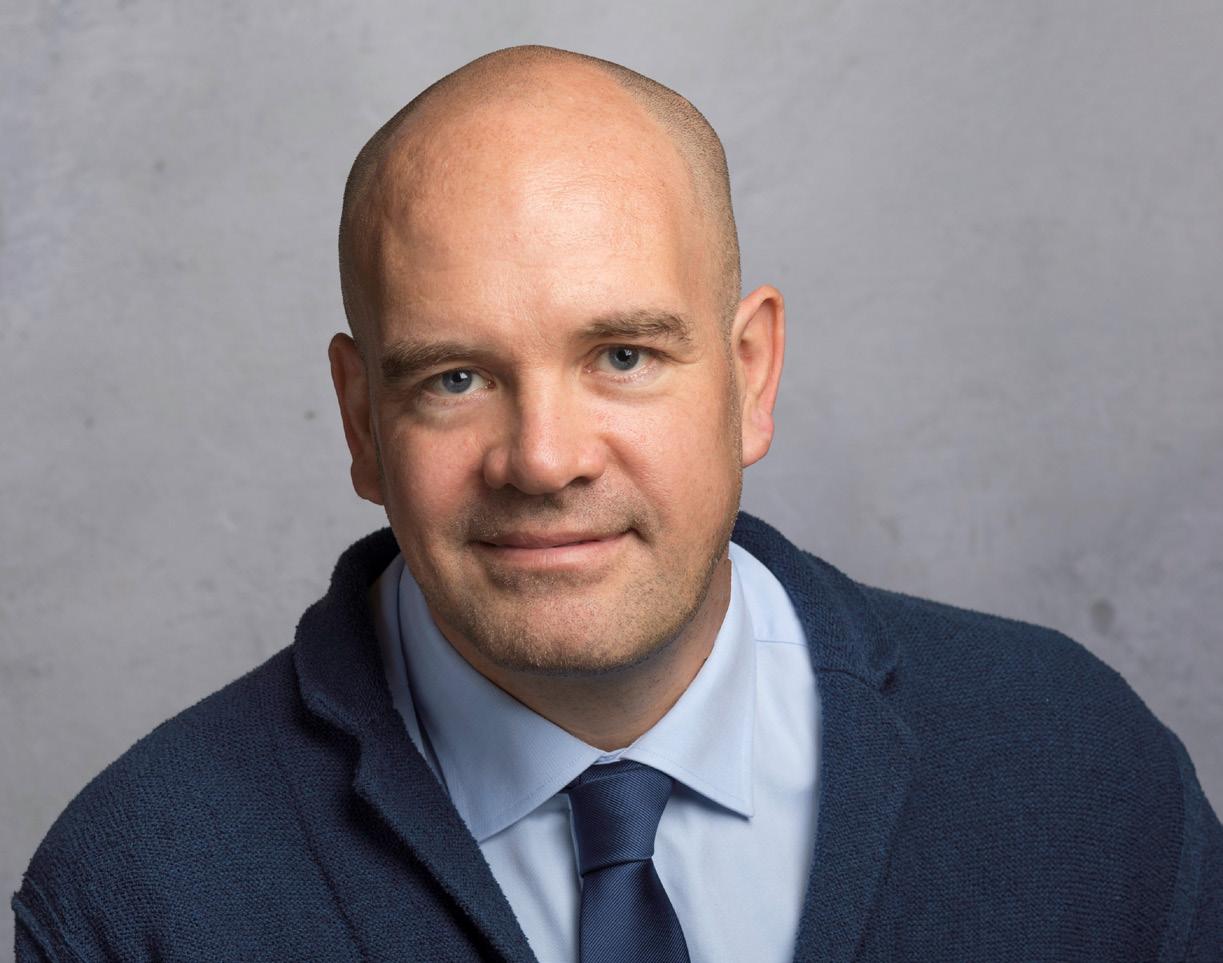
“You have to be lean,” he says.
“You can no longer rely on getting materials within six weeks. In fact, we are now talking about three or four months in many cases. We have to store more to be more flexible. We have signed a new lease at a warehouse with extra storage capacity to facilitate the growth that we plan for.”

Producing the highest quality paints in the world at scale, to a uniform
standard, and holding enough stock to satisfy clients across multiple industry sectors is no easy task. Demand has been decimated and routes to market totally twisted, and this is where Jotun’s size and experience has helped it to carefully navigate the difficult conditions.
“Covid certainly put the pressure on,” admits Ibsen “but we think we are in a good place having realised good growth. We do struggle with the continuous flux with raw material pricing and availability. Making paint is very high-tech in many ways. We make paint for hot surfaces, industrial coatings, offshore protection – it requires a lot of research. Many people could go online and find out how to mix some paint, but how to do you
// YOU HAVE TO BE LEAN. YOU CAN NO LONGER RELY ON GETTING MATERIALS WITHIN SIX WEEKS. IN FACT, WE ARE NOW TALKING ABOUT THREE OR FOUR MONTHS IN MANY CASES
make large quantities of chemically identical paint, at different locations all over the world. That requires sourcing raw materials globally, from global partners, but at the same time trying to source as much locally as possible,” he explains, adding that some ingredients are only available from Germany and simply not manufactured locally.


With a Cape Town production facility, Jotun Paints SA does invest in a local supply chain, and has benefited from strong relationships which Ibsen is keen to foster further.
“It is important to support the supply chain,” he states. “Financially, it can be cheaper to import everything, but with current shipping lanes and pricing, there are risks. Jotun has a strategy around partnering with suppliers both locally and globally and we do want to grow African businesses by having African partners as much as possible by investing in that supply chain.
“Two years ago, we did have to manage costs effectively during the pandemic and we are rebuilding relationships with suppliers to ensure we support business in Africa and an African supply chain.”
National Sales Manager: Performance
Coatings, Gareth Alcock also has concerns about the disruption in the supply chain, but insists that the company’s focus on quality product will continue to set it apart.
“Shipping has been a disaster since Covid, and it continues,” he says. “What makes it even more difficult is that there are not as many big vessels coming into South Africa. Large vessels go to Singapore or similar and then unload stock onto smaller vessels before sending them into South Africa. That pattern effects everyone in terms of the supply chain.”
To manage this situation, especially in combination with economic uncertainty (globally and locally), some businesses have looked to cut
Steelpack is a fast-developing packaging company in South Africa with an ambition for growth. We are experts in developing metal packaging solutions. Steelpack is a trusted partner to its customers, producing quality and reliable products as well as offering customer service excellence. It is part of our business practice to ensure the recyclability of our products and to reduce their impact on the community and the environment.
SteelPack uses the latest decorative technology which enables world class finishes and resolutions, while maintaining low minimum order quantities and stock commitments. Artwork changes have been made easy and flexible between production runs. No longer do you need to commit to a vast quantity of printed plate. We strive for continuous improvement and continue to seek possibilities in all new and available technologies.
Steelpack is based in Durban and in Johannesburg, with main production facilities in Durban.


SteelPack supplies the chemical, industrial coatings, cosmetics, automotive and speciality sectors.
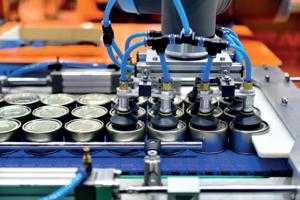
PRODUCTS OFFERED
- Aerosol Cans - Round Cans (Triple Tight , Tight head Open Top Pails & Drums)



- Screw Cap cans
- Slip Lid & Polish Cans

- Interlocking Cans



- Rectangular Cans
- Glue Cans
- Custom Cans
cost. Jotun has no interest in price waring with competition and gains its market share through value around excellence for client and end-user.
“There has been a noticeable impact with companies trying to reduce costs in their operations, trying to make up for the losses in the previous years. We are combating that by focusing on quality – it’s not all about price – and selling higher volumes of product that will give you a lot more per square meter. Not to mention the difference the performance of the products will give - good antifouling performance, chemical or heat resistance for a long period brings the value needed for the end client.
“We are also keen on serving the market in the SADC region. We have seen a reduction in stock holding, but sales remain very strong. The market
has come back, we do see a change in the market, but it’s about the amount of stock being purchased combined with our conversations about the quality of our products to combat the pricing issue,” explains Alcock.
The paints and coatings industry is expected to boom in South Africa, reaching $2.1 billion by 2026. This should be fuelled by growth in the construction and infrastructure sectors, as well as a reduction in imports resulting from supply chain disarray. To take full advantage of this opportunity, Jotun is reinforcing its foundations in SA, focussing on development and retention of the very best people.
“Jotun has a policy of changing management every five years. We have a great pool of managers to pick
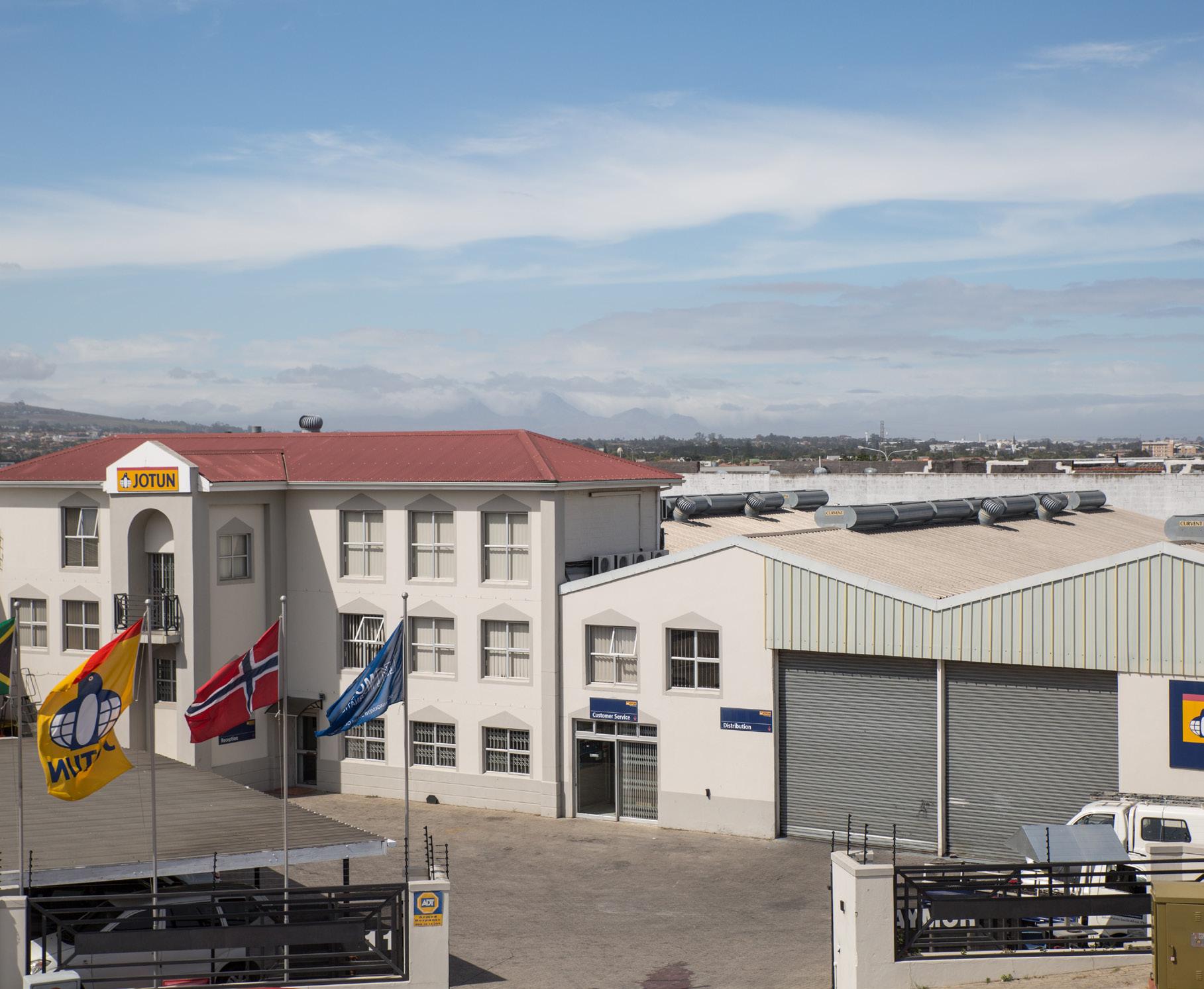
from and we choose to effectively benefit the local unit with a global perspective,” says Ibsen, a veteran of the company for a quarter century, holding posts around across the globe including senior roles in Denmark, China, Norway, and Germany.
“By moving people around, we contribute to our strategy at global level, which is organic growth. We do not buy companies, we employ good people, and we bring them up through the systems. We like people to have a base level of theoretical knowledge and we are looking at systemising our
trainee programme to continuously bring in interns. We try to then keep the best people and assist them to grow as we grow, rather than trying to go out and find superman in the market but realising he’s busy. Training and sharing across borders is an important element within Jotun values, every year we have fellow penguins doing training in other countries. Jotun also offer both short term and international assignment for those keen on an international experience. This helps the retention of staff - we have several employees with over 25 years’ experience.
“If you look at the countries where Jotun has had real success over the years – Turkey, China, Korea, Saudi, Oman etc – that has been our principle; bring in young people, train them up, give them challenges, allow them to grow, and make it common for people to stay with us for 15-20 years.”
This strategy is clearly paying dividends, allowing the company’s people (or ‘penguins’ as they are affectionately known) to drive growth across the board. In heavy industry, Jotun leads the way across multiple sectors, and Ibsen has no
intention of losing momentum.
“We are growing and investing, and we intend on that continuing,” he says.
“We are growing in the oil and gas industry in Angola with all of the majors that are active there. Local applicators buy from us and some of them are part of bigger chains.
“We see growth potential in mining,” he adds. “We are interested in seeing how development continues in Mozambique. That is where our global reach comes into play. We have a global team of people working with very niche products, of the highest quality, for projects like this. Our colleagues in Korea and France work closely with the various stakeholders on projects like this.”
Alcock agrees, stating that market leadership across the industries in which Jotun plays is always the goal.
“In the past four or five years, we have gained a significant portion of market share in the industry and we are one of the market leaders in terms of protective coatings in South Africa.
“We are still strong in the refinery business, and we are the market leader in shipping. We are very strong in the renewable energy sector as well as the infrastructure market – buildings, bridges etc. These remain our core focus right now.”
Investigations into new products, where Jotun is strong globallyincluding for flooring and intumescent coatings for southern African applications – will continue to drive innovation for the business in SA. With many focussed on ‘green credentials’ as a strategy for future growth, Jotun
Nampak DivFood is the leading manufacturer of plain and decorated food cans and ends, aerosols and metal containers in South Africa.
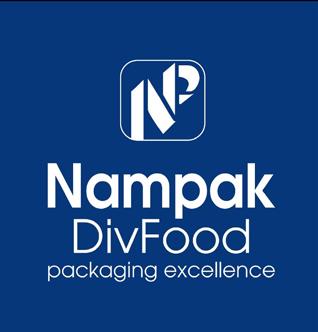
With over 60 years’ experience and our extensive offering, we are uniquely positioned to meet the complete needs of our customers.
As a manufacturer of high-quality products, we use the latest technology and equipment, together with exceptional print quality, to manufacture a wide range of not only metal packaging but also metal packaging solutions. As a creative and innovative manufacturer, we are able to fulfil all canning requirements, with quality customised metal products in tinplate through an intricate production process.
Our product range is brought to life by many well known and loved South African brands and includes:

• paint cans suitable for solvent and water-based products
• can ranges from 250ml to 25L
• UN certified paint cans.
Nampak DivFood is supported by our world class Research and Development centre. Nampak R&D continues to lead in its field; standing amongst the global leaders in packaging science and technology.
calls them Greensteps - especially in industry sectors that have previously struggled with green transformation –Jotun has set out its ambitions at group level, but Ibsen is clear that significant positivity has already been achieved. Sustainability is on the agenda in Jotun both globally and locally, when it comes to customers, the most sustainable system is often the best performing and longest lasting. Here, Jotun has example of coating systems protecting offshore structures for more than 40 years.
“It is important to remember that there is a drive around being green but at the end of the day, the greenest thing you can do is make something that lasts - that is why we are so successful,” he says.
After releasing a very positive set of results in October 22 - including increases in sales volumes, pricing, top
line growth and operating revenue –the global Jotun group is in very good shape, navigating the lingering Covid challenges without major setback. Agreeing the start of production at a new facility in Algeria (in partnership with Med Investment Holding Spa and Technover P), Jotun’s success in Africa now covers Africa from south to north.
From Cape Town, the local operation’s new leadership will be looking to push hard for continued success with its strategy, and will always delight clients, protecting property with every application.
GREENEST THING YOU CAN DO IS MAKE SOMETHING THAT LASTS - THAT IS WHY WE ARE SO SUCCESSFUL //Nampak DivFood look forward to our packaging relationship with Jotun Paints.
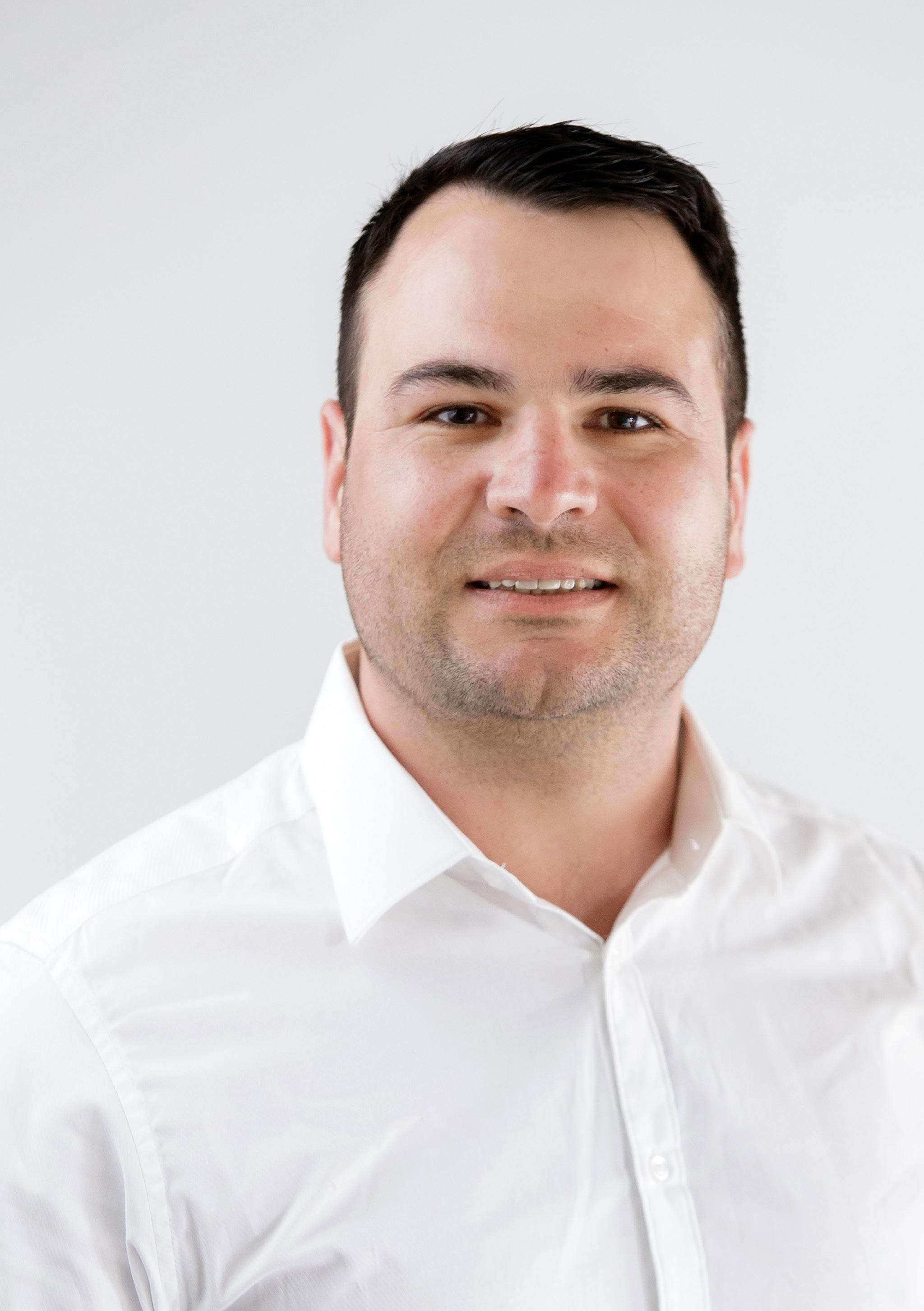 Dr Hendrik Snyman, Chief Investment Officer of Gaia Fund Managers
Dr Hendrik Snyman, Chief Investment Officer of Gaia Fund Managers

PRODUCTION: James Davey
Diversified infrastructure investment company, Gaia, is busy raising funds for important African opportunities. CIO Dr Hendrik Snyman is confident about the company’s outlook following a period of positivity, listing a new fund that is set to democratise internet access in South Africa.
Changing public attitude, increased demand from investors, and a firm realisation of growth opportunities have seen Environmental, Social, and Governance (ESG) issues climb the priority list for asset managers.
There is an expectation from PwC that ESG and non-ESG products will quickly converge and more than three quarters of institutional investors in Europe will veer away from non-ESG products completely by 2025.
The mantra behind this shift is that people now want to know that their money is being used to do good, with purpose and profit aligned, rather than mutually exclusive.
The practice of ESG investing goes back to the 1960s where some investors excluded stocks from their
portfolio based on negative views around business activity, including tobacco production or any involvement in the apartheid regime. Socially responsible investment, as it was then, was re-labelled as ESG in 2005 and accelerated in 2012/13 when studies were published linking ESG strategy to strong financial performance.
Gaia Group - specialist South African asset manager with a strict focus on infrastructure and agriculture investments – has been concentrated on creating value through positive investment since its formation 10 years ago.
Last year, Chief Investment Officer, Dr Hendrik Snyman told Enterprise Africa that the company was growing
by targeting climate infrastructure with renewable energy projects. A thorough understanding of engineering processes, industrial development, and project financing allows Gaia to maximise investment options through the project lifecycle.
Now, the company is busy raising funds to put to work in renewable, communication infrastructure, and climate action projects. It’s an exciting time, and Snyman is buoyant about opportunities in South Africa.

“Company-wise, we’re doing well,” he smiles. “The war in Ukraine and the prevalent power outages we face in South Africa are real concerns, but we are certainly still realising significant opportunities.”
After starting out in renewable energy, the company achieved
success, becoming known for its Gaia Renewables 1 fund, listed on the Cape Town Stock Exchange, which holds an economic interest in the Tsitsikamma Community Wind Farm near Humansdorp in the Eastern Cape. More recently, Gaia broadened its scope to include telecoms infrastructure through its Fibonacci Fibre fund, again listed in Cape Town. Here, a new structure was formulated to provide investors with tax efficiency.

“Unlike developed markets, South Africa did not have a broad ADSL rollout and it’s only the very highincome areas that have access. Mobile data is extremely expensive because of the monopoly that the large telcos have. When fibre was launched, it was so much faster than ADSL and it is now cheaper than broadband mobile data,” details Snyman.
Last year, Gaia made its first
investment into fibre to the home networks, buying up 54 fibre network sites diversified across Gauteng, KwaZulu-Natal and the Western Cape as a result of the first round of funding.
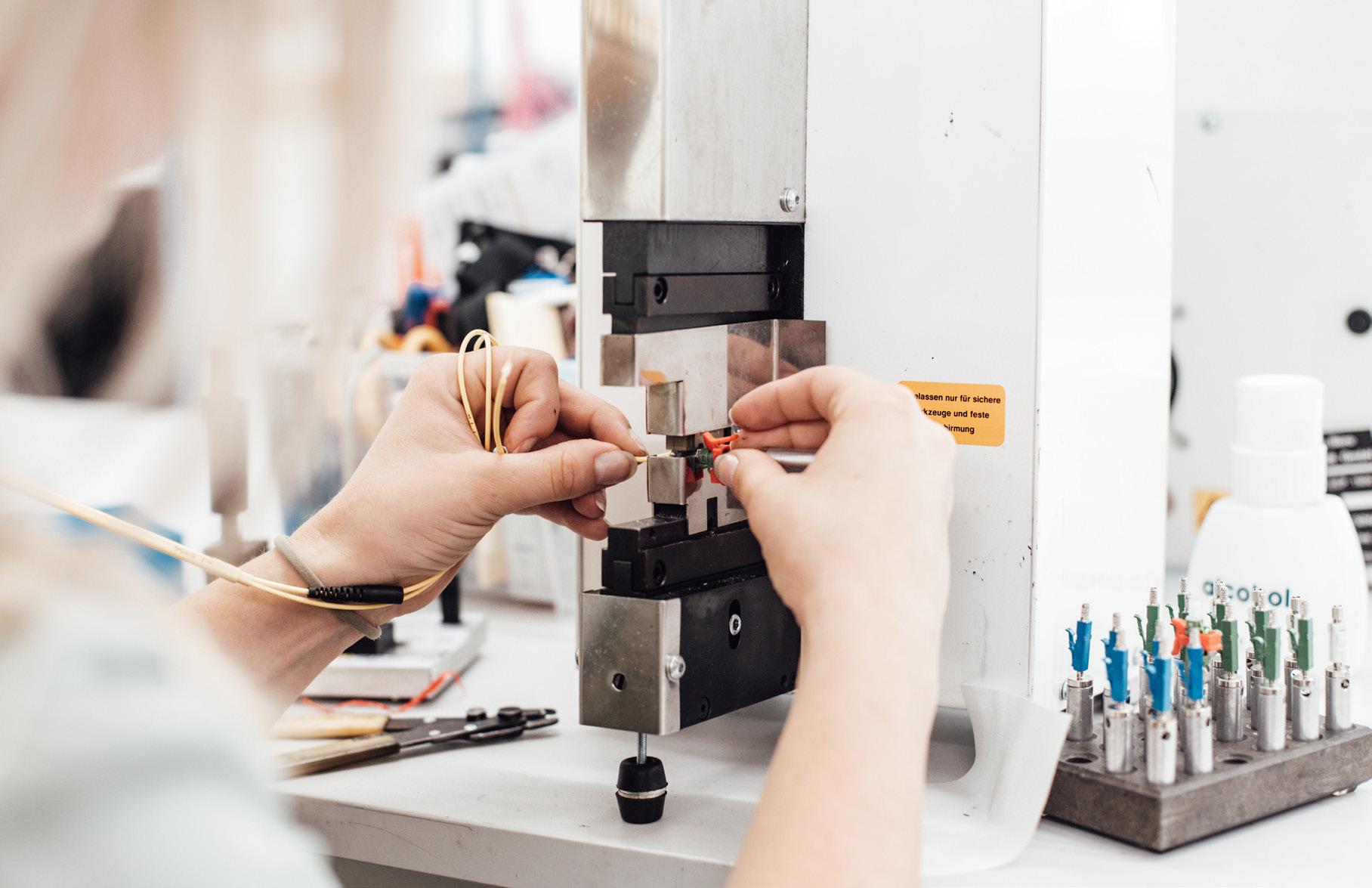
“The ISP has to pay a strong
percentage to the fibre network owner,” he explains, adding that a different, economical arrangement was more suitable than a traditional listing as asset managers are not interested in buying entire fibre networks, especially
those needing to build a new site or those with no potential buyer.
“We invested into that through a private mandate and we started to

look at what was the most efficient and effective way to allow asset managers exposure to this asset class.
“We provide the most effective and appropriate ways for our clients to invest into these networks. After reviewing the UK and USA, we decided that Real Estate Investment Trust (REIT) as a vehicle is the most appropriate way to do so. It is tax efficient and allows for gearing.
“We listed Africa’s first REIT in December last year. Our first tranche of investments was R120 million which we deployed by March 22. We deployed the second tranche of R150 million by the end of October. We are looking forward to deploying a third tranche of R500 million. It’s gaining speed quickly and has been really interesting. We have been figuring out how to make this asset class compliant with the REIT
structure and legislation. It took us a while to understand the tax implications as it hasn’t been done in Africa. We have had tremendous interest in the sector. It is a great thing to do for the country in terms of impact, democratising access to internet rather than it being very expensive through mobile data.”
Fibre rollout is expected to continue at pace in South Africa after the government missed a 2014 target of having a fibre connection at every house in the country by 2020. President Ramaphosa has assured that investment will continue in order to drive economic growth and build Fourth Industrial Revolution capacity.
The strength of the ESG principles is clear to see across Gaia’s major funds,
// IT IS A GREAT THING TO DO FOR THE COUNTRY IN TERMS OF IMPACT, DEMOCRATISING ACCESS TO INTERNET RATHER THAN IT BEING VERY EXPENSIVE THROUGH MOBILE DATA //
and the focus is unending, with the company providing funding that makes a real difference to the lives of people and communities in South Africa. Part
of the Gaia investment proposition is delivery of a solution that encompasses ‘positive, sustainable impact on Africa and its people’.
Currently, coal is by far the largest contributor to South Africa’s energy mix. Oil, natural gas, and nuclear are smaller provisions, and renewables make up a trivial percentage. The opportunity is enormous, and transparent funds are vital in ongoing development.
“It doesn’t matter what the UK and US are doing to stave off climate disaster – if Africa, 17% of the world’s population – decides to energise using fossil fuels, then you have trouble,” insists Snyman. “We are saying that the focus should be on Africa, with an effective eco-system working together where a developer knows that they can sell.”
His proposal is that those planning, developing, and operating renewable
We have partnered with leading manufacturers from across the globe to oer
energy assets must be able to sell at the right stage, and price, to ensure capital is reused and new projects can thrive.
“That secondary market in Africa is in its infancy and our fund concept is $200 million where we can buy interests in projects that have been developed so those developers can recycle their capital into new greenfield projects. That will start a snowball effect, with a vibrant ecosystem of people developing and funding projects, transferring skills, and selling projects.”
Efficiency and localisation in capital and project development cycle is essential he says.
“If you’re putting money into a greenfield project, you have to know who you are going to sell it to when it is operational, otherwise you have uncertainty and that is a real hurdle. There is a lot of focus on greenfield

We can help. Energy DC Power Systems Telecommunications Network Optimization Specialized Services
Key competencies in Design Development Local Manufacturing
Innovative Fibre & Energy Management Solutions
world class solutions
// WE ARE SAYING THAT THE FOCUS SHOULD BE ON AFRICA, WITH AN EFFECTIVE ECOSYSTEM WORKING TOGETHER WHERE A DEVELOPER KNOWS THAT THEY CAN SELL //
projects and everyone says we need to build more renewable energy plants in Africa, and that is obvious with 17% of the world’s population here but only 2% of the world’s infrastructure and renewable energy spending.
“Ghanaians should be running Ghanaian projects. They have a better understanding of risk in the country, and they need to know how to develop projects when the need arises in the future. A vibrant secondary market signals demand for projects and that draws people in to develop greenfield projects.”
At the end of 2021, Gaia entered the International Climate Finance Accelerator (ICFA) programme in Luxembourg. A unique two-year programme that accelerates emerging fund managers focusing on key areas within climate action, Gaia was
selected alongside four others – the only African organisation - to support brownfield clean energy projects to catalyse the development cycle and crowd in more actors at all stages of the development ecosystem, thereby providing widespread access to clean energy to fuel a vibrant and sustainable growing African economy.
In sub-Saharan Africa, access to electricity is required to rise above poverty, but around 600 million lack basic access. Just seven countries have populations where more than half are electrified. The result is that many businesses rely on expensive, dirty, unreliable generators to power operations.

“We are taking what we’ve learnt in Luxembourg and we will be expanding that into the commercial and industrial renewable energy space here,” says Snyman. “Where a renewable energy programme is dependent on
government issuing RFPs and a tender process, we ask what is the most effective way for our investors to gain access to renewal energy on rooftops and commercial buildings, or people
// WE THINK THAT ANY INVESTOR, IN ADDITION TO PROFIT, SHOULD CONSIDER THE IMPACT THAT THEIR MONEY IS MAKING. WE DON’T BELIEVE THAT YOU HAVE TO SACRIFICE ONE FOR THE OTHER //
who want to buy directly from big producers. We are busy formalising the structure and will probably list towards the end of 22/early 23.”
Going forward through 2023 and beyond, Snyman and team are keen to further embed ESG principles deep into the company’s culture, prioritising all three elements. Governance specifically is at the heart of discussions right now, following selection at the ICFA where Gaia was able to learn more about European regulations.
“In Europe, there are legislated requirements around reporting on your impact as much as you would on your financial status,” he says. “We have adopted that in its entirety as a good thing. Even though we don’t have to do it, we have decided that Gaia – subject to SA legislation with the funds we
manage – is going to report on impact in line with European legislation. As part of that, we have hired a new Chief Risk and Impact Officer to look at our risk from an environmental, social, governmental, and impact perspective.”
Gaia sees this as a point of difference and something that asset managers will compete on in the future. “It’s positive,” says Snyman “and rather than seeing it as a business hurdle we see it as competitive advantage. We think that any investor, in addition to profit, should consider the impact that their money is making. We don’t believe that you have to sacrifice one for the other. We know you can profit with a purpose.”

Today, ESG investing can accelerate market transformation, and these market-led changes can act as a force for good, on a large scale. ESG is not just about regulatory compliance – it
now incorporates transformation in business strategy, and is often a key enabler in profit maximisation. Gaia will carry on raising funds for the Fibonacci Fibre REIT, and Snyman is confident about the pathway forward.
“We have one large African government employee pension fund that has committed to investing. It’s positive for the country that we have these initiatives during dark times including the war in Ukraine, rising interest rates, stock portfolios being hammered, rolling blackouts – GAIA has a very positive outlook,” he concludes.
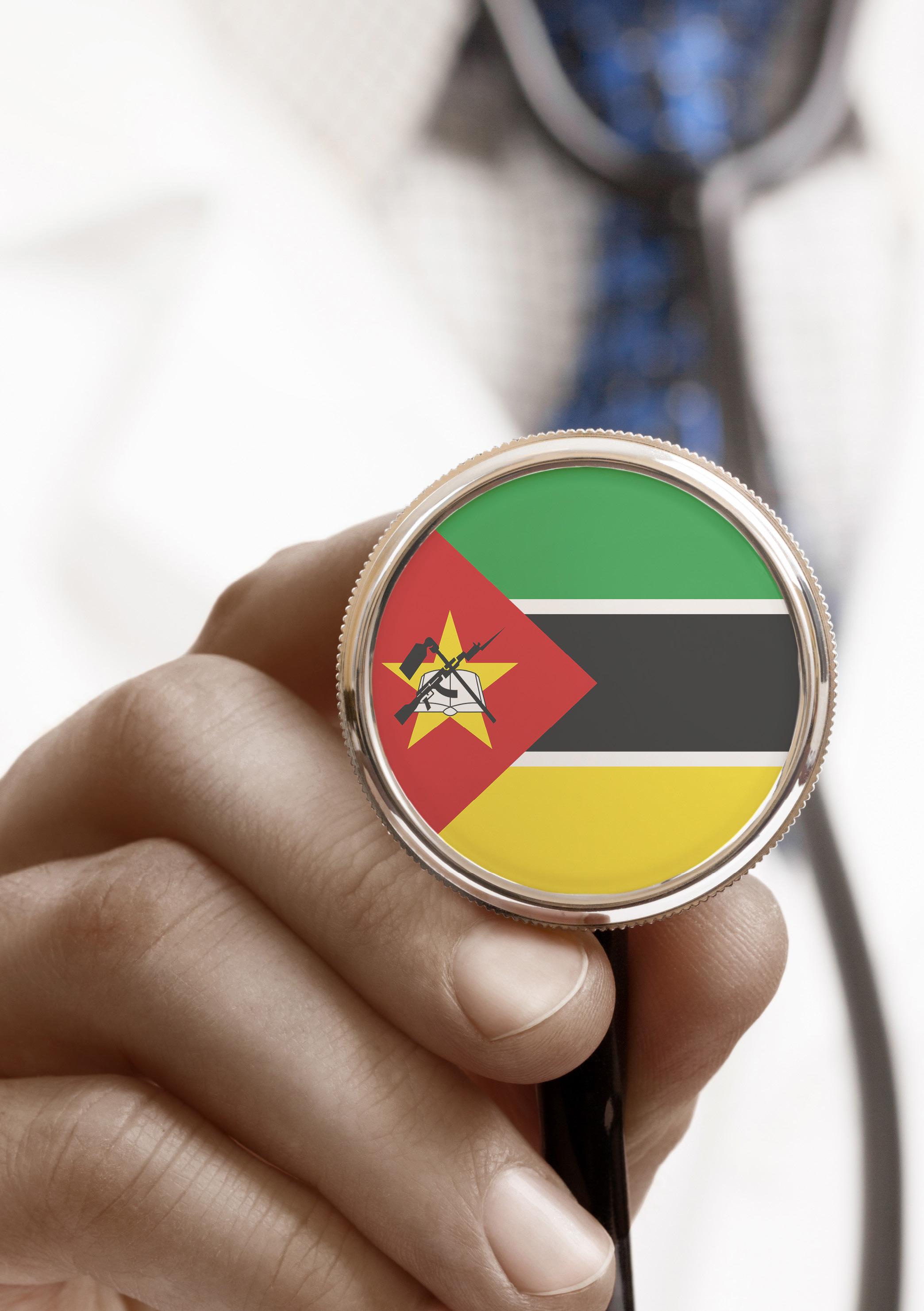

PRODUCTION: James Davey
Hollard Mozambique has launched a new health product aimed at providing complete and comprehensive cover for organisations and employees in the country. In a burgeoning market, something special is required to stand out as more look to seize opportunity. Bruna Quintas, Employee Benefits: General Manager and Lee-Ann Dobrescu, Manager: Hollard Health International, tell Enterprise Africa more about the company’s healthy ambitions.
//Perhaps one of the most appealing and potentialpacked sectors in Africa today, the health insurance market is rife with opportunity. In 2020, 70% of all premiums were paid in South Africa, leaving the balance of an almost $70 billion spread across 53 other nations. According to McKinsey & Company, ‘steady economic growth in most countries combined with a largely underdeveloped insurance sector have positioned the continent as the second-fastest-growing region for insurance globally after Latin America’.
Even through the Covid pandemic, industry commentators expected the sector to continue on a strong growth trajectory, perhaps slightly delayed rather than totally upended. CAGR of 7% was expected between 2020 and 2025 with Europe, Asia, and North America all facing slower growth.
Some of the big international players are already making moves; acquiring local companies, forming partnerships, and working with local brokers to enter underserved markets. But for Hollard – the largest privately-
owned insurance group in South Africa – growing on the continent, in complex markets, while solving problems and achieving a purpose, is a long-term plan that requires local knowledge.
In Mozambique, health insurance is nascent with the majority of the population not covered or underinsured. The country itself has weak health infrastructure with many forced to walk for more than an hour to reach the nearest facility. A skills shortage is also prevalent with highly qualified doctors and nurses (mostly expats themselves dealing with expats) centred mainly around Maputo. However, the past two decades have seen vast improvements with treatment for HIV/AIDS much more widely available, and protective measures against malaria – a serious threat in Mozambique – on the rise.
For companies active in Mozambique looking to stand out from the crowd and attract the very best people, against the backdrop of a challenging health environment, Hollard is bringing a new solution. For the past six years, Hollard Mozambique has
offered a health product in partnership with Cigna – a multinational managed healthcare and insurance company – providing extensive coverage to employees of some of the country’s biggest corporates. Now, Cigna and Hollard have decided to forge their futures separately in the African Health Insurance market. Hollard has revamped its offering to give clients both protection and freedom of choice. In its never-ending quest to be Mozambique’s favourite insurer, the company is proud of what has been achieved.
“We have grown steadily over the past years and we are now covering 9000 lives. We are number three in Mozambique by Gross Written Premium (GWP),” states Bruna Quintas, Employee Benefits: General Manager.
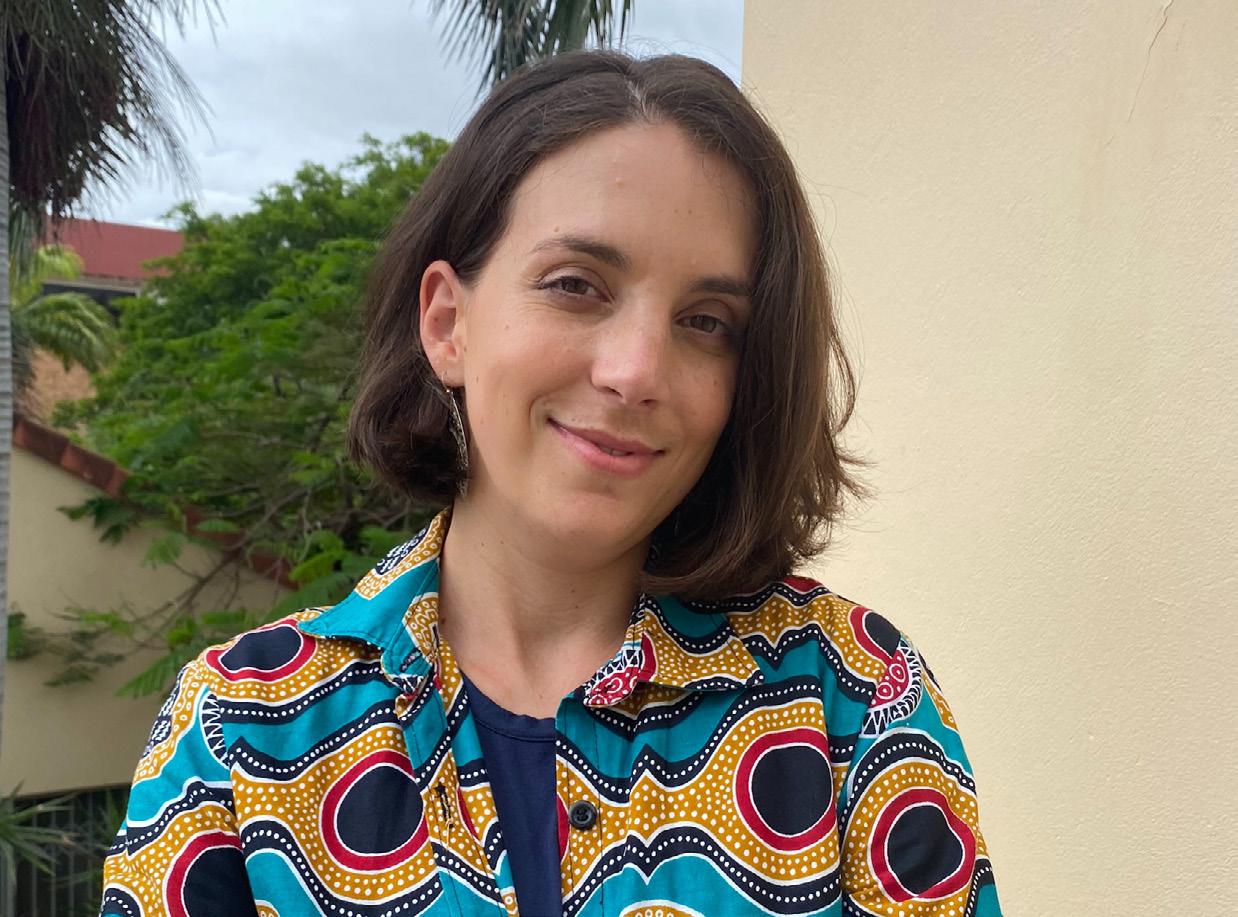
“It’s a comprehensive product covering almost every eventuality,” she adds. “We have now structured the product differently and we believe we are bringing something that will meet the needs of clients and members. We have a three-step product structure. Step One is basic, that includes inpatient coverage, condition management, wellness and preventative care, as well as evacuation and out of country assistance. A significant change that we have made here is removing the sublimit for wellness and preventative care, which used to range from $200-$1000. This is in support of our commitment to the well-being of our members and to ensure that they live fully in good health. Here, we have five options starting from $75,000 all the way up to $10 million per member, per year.”
Condition management includes treatment for chronic conditions (as well as cancer, HIV, kidney dialysis, and more). “Unlike many competitors, chronic condition prescriptions do not come out of your outpatient limit,” says Manager: Hollard Health International, Lee-Ann Dobrescu. “Whether you are treated in a hospital or specialist clinic or have monthly medication, that all
comes under this first basic step and the higher option limits offered. We are trying to ensure that we have taken care of the most challenging health events in Step One. Even if you’re just trying to live a healthy lifestyle, if you take Step One, you already have a comprehensive approach to your health and wellbeing.”
Step Two includes outpatient care, and Step Three includes dental and vision. “It is marketed to corporate and commercial clients, and it is only available to employers for the benefit of their employees and their dependents,” says Quintas.
The modular nature of the product allows clients to pick and choose the level of cover they want across the three steps. This allows them to tailor their
benefits to their budget and the specific needs of their employees. By being able to offer international standard cover, employers in the country can attract and retain talent, ensuring their health and wellbeing is completely catered for. With the limited number of healthcare professionals in Mozambique, Hollard will leverage their panel of medical expertise to support the doctors in providing members information on what to expect and how best to manage their condition. Treating people with empathy, care and dignity is what separates a good doctor from others, and what differentiates a favourite insurance company from the pack.
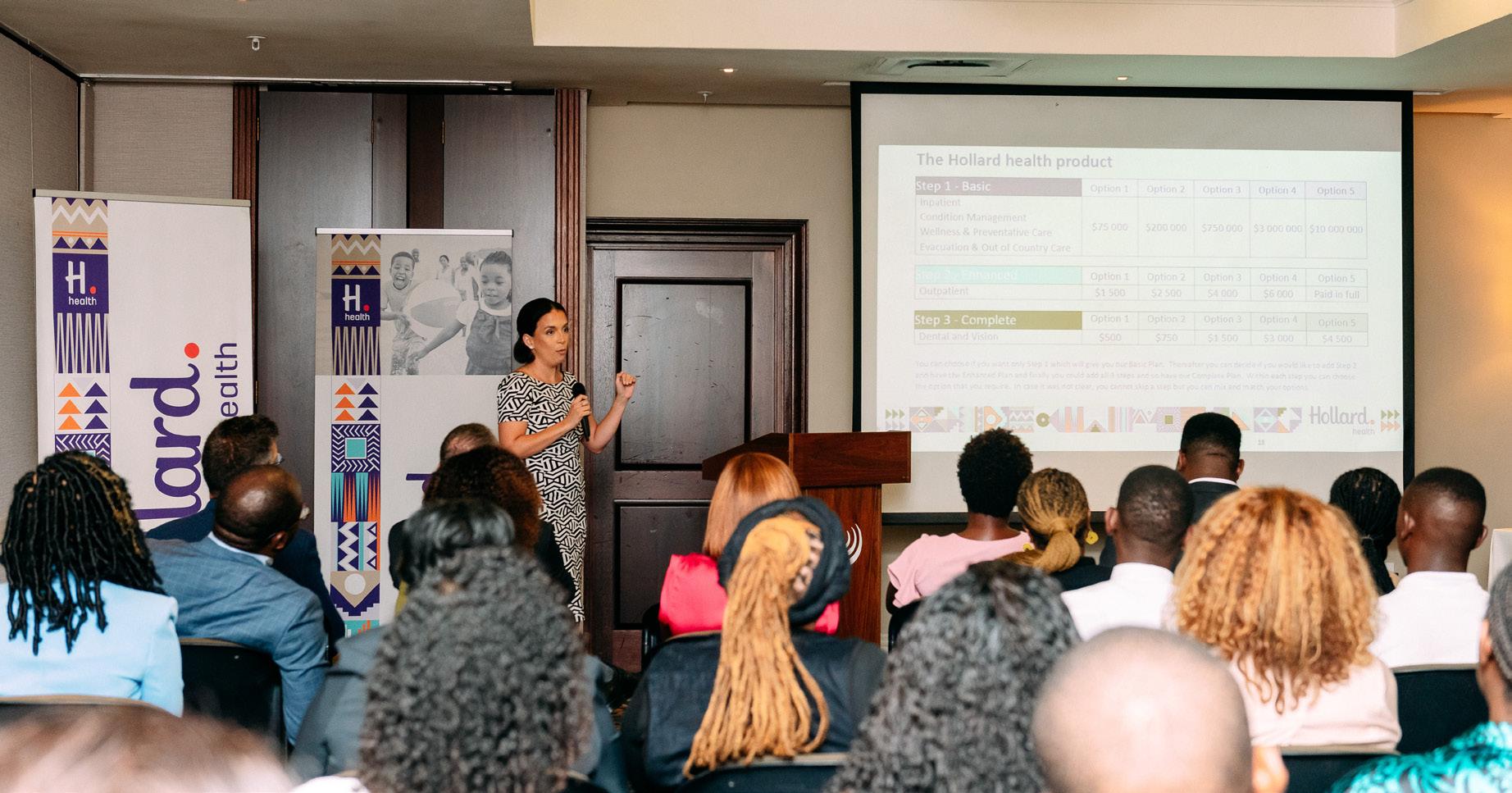
“As Hollard Health, we are committed to this market,” says Dobrescu. “We have made changes to our product based on the feedback we have from our customers. We have made sure we deliver a combination of fabulous digital tools, empowering people to take charge of their health and wellbeing, as well as the important human touch. When big things happen,
real people, with real expertise will guide our members every step of the way. We take care of the details so they can focus on recovery. Our time in health has shown us that it is about way more than paying the bill.”
With clients, mostly recognisable industry leaders, a comprehensive product is required. These multinational corporations must be able to serve staff with an offering they know will protect and provide for in tough circumstances. In Mozambique, where health and education are among the basic services unevenly delivered across the country, a partner that is proven is welcomed. Hollard Mozambique has 20 years of experience, understanding local conditions and building relationships across the fertile country.
“We are looking at employed individuals and we are looking at employers who want to ensure they can attract and retain the most talented individuals,” confirms Dobrescu. “We do particularly well in industries where
// OUR TIME IN HEALTH HAS SHOWN US THAT IT IS ABOUT WAY MORE THAN PAYING THE BILL //
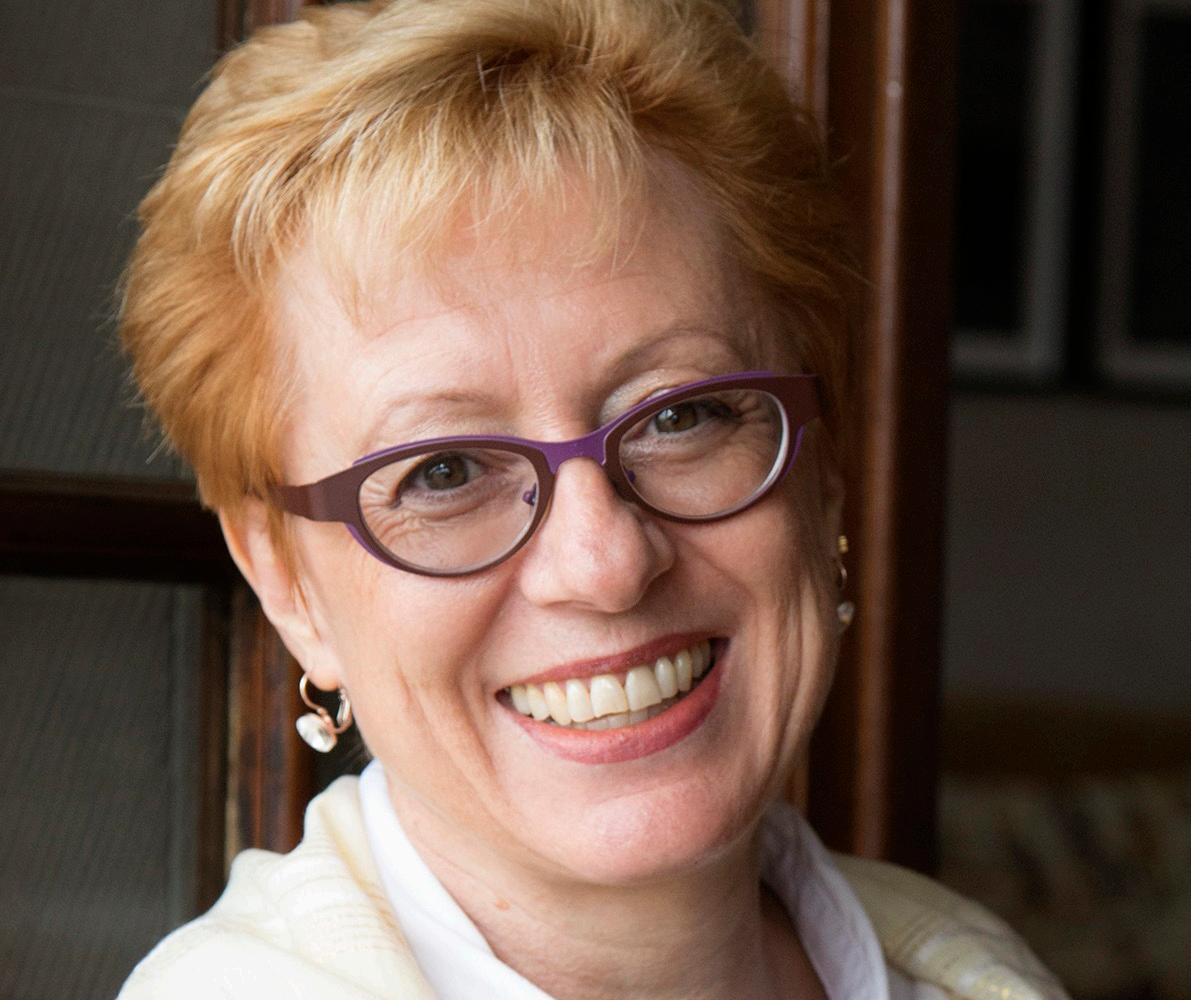
expertise and knowledge are required. Where you have to attract the best skills, you must ensure you are offering a good mix of benefits. This speaks to providing those rich benefits as well as making sure you get access to care outside of Mozambique where required. Because it’s international, if the care is not available locally, we cover the costs of access caring outside of Mozambique. You can also choose to have an area of cover that is wider than just Africa. You might be an expat employee and you want to know that if you are ill, you can return home to be treated by a facility you know and trust. If you regularly commute between another country and Mozambique, you can choose
to be covered in both locations.”
Currently, most European nations including the UK, France, Germany, and Portugal advise on insuring heavily when travelling to Mozambique. But costly travel policies are not suitable for those living and working in the country, looking to safeguard livelihoods and families. Protection must be developed by those who understand the local market, and that is why Hollard Mozambique’s offerings are tried and tested in Mozambique, by Mozambicans.
“Our vision is to be Mozambique’s favourite insurer,” states Quintas. “To grow, we are going to listen to our clients. That is what we have been doing and that is why we have been successful
over the past six years. We have a strong international backing and we have the knowhow to provide quality services, but providing an excellent member experience comes from listening. Where we need to update our benefits, we do so. Where we need to update our services, we do so. Feedback from our clients, broker partners, and our providers – the hospitals, is key to continuously improving our offering,” she says, adding that the company is focussed on a win-win-win mentality.
Already strong in the digital space, doing amazing things across its specialist lines – including agriculture and energy – Hollard Mozambique will not ignore the health space when it comes to digitisation. A new app, designed to encourage members to be healthier, is being launched which could help the company to offer further rewards and lower premiums. Hollard Healthier sees that members are able to obtain multiple health markers through a simple selfie.
“We are giving people information to ensure they can be a little healthier every day and every week,” smiles Dobrescu. “It’s advanced technology where you take a scan of your face using your phone and you can find out your blood pressure, heart rate, risk of stroke, and more, before giving you a personal plan to ensure you become healthier while being rewarded along the way. We want to make sure people feel engaged with their health. Health is the new wealth, and we are committed to helping people live their healthiest lives. Our focus is on ensuring the people of Africa become as healthy as they can be.”
The policy also includes 24/7 access to a doctor through the members Hollard Health App, where they can quickly organise telephone or video consultations delivered by Teladoc. An international partnership,
Continues on page 88
// WE ARE GOING TO LISTEN TO OUR CLIENTS. THAT IS WHAT WE HAVE BEEN DOING AND THAT IS WHY WE HAVE BEEN SUCCESSFUL OVER THE PAST SIX YEARS //Lee-Ann Dobrescu, Manager - Hollard Health International

Continued from page 86
this arrangement is an indicator of the company’s desire to bring global solutions and tailor to local problems, while simultaneously growing.
“We are managing to scale across all of Africa and that makes everything sustainable and our pricing for administration more realistic. Sadly, in Africa, many markets are too small to make sense on their own when it comes to delivering complex administration so we have consolidated and we handle the delivery on the back end from a single platform and that is what makes us more sustainable, across the 12 countries where we offer admitted solutions,” says Dobrescu on plans to roll out their health product to more and more countries across Africa.
“We have learnings which we are taking forward to ensure we have a
sustainable offering. Ensuring that we are profitable in the long term and leveraging our scale across Africa means we will be able to consistently, over many years to come, continuously evolve and find a better way to deliver the best member experience possible.”
Locally, the hope is that more Mozambicans can take up the health product from Hollard. Right now, a premium product in the market, this group health offering should be made available to a wider audience agree Quintas and Dobrescu.
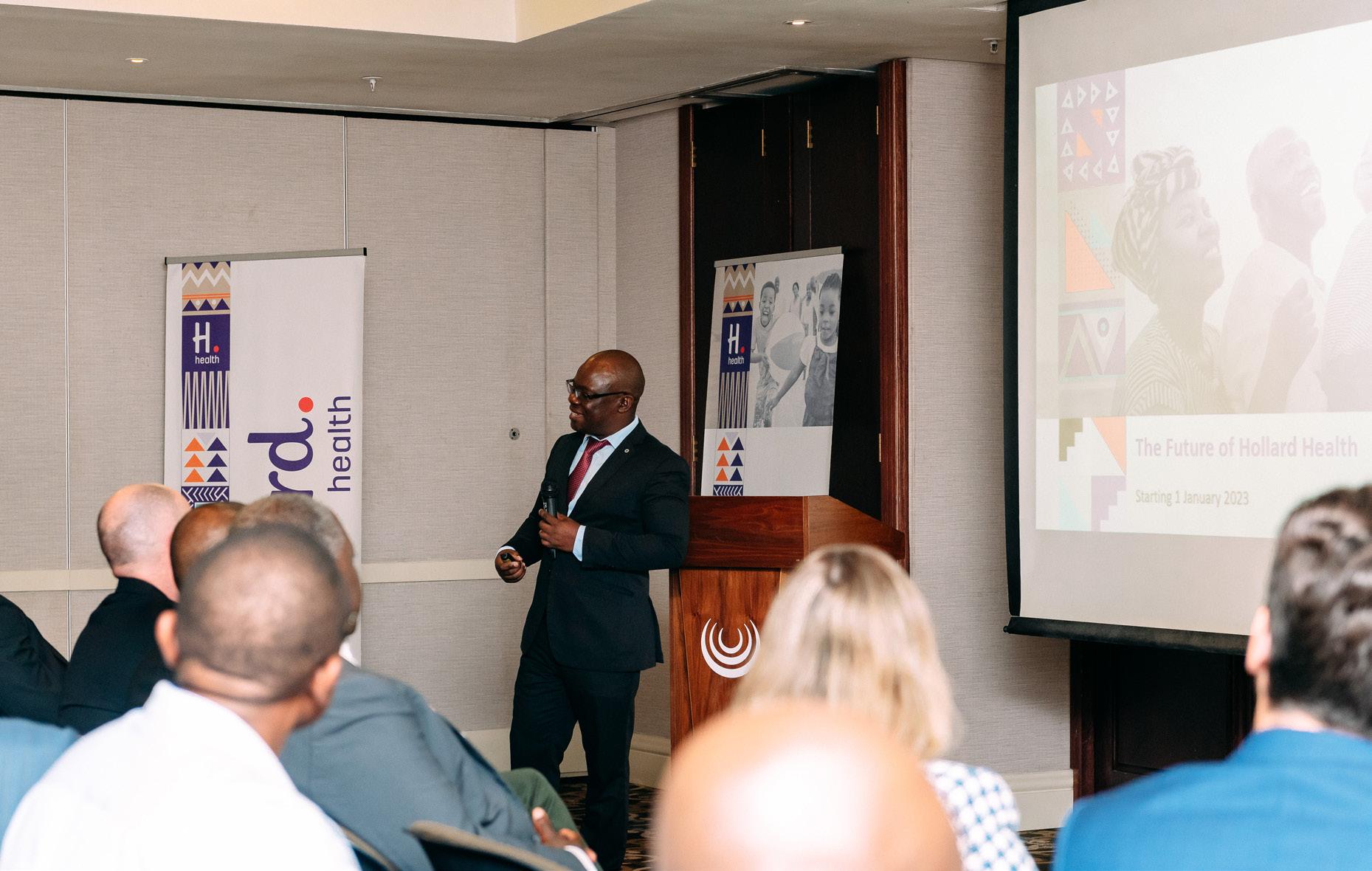
“Currently our clients are multinationals and large corporates. We have a medium-term view to introduce a product that we can offer to SMEs to increase access to health insurance in Mozambique,” says Quintas.
“Over time, in order to secure
our place as Mozambique’s favourite insurer, we need to be a favourite to the full ambit of people who want health insurance,” says Dobrescu.
“We want to service a broader range of consumers in Mozambique using a nice mix of smart technology as well as treating people with care and dignity which aligns with the Hollard purpose. If you can get the balance right between great technology alongside the human touch when people need it, our research shows that is what people really want.”
Competitors in the market are strong with big budgets, but often lacking the local knowledge of Hollard. ‘By Africa, in Africa, for Africa’ is one of the company’s core principles, and this is why it is aware of the need to include maternity care within Step One, and how it knows that psychiatric and psychological care
are more desired than ever before as part of an overall health offering.
“We always use local knowledge to refine and enhance products so that we meet the needs in given markets. We have a great mix of internationalised best practice combined with local knowhow, insight, and relationships,” confirms Dobrescu, a Hollard veteran of more than two decades.

“Hollard is an African company and we are not going anywhere. We are in this market to stay,” she adds. “We are building our business all the time, and we are only going to increase what we do across a range of products and propositions. We are going to build our health proposition to serve a broader range of the community to meet the needs on the ground, learning and growing as we go.”
In 2021, The Financial Sector
Deepening Moçambique (FSDMo) found that 11% of the population was formally insured and 6% was informally insured but coverage was often limited to funeral, personal accident, crop and credit life, with just two providers offering a hospital cash plan. Clearly, like the rest of the continent, there is a wide-open space in the health insurance sector, both for individuals and employee benefits. “Health is the fastest growing insurance product and the largest by premium volume in Mozambique and is therefore high on the priority list for the company,” says Quintas.
Healthcare in Mozambique is at a crossroads. Building on the past 20 years of progress, embracing technology, and adopting new funding models will help the country to grow. But lacking support, infrastructure, and information will result in stagnation. For Hollard Mozambique, where collaboration is key, the wider development of the economy as well as servicing of clients to world-class standards will continue through a mix of innovation and technology, all aimed at providing the best care in Africa.
“We want to be sure we leverage
technology in a way that ensures you get the right access to care. It’s a product you buy and consume from day one and the opportunity with technology is more around the delivery of the care. That is where we see the opportunity going forward,” insists Dobrescu.
“We are in health for the long haul – this is just the beginning of what we are doing in health,” smiles Quintas.
The Deloitte African Insurance Outlook for 22 stated that for the wider continental insurance industry, ‘even though the waters are by no means calm it is clear to see that the industry has reset its course to profitability and growth’. With so much more data available in the health space, a symbiotic relationship is growing between client and insurer. For the likes of Hollard Mozambique, where quality care is the top of their agenda, the fabled win-win-win is now more achievable than ever before.
// HOLLARD IS AN AFRICAN COMPANY AND WE ARE NOT GOING ANYWHERE. WE ARE IN THIS MARKET TO STAY //

South Africa’s banking sector is once again led by Standard Bank in 2022, retaining its position as the biggest bank in the country based on capital ahead of the likes of FirstRand and Absa. At Standard Lesotho Bank (SLB), a comprehensive digital strategy to improve customers’ accessibility had been instigated long before the global outbreak of coronavirus, with cloud adoption and platform banking marking two of its major current journeys. “Lesotho is our Home, and we drive her growth,” SLB proudly proclaims.

Operating since 1995, Standard Lesotho Bank (SLB) currently employs close to 1,000 members of staff and has a national footprint in all the districts of Lesotho via a network of 18 branches, as well as specialised units that house
the Head Office, Data Recovery and Operations Centre. The bank has a system of over 707 Point-of-Sale Machines and 93 ATMs strategically placed throughout the country, and in 2018, also rolled a fleet of seven Bulk Cash Deposit Machines enabling businesses to deposit cash at any time.
“Our vision is to be the preferred and leading financial services provider in Lesotho,” SLB opens. “But we’re more than just a bank: we look beyond the financial outcome to create more value socially, economically, and environmentally. As a leading Africa-focused financial services organisation, Africa is our home, and we drive her growth.”
Part of the Standard Bank Group, Africa’s largest by assets, SLB provides
the full spectrum of financial services offered through two major divisions: Corporate and Investment Banking (CIB) and Personal and Business Banking (PBB), with the CIB division additionally fulfilling a wide range of requirements for banking, finance, trading, investment, risk management and advisory services. The PBB unit offers banking and other financial services to individuals, small-to-medium enterprises, and commercial businesses.
Having been rocked by the passing in October 2020 of CEO Kenrick Cockerill, who leaves the legacy of a dedicated, decorated 32-year career with the Standard Bank group in which he had held several key leadership and specialist roles, Anton Nicolaisen stepped up to assume the position in March 2021. Appointing a successor to a role of this import represents a colossal challenge in the best of circumstances; amid this tragedy and tribulation it becomes near-insurmountable.
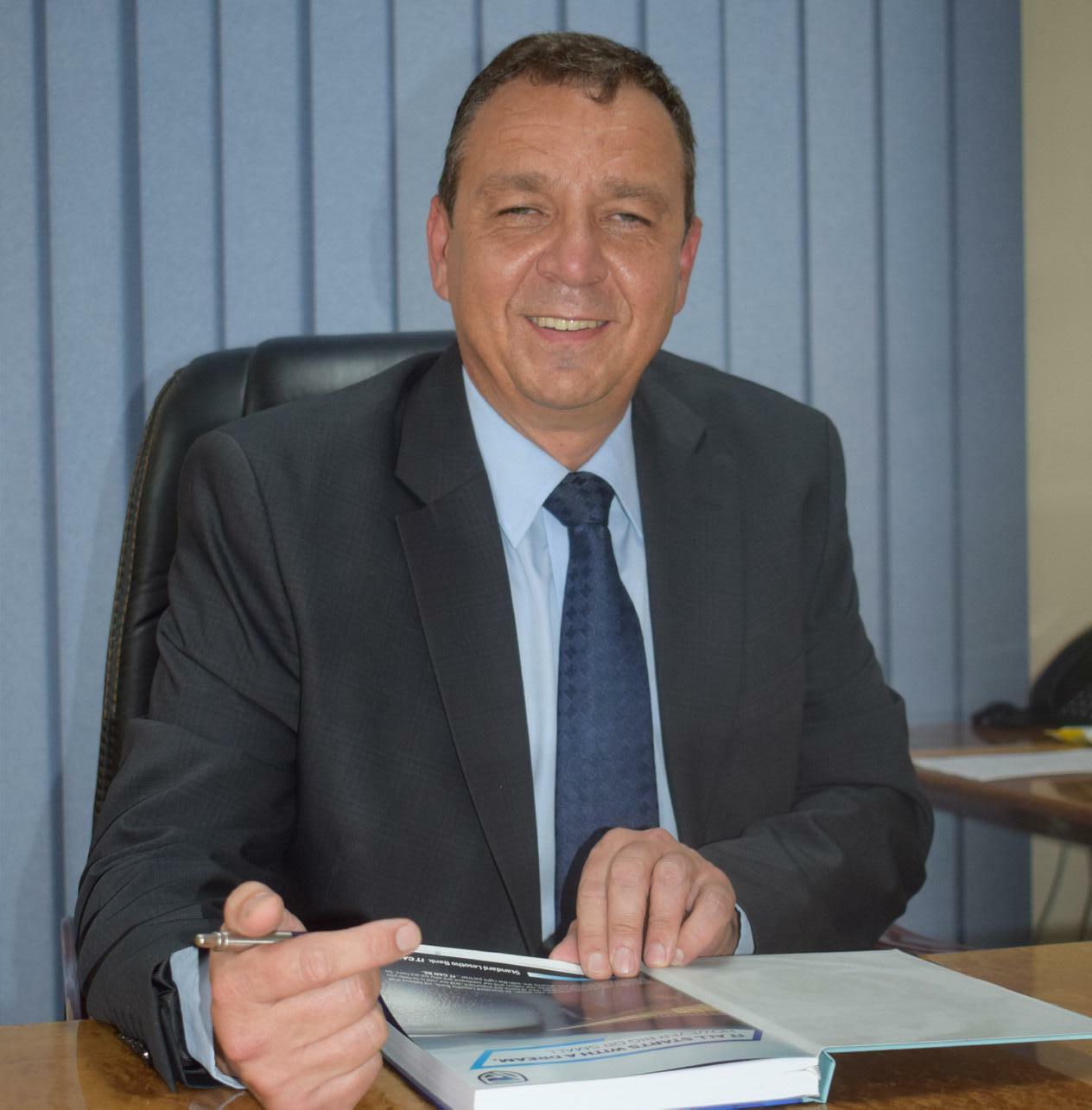
As he detailed last year, however, Nicolaisen is a self-confessed ‘career banker’, himself accruing a rich, deep vein of experience over a more than 30year history with Standard Bank Group, always having dreamed of exposure in other geographical areas than South Africa alone. “One thing I always tell people both within and outside of the Standard Bank Group,” he disclosed, “is how many awesome opportunities are there waiting to be seized, to allow you to live out these dreams.”
Most recently deployed in Gauteng, following his move to Lesotho Nicolaisen was immediately able to assess and compare the two modes of operation last year, drawing some surprising conclusions along the way. “As might be the expectation, in the South African context there are certainly some things which are further ahead,” Nicolaisen says, “but actually, I came into Lesotho and found that
Continues on page 92
// AS A LEADING AFRICA-FOCUSED FINANCIAL SERVICES ORGANISATION, AFRICA IS OUR HOME, AND WE DRIVE HER GROWTH //Anton Nicolaisen, CEO

Continued from page 92
other aspects of the business are moving forward much more quickly.

“I have learnt never to assume that one will automatically be better than the other, because there were some very distinct advancements that the Lesotho team had made that were brilliant.”
The economic environment of the last 12 months has been extraordinarily difficult, with consumers under inflation pressures, Nicolaisen explains. “In Lesotho transport contributes a significant percentage to the overall financial basket, and a big part of our population is very dependent on public transport; those prices rising only amplified this pressure. Fortunately, our asset book and our bad debt remain very healthy at this stage.
“From a Lesotho perspective, financial inclusion is something that we are driving very hard, and which is backed by both the government and the central bank. A pricing directive was implemented and had a marked impact on our revenue, and we

were forced to counter that by being more innovative in our approach to serving our customers differently.”
“Customer service is hugely important, and understanding our customers and their changing demands better is critical. Ultimately, we would like to become much more flexible in terms of our offerings and make changes a lot more quickly.” Given the benefits
of agility, flexibility and scalability at low infrastructure and computing costs, it is little wonder that Nicolaisen is able to detail to us SLB’s fervent adoption of cloud technologies.
“Embarking on our cloud migration journey has represented one of our major investments from a technology and investment point of view,” he relays. “Cloud will assist us massively in terms of the value that we will create from having up to date systems and
the software we have available.”
Another of SLB’s key journeys that Nicolaisen wishes to zero in on concerns personalisation, and a landmark partnership with Salesforce, the world’s premier customer relationship management (CRM) platform. It marks a key step in its bid to become a true platform business and deliver positive digital experiences to its clients, he affirms.
“It is a major step towards transforming the Standard Bank Group into a client-centred platform business that delivers a range of individualised, instantly available solutions, services and opportunities,
enabled by modern digital technologies and delivered in whatever way a client prefers,” Nicolaisen explains.
“Our goal is to use our data capabilities to build deeper, better, and more enduring relationships with our clients. Our aim is to be able to digitise and create much more current solutions in order to migrate our customers out of our branches, and onto self-serving platforms. We want to really maximise our use of the digital approach, and we see our platforms as a key way to reach customers especially in the rural areas.”

Nicolaisen stresses the importance of platform banking, and the desire to move toward this model. As the banking sector digitises, platform banking is a technologically- enabled integration of traditional and digital banking, fintech and third parties that transforms the traditional paradigm into a customercentric one. “We want to be a digital, platform-based bank, and we want to achieve this by 2025” he stresses.
“We want inclusivity and we want our customers to use our platform. In
Lesotho, our aim is to reach each and every citizen in the country in some way.” In this bid to increase financial inclusion among citizens of Lesotho and stimulate economic growth for informal markets, SLB has introduced the UNAYO platform, a low-cost, one-stop platform that can be used as a vehicle for growing businesses, providing economic growth for the community and ultimately making individual and collective dreams real.
“As a financial services provider, we are constantly trying to find new ways to deliver our brand promise by enabling business growth and empowering our communities,” rounds off Nicolaisen. “The arrival of UNAYO addresses the need for financial inclusion in our country and has given us the opportunity to increase customercentricity, by continuing to engage and give impeccable service to all.”
// WE WANT TO BE A DIGITAL, PLATFORMBASED BANK, AND WE WANT TO ACHIEVE THIS BY 2025 //
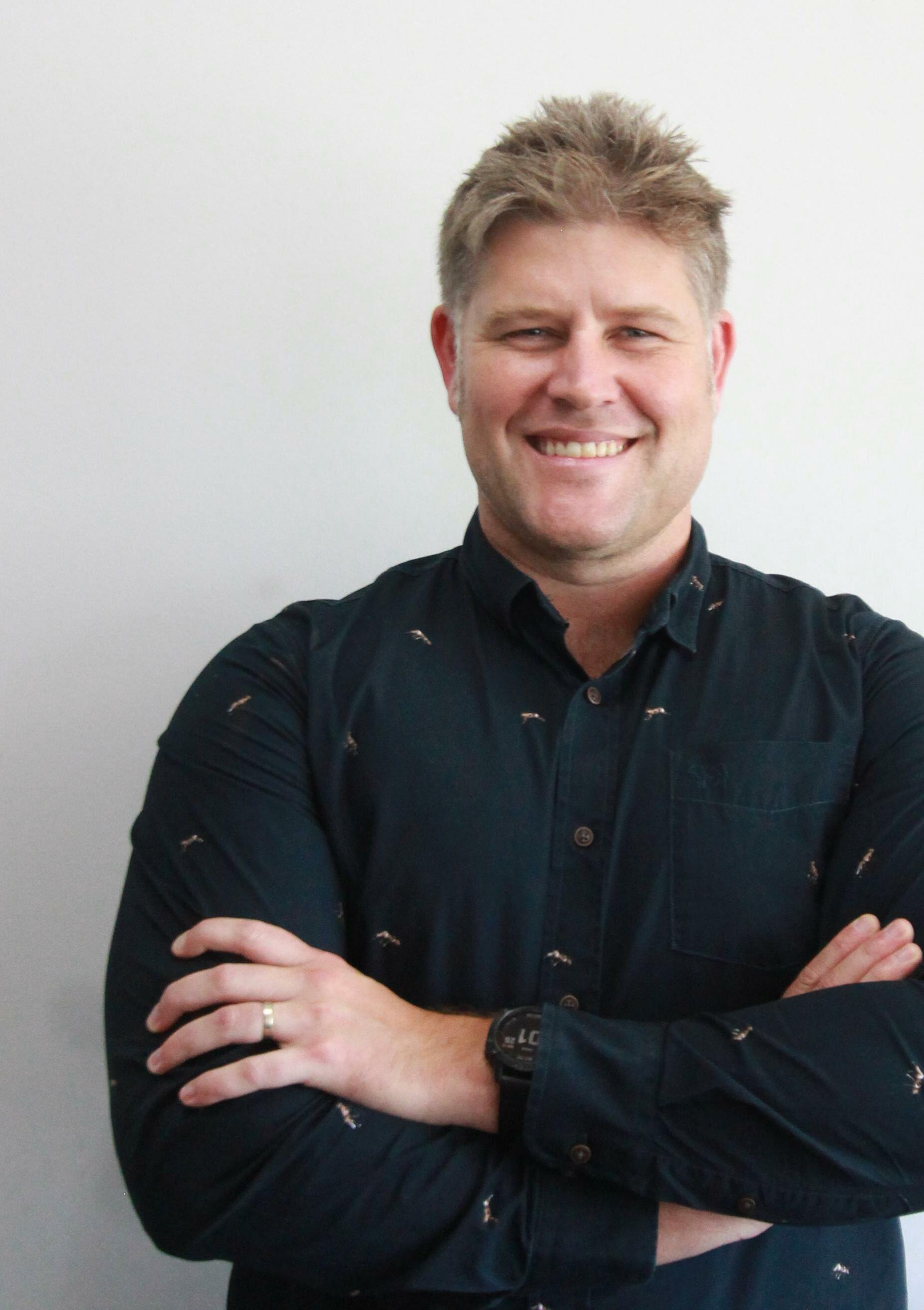 Steve McNabb, CEO
Steve McNabb, CEO
EduPower Skills Academy, part of the Daly Group, is bringing a whole new generation of South Africans into the workforce as part of a booming Business Process Outsourcing industry. CEO Steve McNabb tells Enterprise Africa more about this ambitious and innovative business that backs skills development and entrepreneurialism to get people into the labour force.

In South Africa, the official unemployment rate for the second quarter of 2022 sat at 37%. The situation was worse for women where stats suggest 47% of women are economically inactive –almost half of all women of working age in the country. For those that can find a way into the labour market, prospects are bleak. Many face inadequate earnings, low productivity, and difficult work conditions.
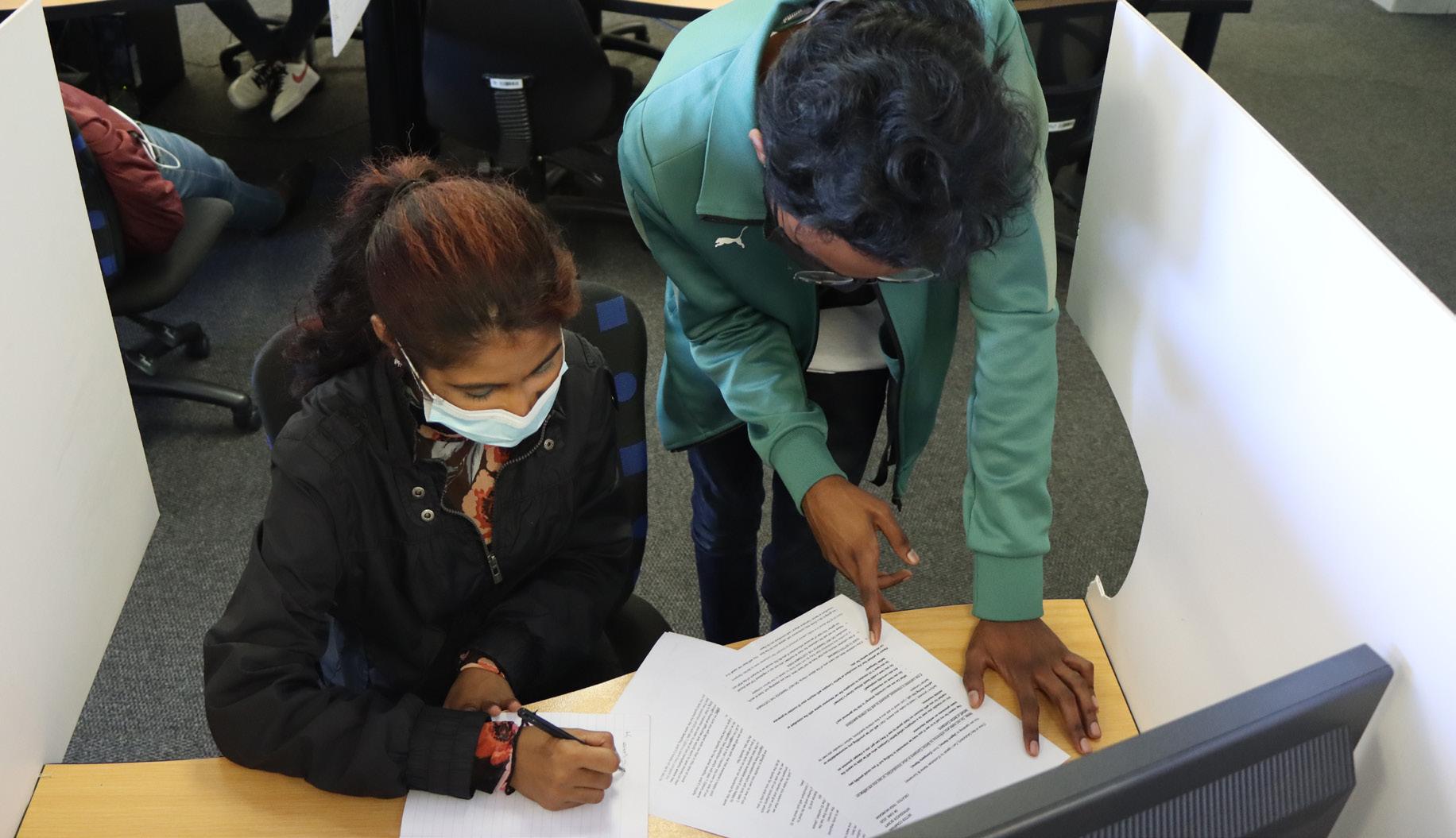
The government’s multi billion Rand budget for education and training for the year is important but leaves much room for improvement. Business and the private sector is where much of the progress is happening. Corporates invest heavily – both for their own long-term security but also to leave a positive mark on the communities in which they operate.
But it’s not always easy to achieve results when your core business is far from education and upskilling – especially when
faced with legislative scorecard pressure from the government. Thankfully, there are institutions that understand the local market, and have a deep knowledge of what is required to succeed in South Africa. When these organisations put their skills and experience where it is needed, great things happen, and new doors are opened.
The EduPower Skills Academy was borne out of the need to create employability in South Africa and to do so in two of the most important channels – this being BPO/Contact Centre industry and in informal sector entrepreneurship. The BPO sector is recognised as one of the few growing market sectors in South Africa with the rapid growth in International offshoring to the country. The entrepreneurial channel being a key job creator in the informal sector.
“In the beginning, it was just Daly Credit Corporation and RL Daly Attorneys Incorporated. I joined
eight years ago, and we have since expanded in different directions with EduPower being the most notable,” explains Group CEO, Steve McNabb.
Working for the country’s big banks, retailers, and other corporates, the Daly Group was required to meet transformation targets and realised that there was a gap in the market for a focused player with transparency and clarity.
// WE HAVE ALWAYS HAD A VERY FOCUSSED SKILLS DEVELOPMENT AGENDA AND WE UNDERSTAND THE PROCESS //© Graeme Williams
“We saw an opportunity to become a player in the BPO industry, and with BPO being such a large contributor to our economy there was an opportunity to take large cost centres and turn them into large profit centres. We wanted to take our IT department and our legal department and shift them into their own entities so that they could serve external clients. It was about diversifying and creating more revenue streams to spread risk across the group,” says McNabb.
A chartered management accountant, previously working for Unilever and other big-name corporates, McNabb was able to see the opportunity around internalising spend while attracting existing corporate clients to understand the benefits provided by EduPower.
“We have always had a very focussed skills development agenda and we understand the process.
Government gives you some assistance through grant funding, and we would previously use that for an external training provider.
“We hired Rajan Naidoo - the MD of EduPower - and he came with Sector Education and Training Authority (SETA) experience, understanding how to run these programmes,” McNabb details. “He came to me one day with the idea that we should create a new business – an academy that can provide accredited skills that we currently use our annual grant with third parties for.”
Management loved the idea and acted quickly, bringing in quality trainers and partnering with reputable external instructors. Initially, EduPower served internally only, training Daly Credit Corporation staff.
“Consultants in the transformation space then came to us and said they liked our model, and said it could fit some corporates – big,
listed multinationals that required assistance,” remembers McNabb.
The company grew quickly, and is now recognised country-wide for its contribution and delivery of professionally supported accredited skills training, and coaching and mentorship programmes that prepare learners for the working world.
BBBEE regulation offers points for companies that spend a certain percentage of total payroll on accredited training and learning programmes that target the upskilling of previously disadvantaged demographic groups. Often, disabled, black, female employees are targeted as companies look to bolster their scorecard credentials and access lucrative government or national contracts.
“They have to make this annual compliance spend,” says McNabb
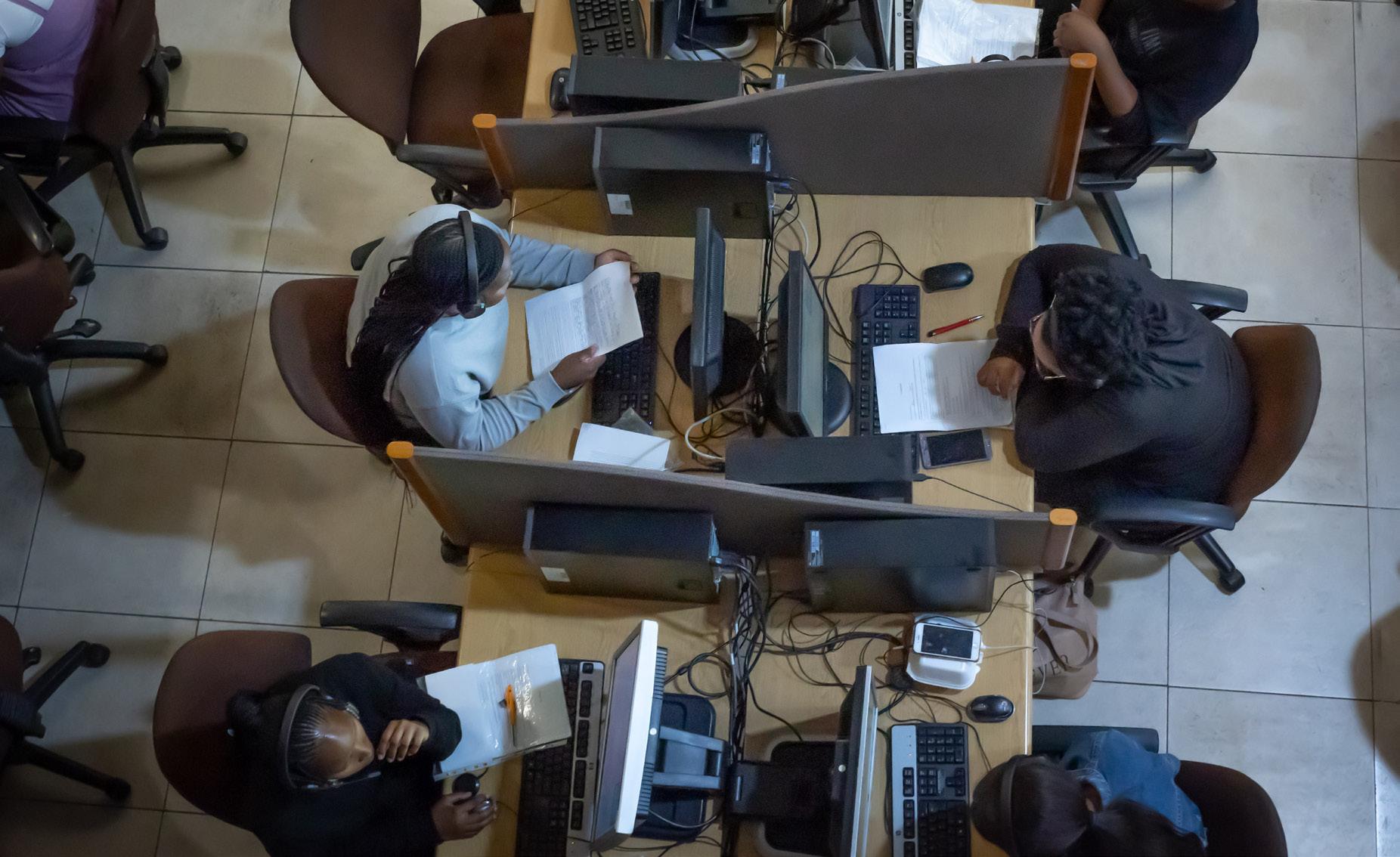
of corporate clients. “If they don’t then they will lose points on the B-BBEE scorecard and fall out of the race to participate in business in South Africa. We provide a solution that takes the administrative, practical, and operational burden away from the client and channel it towards changing the lives of South Africa’s vulnerable youth.”
For example, a multinational automotive corporate could be mandated by government to upskill 1000 learners per annum, but with slow economic growth and businesses facing challenged commercial conditions, this could be unrealistic to implement. Partnering with EduPower makes requirements easier to achieve, and simpler to manage.
“Clients get their skills development annual mandates taken care of by us in a way that doesn’t impact their business at all,” highlights McNabb.
“However, the youth are the
big winner,” he adds. “They can be disenfranchised or vulnerable and we give them education, experience, and assistance in getting into the industry or creating their own business. Under the care of our mentorship team, we help them create companies that are a going concern, and they exit with a running business. Usually, they would hire more people and that is a massive win for the country, the learners, and their families.”
The company’s core upskilling promise focuses on the Business Process Outsourcing (BPO) industry. Calling on its experience set deep in the Daly Group, EduPower can deliver relevant skills for all aspects of BPO including quality assurance, surveys, lead generation, customer service and telesales.
McNabb believes this is an industry home to major potential for the country as one of the last surviving sectors that will rely on people. “Most are downsizing and looking for efficiencies through tech
where BPO companies are growing significantly with employable youth being the constraint to this potential.”
Currently, EduPower is home to 1400 learners and has strong ambition for future growth. eventually, the company hopes to manage 6000 learners each year, with those making a big impact in their communities and families.
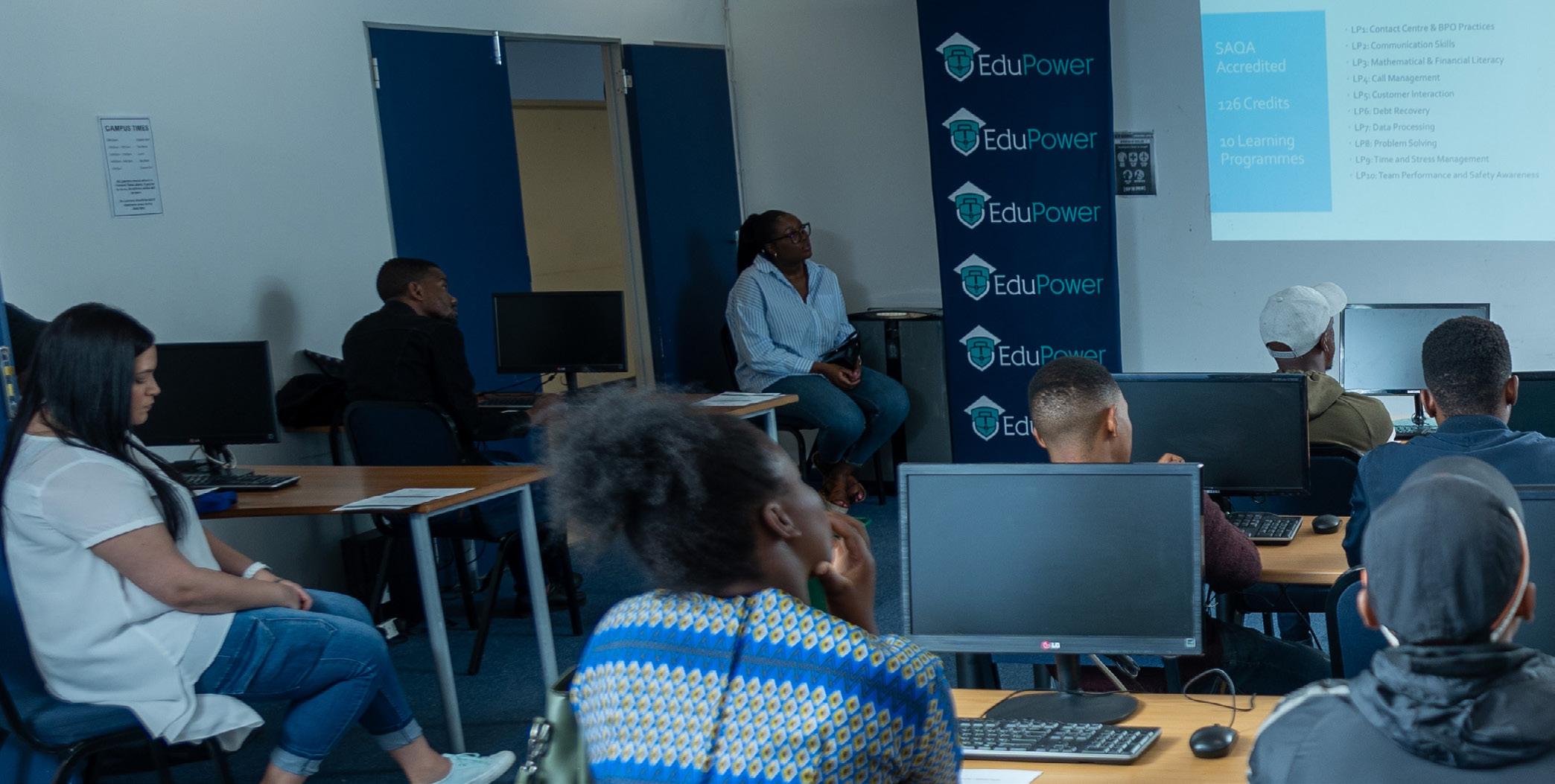
“Our country is on its knees with unemployment and there is cost escalation like you wouldn’t believe. That, coupled with mass unemployment, is a recipe for disaster and we want to be a solution to the problem,” states McNabb.
Active nationwide, the company can assist clients of every shape and size, whether major international mining house, continental insurance corporate, national airline, or provincial state department, EduPower’s range is one of its key strengths.
“We have a new space in the
Northern Cape where we are working with a large mining company who has a mandate to complete community upliftment projects but they struggle to find the route to channel that. Our service there is to take a brand-new job sector into a place that only has mining. That brings all sorts of socio-economic
advantages such as keeping family units together, taking criminals from the street, and more,” says McNabb.
The town, Kuruman, in the Northern Cape is home to a large manganese mining operation and EduPower has established a small call centre for leaners to undertake NQF Level 3 qualification,

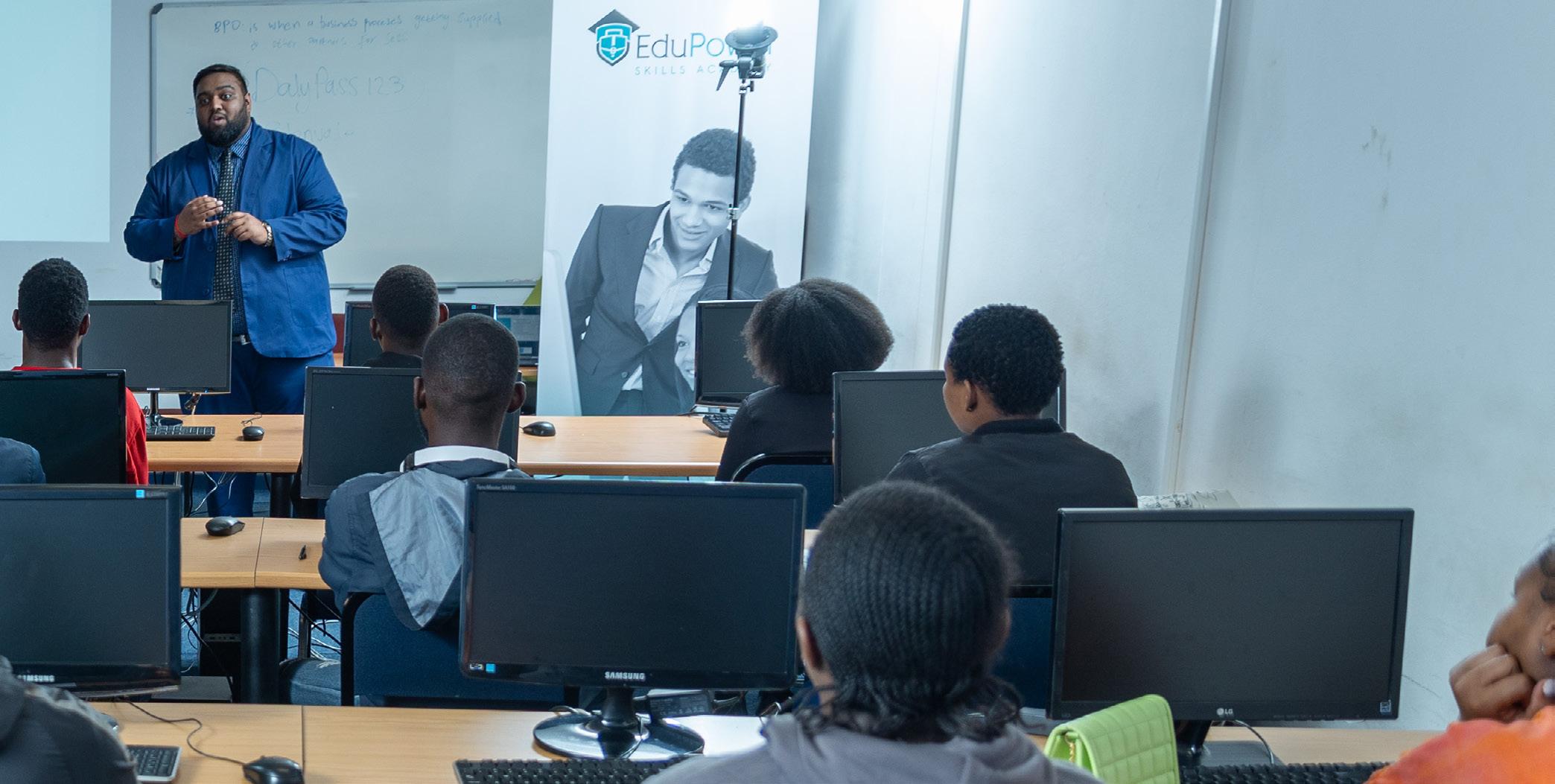
preparing them for work in a contact centre environment as well as discovering various entrepreneurial activities undertaken locally.
“The town where we launched came up as one of the most challenged towns in the country,” admits McNabb.
“That is good for us as we see it as us doing something remarkable in
// AS WE SEE IT AS US DOING SOMETHING REMARKABLE IN A PLACE THAT NEEDS IT. WE CREATED 50 JOBS THERE OVERNIGHT AND THAT CHANGED THE LIVES OF LEARNERS AND THEIR FAMILIES //
a place that needs it. We created 50 jobs there overnight and that changed the lives of learners and their families. If the funders and the mining companies continue to come to us, we can continue to roll this out – it’s a repeatable model. We can definitely create beacons of hope in all of these towns where something meaningful is needed. There is desperation in these rural areas and it makes sense to bring the jobs to people rather than having them all come to urban areas. Decentralising opportunities provides massive advantages.”
Learners in the Kuruman Academy are currently working on two live campaigns - an outbound data management campaign and a customer service inbound campaign. Mentorship is also provided to
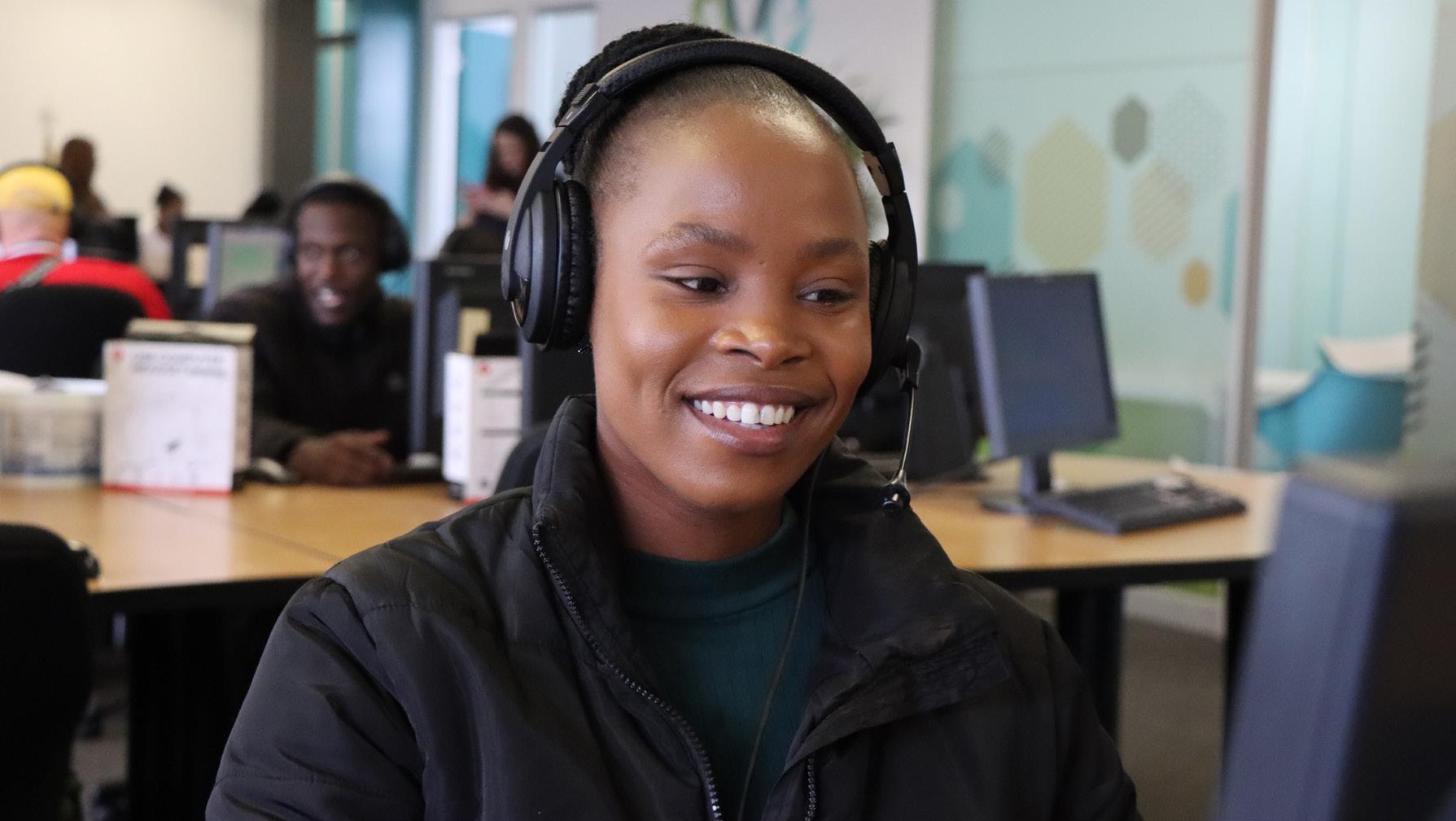
develop interpersonal and business skills, all of which ensures that when learners graduate, they are job ready. The corporate client wins, the individual wins, and EduPower wins. The state is also a big winner, realising new levels of employability where it has been sorely needed.
“Our two pillars are very strong,” says McNabb. “The entrepreneurial pillar is obvious – how do you run a small business, how do you manage cash, how do you manage yourself, how do you become a leader. With the BPO pillar communication skills are vital – hitting targets, working to deadlines, working under leadership, how to work with a diverse set of potential clients. IT skills are inherent and delivered across all courses.”
At its heart, EduPower was borne out of corporates clients need for BBBEE compliance. EduPower is home to more than 30 full time staff, as well as strictly vetted external providers, that understand requirements and know where to look when it comes to delivering opportunity.
“The ability to recruit deserving candidates is tough. There are tax breaks and employment equity requirements and this gives us a challenge,” admits McNabb. “We always manage to achieve the requirements of our clients, but sometimes – in the smaller pools – you end up taking people that you know are not of the right calibre. Our clients mandate us and they don’t give us room to choose what learners do what. That is our biggest challenge.”
Helping candidates then find meaningful employment at the end of a learnership is the next hurdle. With so many newly upskilled people, and so few jobs available, the entrepreneurial mentorship provided
// THERE ARE NO OTHERS THAT SUPPORT WITH ENTREPRENEURIALISM BEYOND A LEARNER’S TIME ON THE COURSE //
by EduPower becomes increasingly important. For each of those able to start their own small businesses, there is further hope of new opportunity.
“Taking people from extremely vulnerable backgrounds with many developmental concerns and poor education to date, and then creating an employed person or an employer of people in the future – that is not an easy task,” says McNabb.
“We achieve better results than most” he adds, “because we invest heavily in platforms of mentorship and of life skills – we really throw the kitchen sink at it when it comes to bringing what we call ‘I Can’ moments into their worlds.”
He adds that often, when learners first engage with EduPower, they lack confidence and would not choose themselves to be on their own team. “It is up to us to get them to that point over 12 months. We are trying to break a cycle of poverty – that is the whole point.”
“The delivery of entrepreneurialism is vital as, for the most part, our learners or their families have some form of side hustle to survive so we like to look at that and try and bring some professional skills to it to make it more than it is, both through skills development and donations we get from large corporates. That is something that puts EduPower ahead of others. There are no others that support with entrepreneurialism beyond a learner’s time on the course.”
When learners complete their study, EduPower can provide a route into client businesses, and the likes of Toyota, Unilever, Absa, Grindrod, Hudaco, and more are always looking for those that have real skills, developed in a live environment, for their own business success as well as B-BBEE compliance. This is something that is being celebrated by EduPower and its community. “Our vision has shifted towards employment creation and we want to see people having more than just book knowledge. We want
to see people employed, and we want to see people become entrepreneurs and create employment for others,” says EduPower MD, Rajan Naidoo. With the strength of the Daly Group behind it, and with so much emphasis on job creation through BPO in South Africa, EduPower is in a perfect position to achieve its goals. According to management consultancy firm, McKinsey, employment levels in BPO in South Africa could triple, hitting 775,000 by 2030. The country has already been labelled the world’s second favourite BPO destination for three years in a row according to the 2020 Front Office BPO survey by Ryan Strategic Advisory. Globally, the BPO industry grew at 16% in 2019, but In South Africa the growth rate was 34%. Between 2014 and 2018, the South African BPO industry boomed by 24% CAGR. Clearly, the future is
bright for this exciting business. Confirming that all companies in the Daly Group have performed well recently, McNabb concludes with a hopeful outlook for EduPower. “Our education business is ultimately a compliance entity where our clients have to spend on skills development –it’s an annual requirement regardless of anything and companies will not risk future sales so that is strong. We do feel lucky and we are fortuitous but we are working hard to achieve a purpose.”

The company’s vision of ‘a transformed South Africa where everyone is employable’ is that little bit more in reach with each graduate and each corporate commitment.



With around 50,000 colleagues operating from offices in more than 130 countries, Marsh needs little by way of introduction as the world’s leading insurance broker and risk advisor.
Acquisitions see Marsh set to deliver its trademark world-leading insurance and risk advisory services to clients across North and West Africa, as its importance grows evergreater with global risks abounding and refusing to abate.
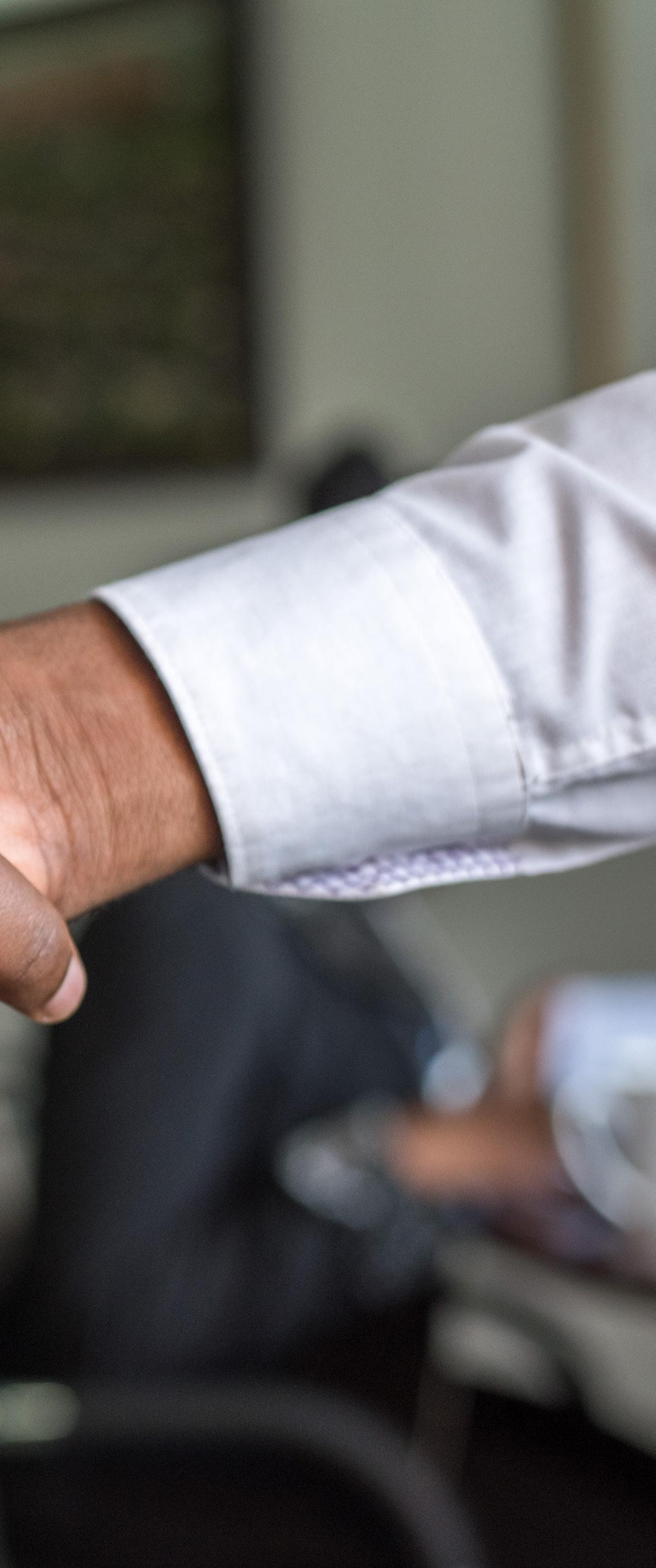
For over 150 years Marsh has grown by helping clients anticipate and meet the needs and challenges of changing times and technologies. In Africa, this has primarily been borne out in specialising in providing clients with the intellectual capital and industry experience to unlock the opportunity in risk. Throughout this long lifetime clients have trusted Marsh to advise them during the most trying and celebratory times, helping them achieve success by becoming more resilient and attaining the possible.
“Our purpose is possibility,” Marsh Africa declares. “At Marsh, the idea of possibility isn’t just something we talk about - it’s something we’ve lived
for over 150 years. With new risks and opportunities constantly emerging, we help clients navigate the changing risk landscape, realise ambitious goals and make their future more secure.”
“We go beyond risk to rewards for our clients, our company, our colleagues, and the communities in which we serve, protecting and promoting possibility and allowing our clients to dream bigger, reach further and plan for the opportunities ahead.”
“Together,” Marsh Africa continues, “we are creating a benchmark of excellence in the risk and insurance industry by harnessing our global and domestic expertise drawing from over 40 years of experience and insight from our continuously expanding operations in the Middle East and Africa.”
Marsh’s staggering number of colleagues worldwide, quickly approaching the 50,000 mark, means

// AT MARSH, THE IDEA OF POSSIBILITY ISN’T JUST SOMETHING WE TALK ABOUT - IT’S SOMETHING WE’VE LIVED FOR OVER 150 YEARS //
that local expertise is always on hand, providing commercial and individual clients with tailored insights, advice and support in the specific markets in which they operate or where their

business may face risks. “We help you understand coverage nuances, regulatory developments and risk trends, and we work together with you on placement, mitigating risk
and optimising your risk spend.”
At the turn of the year, climate risks dominated the list of long-term global concerns as the world entered the third year of the pandemic, while the top shorter-term global concerns included societal divides, livelihood crises and mental health deterioration. Now in its 17th iteration, the World Economic Forum’s

// WE HELP YOU UNDERSTAND COVERAGE NUANCES, REGULATORY DEVELOPMENTS AND RISK TRENDS //
Global Risks Report encourages leaders to think outside the quarterly reporting cycle and create policies that manage risks and shape the agenda for the coming years.
“Health and economic disruptions are compounding social cleavages,” said Saadia Zahidi, Managing Director, World
Economic Forum. “This is creating tensions at a time when collaboration within societies and among the international community will be fundamental to ensure a more even and rapid global recovery.”
Carolina Klint, Risk Management Leader, Continental Europe, Marsh, added the need of prudence
around cyber and space concerns. “As companies recover from the pandemic, they are rightly sharpening their focus on organisational resilience and ESG credentials,” she observed.
“With cyber threats now growing faster than our ability to eradicate them permanently, it is clear that neither resilience nor governance are possible without credible and sophisticated cyber risk management plans. Similarly, organisations need to start understanding their space risks, particularly the risk to satellites on which we have become increasingly reliant, given the rise in geopolitical ambitions and tensions.”

// MARSH AND INOXICO’S COLLABORATION WILL ENABLE OUR SOUTH AFRICAN CLIENTS TO GAIN MORE INSIGHT INTO THEIR COMMERCIAL CREDIT MANAGEMENT FUNCTION //
In March, Marsh announced an exclusive collaboration with technology company Inoxico, specialist in predictive trade credit analytics solutions, to support South African clients in managing their trade credit risks and increasing their profitability generated from trade credit sales.
Trade credit is the most important form of growth capital in developing countries and is estimated to be a significant - and growing - $100bn industry in Africa. Using Inoxico’s Trade Shield solution, Marsh’s South Africa’s clients can use predictive analytics on their accounts receivables to gain debtor credit scores and debtor risk segmentation, as well as access to customer credit reports, credit limits insights and changes to risk profiles.
“Marsh and Inoxico’s collaboration will enable our South African clients, through the use of powerful analytics, to gain more insight into their commercial credit management function, assessed Pieter Dingemans, Credit Specialties Leader, Middle East and Africa, Marsh Specialty. “As a result, our clients will be able to confidently extend the amount of trade credit offered to their customers, while also increasing their operational resilience, boosting their growth strategy and reducing the impact of future shocks.”
“I am proud to formally announce this industry-shaping collaboration,” added Kiashan Moodley, Head of Partnerships at Inoxico. “This is what the market has been waiting for – a partnership that puts the customer back in the driving seat and provides them with powerful tools to confidently navigate the complex business landscape we currently, and will continue to, find ourselves in.”
In November, Marsh revealed that it intends to exercise its option to acquire the majority of shares in Beassur Marsh, a leading insurance broker in Morocco in which it had acquired a stake in June 2019. Beassur Marsh will henceforth operate as Marsh Morocco and current CEO Mehdi Tazi will become CEO of Marsh Morocco. Beassur Marsh team will become part of
Marsh’s expanding network of dedicated regional expertise across the Africa region, benefitting not only from local knowledge and experience but access to Marsh’s global resources and capabilities.
“Through Marsh’s network, leading Moroccan businesses will, for the first time, have local access to unrivalled risk and insurance services and solutions than can support them in realising their growth ambitions and enhance their contribution to the region’s wider economic success,” said Tazi.
// THROUGH MARSH’S NETWORK, LEADING MOROCCAN BUSINESSES WILL HAVE LOCAL ACCESS TO UNRIVALLED RISK AND INSURANCE SERVICES AND SOLUTIONS //
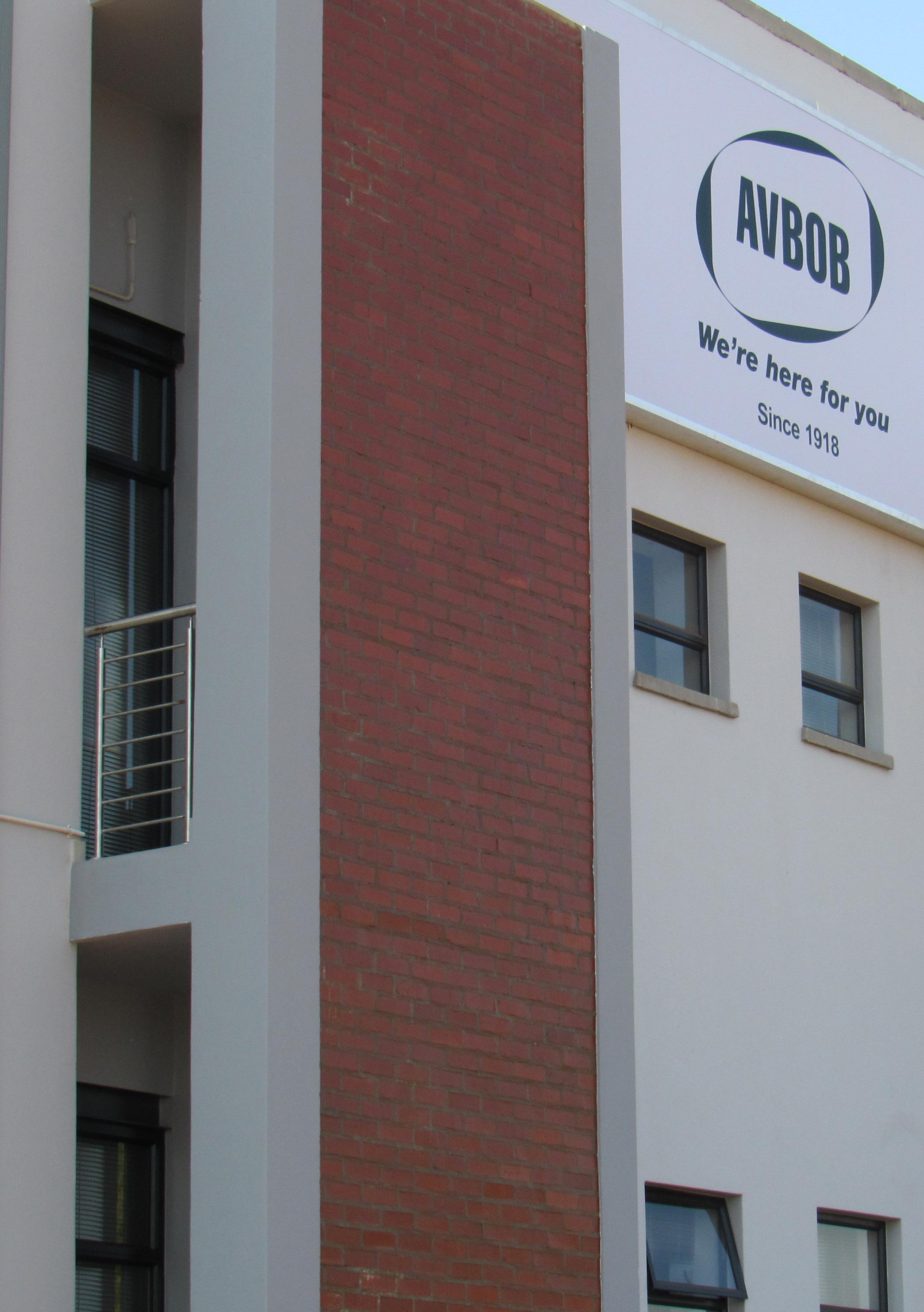
PRODUCTION: Eleanor Sarbutt-King
One of South Africa’s best-known and most trusted funeral service providers, AVBOB is the largest Mutual Assurance Society in Africa, and provides specialist funeral insurance and burial services under one roof. “Our business is about people, and whether in life or death, we care for them,” AVBOB declares, as this unique South African proposition looks back with pride on a year of swift adaptation, growth, and success.
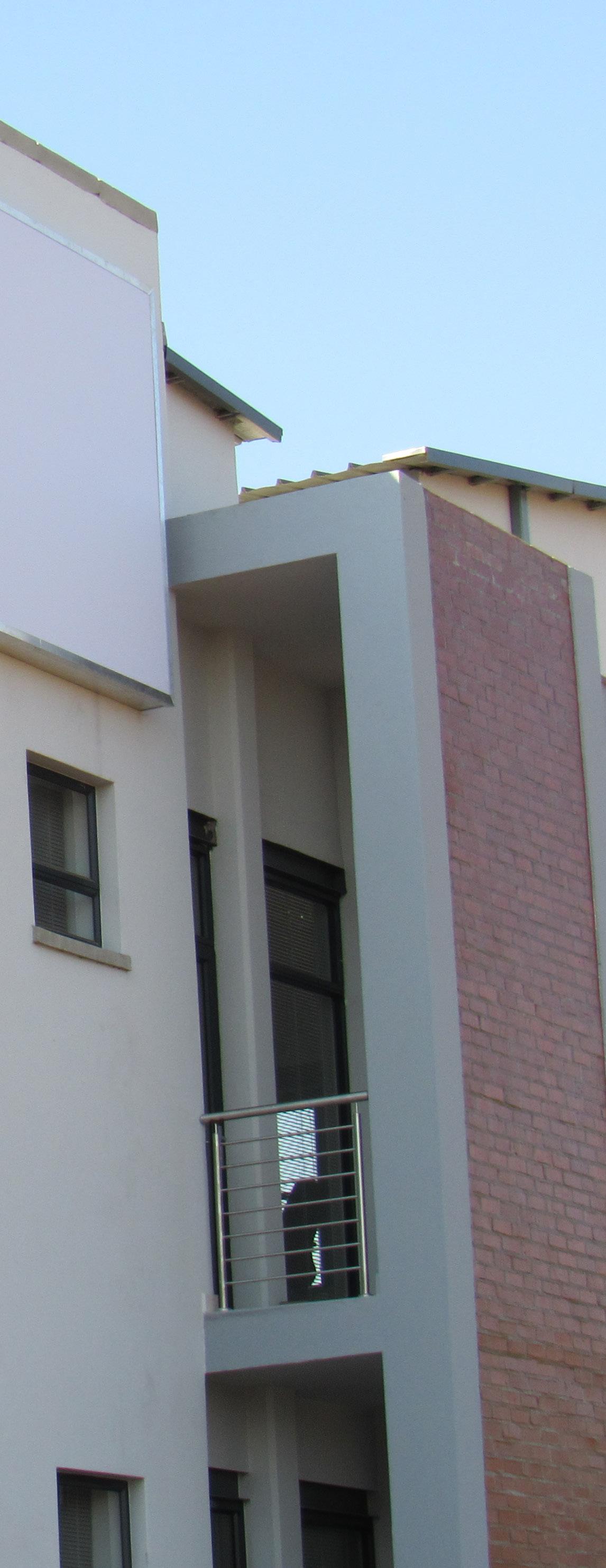
//Established in Bloemfontein in 1918, AVBOB has spent more than a century flourishing into Africa’s largest Mutual Assurance Society, with more than 7,000 staff providing a one-stop funeral insurance and burial service. “We set out to provide our customers with dignity and financial security through our shared value financial model,” AVBOB explains.
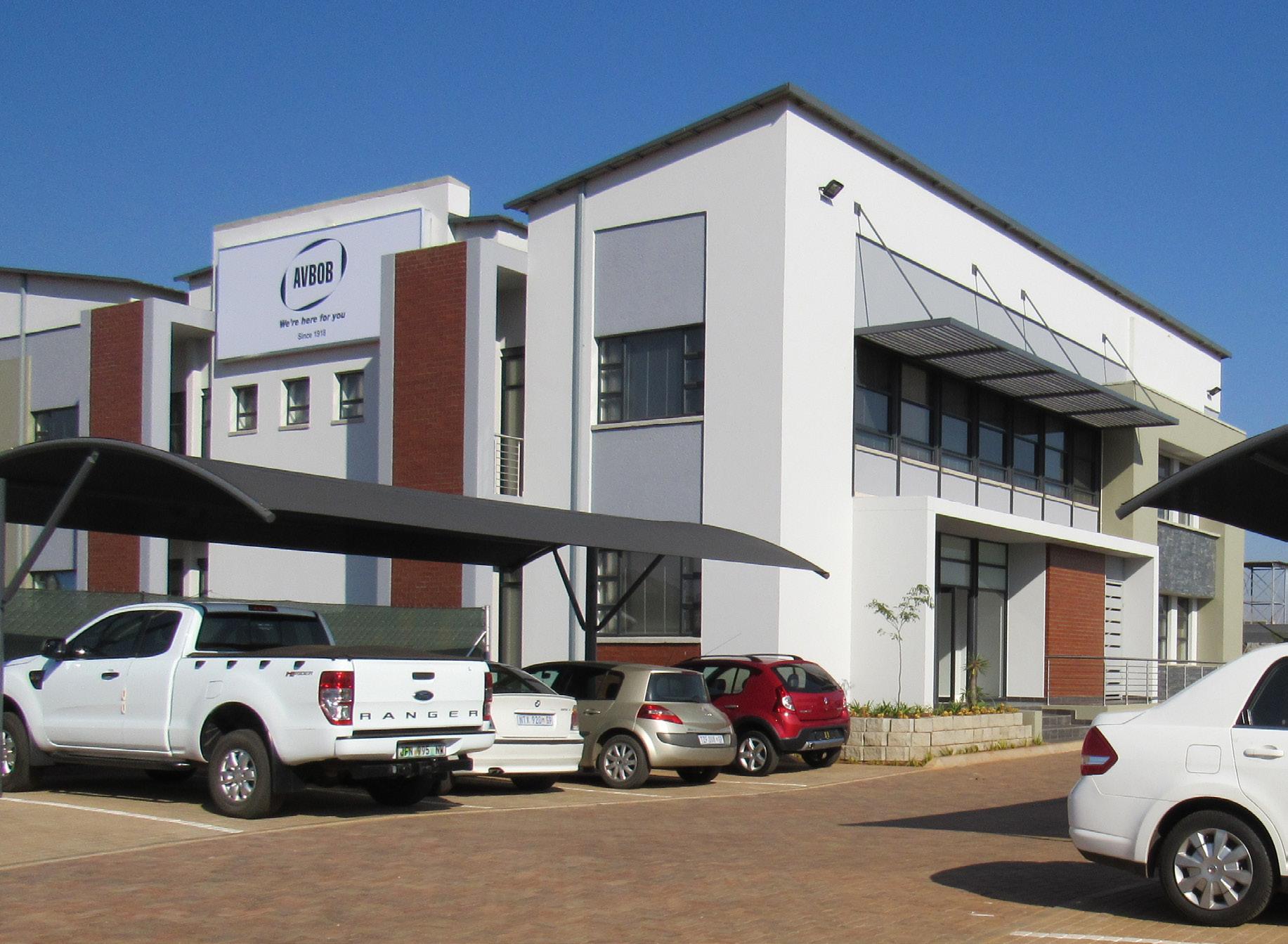
“We want to empower our members by providing them with affordable integrated funeral and financial services products and by sharing with them and their communities the value we create,” distilling in just a few words the comprehensive, unique overarching aims of the society.
Partly due to its relative affordability, funeral cover has a notoriously exceptionally high penetration rate in South Africa,
and from the approximately 17 million households in the country currently more than eight million lives are insured by AVBOB.

“AVBOB as a mutual insurance society is the pacesetter in the funeral industry,” the group states. “Because AVBOB is a mutual, a family, and family comes first, we place our customers’ interests at the heart of how we do business.”
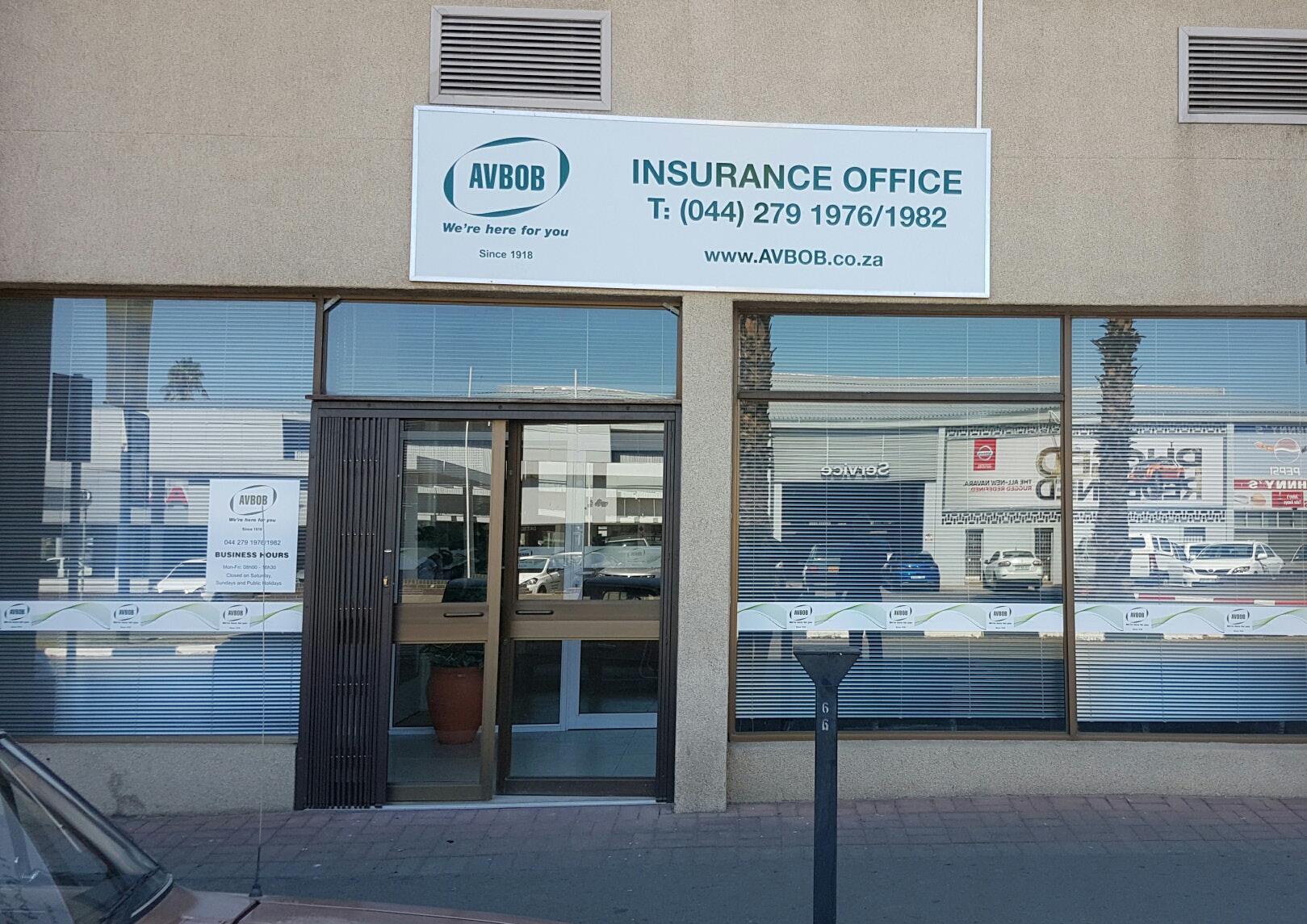
FAMILY AFFAIR
Being a mutual society means that AVBOB has no external shareholders, instead members receive a share of AVBOB’s surplus profits. “Our members are our policyholdersthe AVBOB family,” it once again stresses. “It is the foundation of our mutuality: to create and share mutual value with our family and be here for all South Africans. Always.
“The defining feature of a mutual society is that it is there for its members during times of need and everything is done for the benefit of its members.” This was one key element highlighted by CEO Carl van der Reit last year as making AVBOB truly unique. “In South Africa, contrary to the UK or Europe, being a mutual is really rather rare;
there are only something like three of us with this status,” he explained.
“There is a significant need for mutual societies such as AVBOB, and our mutual ethos pervades everything that we do. We make regular declarations of profit back to our members, and the model has, in addition, allowed us to offer every person holding a policy with AVBOB a free funeral through our dedicated division, on top of all the other value for benefits. It is another way for us to be able to return gains to our customers.
“We have created a unique culture of customer centricity that is difficult to replicate elsewhere. Companies that truly stand out from their competitors are those that go the extra mile to offer an exceptional customer experience.”
// A MUTUAL SOCIETY IS THERE FOR ITS MEMBERS DURING TIMES OF NEED AND EVERYTHING IS DONE FOR THE BENEFIT OF ITS MEMBERS //
Across three operating divisions lies a comprehensive range of funeral policies to meet the many and varied needs of the market, backed by a full funeral and cremation service via a network of highly-trained staff and a factory in excess of 14,000m² where an extensive range of coffins, wreaths and fittings is manufactured.
It is tragically inescapable that death, and the associated burial, is a process through which each of us will at some stage have to go through, and in South Africa a high mortality rate together with funerals being
so important to the majority of the population mean that a large funeral services industry has been established.
Elaborate burials are still a significant status symbol to many in South Africa, spawning a funeral insurance industry valued at somewhere between R7.5bn and R10bn. A funeral can be a hugely expensive exercise -
can cost anything from R600,000 to R3 million - and as such it is today the most popular insurance cover in South Africa.
GROWTH
AVBOB now has 379 branches nationwide, of which more than 200 are funeral arrangement offices and funeral agencies. Last year alone,
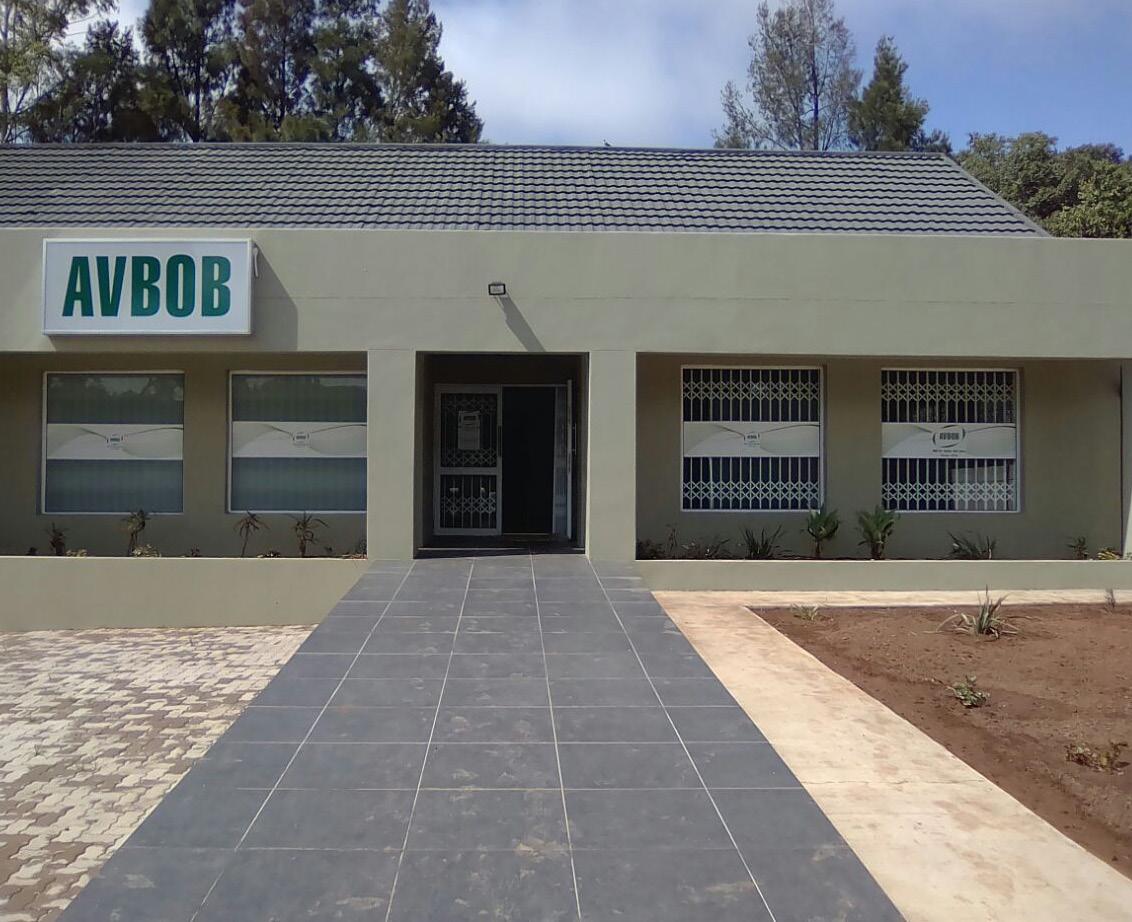
// OUR IMPACT ON LIVES AND LIVELIHOODS PROVES THE RELEVANCE OF WHAT WE DO AND OUR PURPOSE AND PLACE IN SOCIETY //
this footprint grew by 11 insurance offices, the base from which agents provide comprehensive client services to policyholders, and four funeral agencies, which provide the accessible, one-stop funeral care to all of South Africa’s communities.
“Ours is the largest funeral service operation in the country,” van der Reit relayed, adding a further factor to cement AVBOB as a true one-of-akind. “More than simply the biggest, our being an integrated insurance and funeral service operator makes us truly unique in the country. Where other insurers stop at the point of a claim, that’s where our full service kicks in and we take it from there.
“As far as possible, we aim to provide a full-service offering at every AVBOB site.”
The last year was another decked with accolades, as AVBOB was recipient of no fewer than eight of the industry’s most prestigious awards. Thrilled by its selection in October as Best Funeral Provider by Best of Bloemfontein, the Group was then certified as a Top Employer for the fifth consecutive year, perfectly recognising some of the defining AVBOB values.
“We strive for excellence, always looking for ways to improve our systems, processes and products,” the Group stresses, “and our people should be challenged, learn new things, grow and take ownership of the things they do.
“As a key player in the funeral insurance and funeral service industry,
we continue to build business strategies that cater for the current and future needs of customers.”
Not just physical growth, 2021 also saw total assets increase a whopping 23.8% to R35.1 billion. Premium income also rose by more than 10% to R5.7 billion, as total policyholders hit 2.5 million. AVBOB Funeral Service and AVBOB Industries achieved pretaxation profits of R66.4 million and R23.3 million respectively, despite zero price increases for the latter.
“AVBOB entered its 104th year on a strong note on the back of the record performances of the previous year,” van der Reit began his assessment. “In line with industry trends and reflecting the difficult economic times in which our members find themselves, we have endured headwinds in the form of pressure on the persistency
levels of our insurance policy book and volatility in investment markets. In response to these challenges, a number of changes to the business have already been implemented, and it remains exceptionally financially strong and well able to endure the current market turbulence.
“Our mutual status remains the cornerstone of our ethos, our purpose and our competitive differentiation,” he opined, “and being able to offer an integrated funeral insurance product and funeral service also continues to set us apart. Our impact on lives and livelihoods proves the relevance of what we do and our purpose and place in society.”

A consistent partnership builds long-term success. We’re extremely proud of our partnership with AVBOB and wish them, and their clients, every success in the future.
// OUR MUTUAL STATUS REMAINS THE CORNERSTONE OF OUR ETHOS, OUR PURPOSE AND OUR COMPETITIVE DIFFERENTIATION //
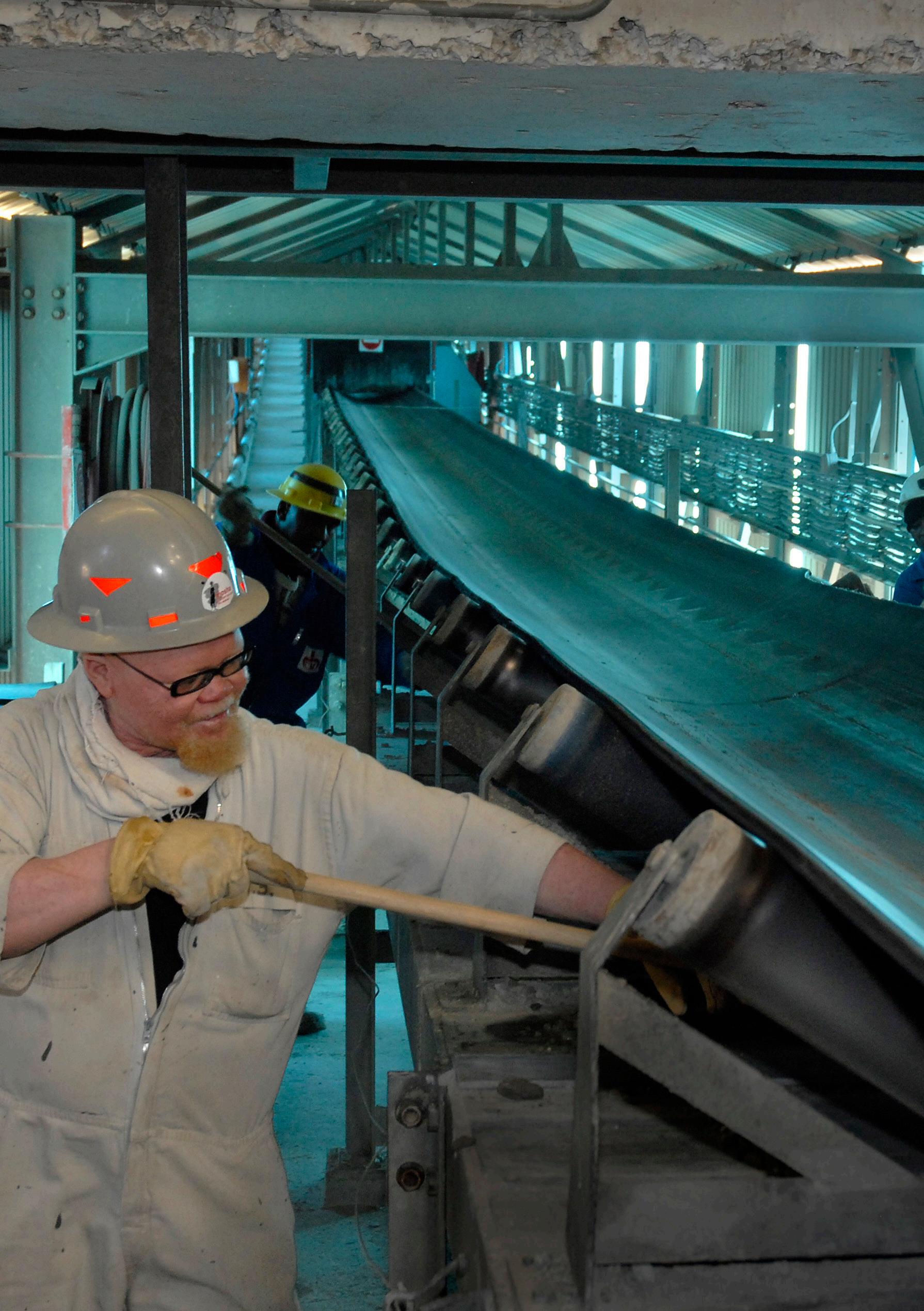 © Graeme Williams
© Graeme Williams
Founded in 1894, and with nearly 130 years of know-how, experience, and calibre to draw on, Rand Mutual Assurance (RMA) is a non-profit mutual assurance organisation, owned by its policy holders and overseeing the receipt, adjudication, and administration of workers’ compensation claims. For the organisation, caring for its clients and families is couched in an exhaustive Social Impact Strategy, which continues to benefit those most in need of support and guidance.

//“RMA is the warm African sunrise that welcomes warmth, comfort and care to the lives we touch,” sets out the non-profit, mutual assurance organisation owned by its policy holders. “As an organisation that is compassionate and caring, RMA goes the extra mile to ensure that beneficiaries and their families receive the care and compensation they are entitled to when they have sustained either a work-related injury or occupational disease.”
Herein lies the core of RMA’s administration business, in the receipt, adjudication and administration of workers’ compensation claims,
including the payment of medical costs, one-off disability payments and the ongoing payment of pensions in the case of severe disability and death - all according to the Compensation for Occupational Injuries and Diseases Act (COIDA), with principal focuses on the mining and metals sector.
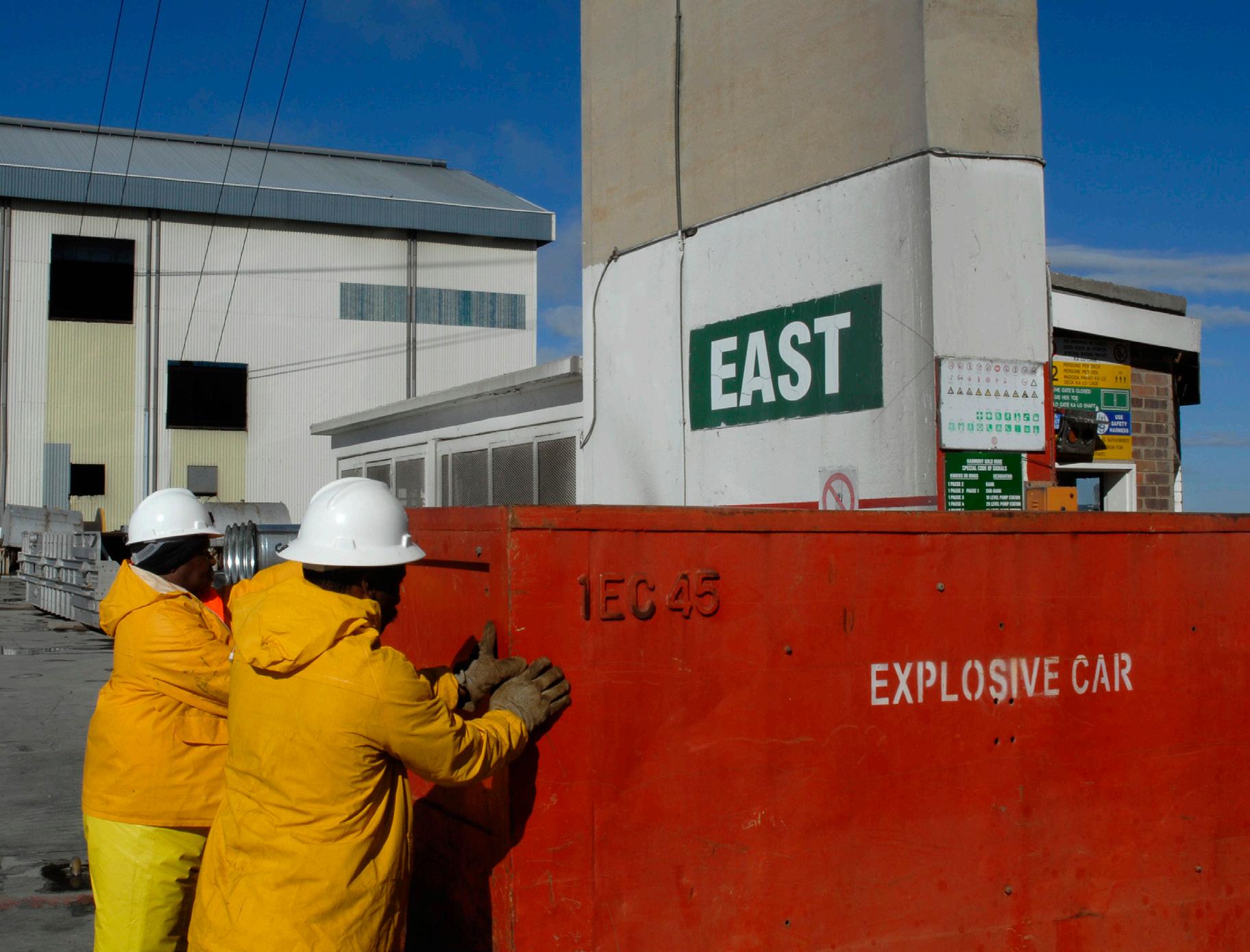
“RMA’s high level of service and quick claims turnaround is underpinned by a market-leading integrated claims management IT system that allows for paperless
adjudication of claims,” it says of a further layer of superior service levels. A wide footprint makes RMA easily accessible to its clients, claimants and other stakeholders, through a head office in Johannesburg and regional walk-in branches in Carletonville, Cape Town, Durban, eMalahleni, Johannesburg, Klerksdorp, Pretoria, Rustenburg and Welkom, as well as satellite offices in Lesotho, Mthatha and Mozambique.
“No matter what a day may
// RMA IS OUR CLIENT’S CONSTANT SOURCE OF WARMTH, COMPASSION AND CARE //© Graeme Williams
bring,” the organisation assures, “RMA is our client’s constant source of warmth, compassion and care when life hands them challenges that seem too hard to face alone.”
Identifying a need to help care for miners who were injured while on duty, RMA was founded in 1894 by three mining companies on the Witwatersrand as a non-profit mutual assurance company, and to this day remains a mutual association whereby policy holders are also shareholders. RMA Life Assurance Company Limited (RMA Life) was also established in 1990 as a wholly-
owned subsidiary of RMA, to manage the pension benefits payable to claimants and their beneficiaries.
“Whether clients are injured on duty, ill or pass away and leave family behind, we are here to make life stress-free with a range of policies,” RMA promises. “You are in safe hands with RMA; we are passionate about caring for the lives of our claimants and their families, and embody our brand promise of caring, compassionate, compensation at every level of the organisation.”
An exhaustive array of products come together to represent an unparalleled helping hand in seeing employees through times of difficulty,
whether injured or ill on duty. “With the complete range of occupational insurance products, we can offer you a bespoke group cover policy to meet your company’s needs,” RMA explains. Crime and injury are covered against when commuting, as are group personal accident and injury at work or work-related events.
International COID ensures employees who work outside South Africa can still enjoy workers cover for occupational disability or diseases, and in the worst imaginable circumstances affordable group funeral plans are offered to companies for the benefit of their employees and provide a lump-sum payment
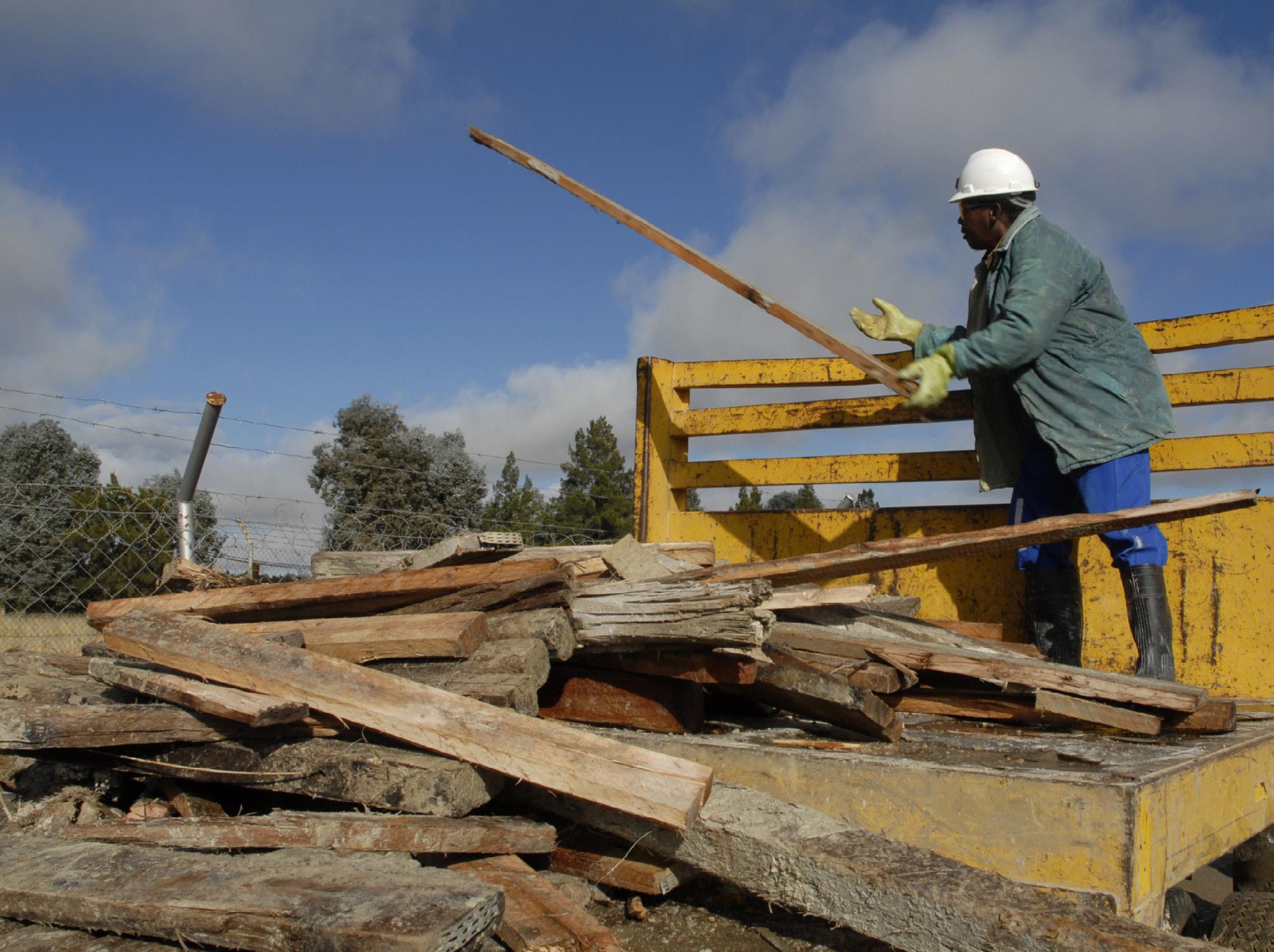
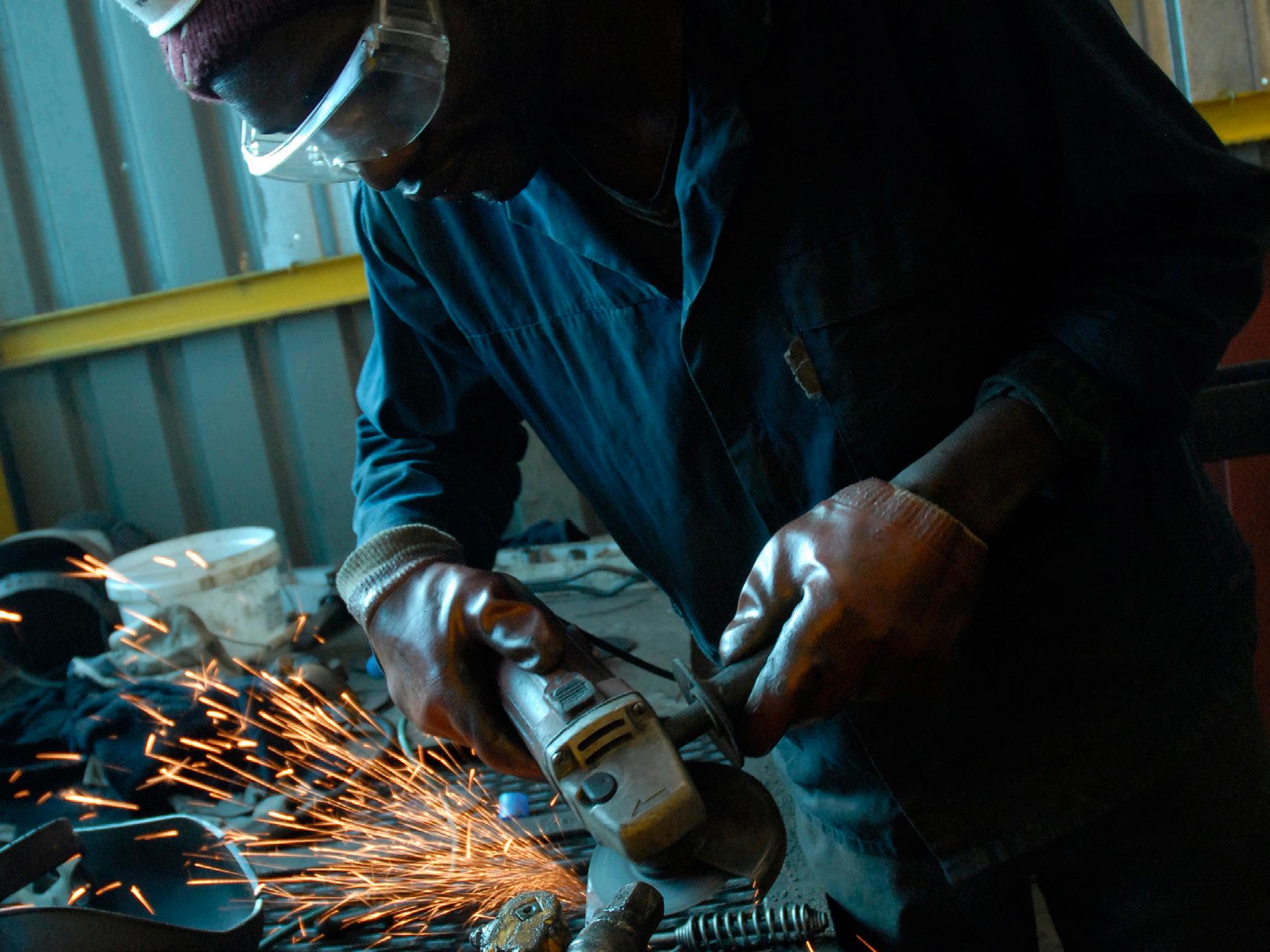
to cover costs related to a funeral. Value-added products, available to RMA as it operates under both short- and long-term insurance
licences issued by the Financial Services Board (FSB), were pinpointed by Group CFO Kyansambo Vundla last year as housing some of the most lucrative opportunities for growth.
“We’ve identified the strategy to ‘build a business of significance’,” she revealed in October. “With a legacy of 127 years behind us, I think we have a trusted brand in the industry, and with a new executive committee to take us forward, it’s an exciting time.”
“RMA lives by its caring and compassionate way,” it sums up. “We see it as a privilege to help communities further their skills;
we enjoy seeing people being educated, reaching for their dreams and achieving their goals. We live to see the joy on people’s faces when they’re empowered and improve their standard of living.
“Lending a helping hand is what warms our hearts.” RMA has invested generously in Enterprise Development (ED), what it sees as a powerful tool in assisting in job creation and addressing poverty.
“The entrepreneurship pillar of RMA’s Social Impact Strategy reflects our sustainable approach to development and collaboration with key stakeholders. Helping entrepreneurs across South Africa will help lead to
// RMA IS ON A MISSION TO IMPROVE THE SUCCESS RATES OF ENTERPRISES BY ENCOURAGING STRATEGIC ENTREPRENEURSHIP AND INNOVATION //© Graeme Williams
significant socio-economic growth.”

Most notably, RMA has contributed to South African entrepreneurship development via more than R58 million in funding, made up of an R19.6 million total spend on ED, and R39.3 million investment in Supplier Development (SD), both in 2020. “The intent is to support businesses during their formative years, enabling them to scale, create more jobs and subsequently boost the local economy,” RMA explains.

“Our entrepreneurship projects are divided into Supplier Development Initiatives and Enterprise Development Initiatives, which address the unique needs of each business. In the last few years, over 20 businesses and partners have formed part of these ongoing initiatives and benefited from fruitful entrepreneurship opportunities.”
The funding is made through an enterprise development programme which, over a three-year period, sees RMA cover a large portion of the beneficiaries’ operating and capital expenses. Beneficiaries participate in entrepreneurship programmes and training to eventually become fully independent in terms of operations and finances.
“South Africa has one of the highest failure rates for SMMEs, with five out of seven failing in the first year,” is the stark fact. “RMA is on a mission to improve the success rates of

enterprises by encouraging strategic entrepreneurship and innovation that uplifts their surrounding communities.”



“The support we provide to SMEs in our supply chain enables them to create more jobs, achieve higher revenues and reach sustainable operating levels that are independent of our support. RMA provides support in the form of salaries, office rental, IT equipment, furniture, travel, and other office operating costs.”
Responsible investing represents another key arm of a wide-reaching CSR programme which allows encompasses financial education and inclusion, innovative skills development and diversity and inclusion. “Responsible investing is a broad-based approach that factors in people, society and the environment, and allows RMA to collaborate
with a range of medium-sized businesses in various industries that exhibit major growth,” it delineates, having committed to contributing R125 million over a 10-year period to South African businesses.





“RMA’s Social Impact Strategy is designed to promote economic growth, empower marginalised communities, and alleviate poverty in South Africa. It serves as a definitive plan with measurable outcomes, ensuring that we can make an immediate social impact.”

We provide high quality guarding solutions such as Retail, Residential, Hotel Corporate, Receptions and Close Protection.
// RMA’S SOCIAL IMPACT STRATEGY IS DESIGNED TO PROMOTE ECONOMIC GROWTH, EMPOWER MARGINALISED COMMUNITIES, AND ALLEVIATE POVERTY IN SOUTH AFRICA //


PRODUCTION: Jamie Waters
Established in 1988, Questek has earned a sustained reputation as one of South Africa’s most progressive, innovative, and hands-on technological suppliers. Covering markets encompassing professional audio visual, advertising, entertainment broadcast, medical, and passenger transport through Questek Advanced Technologies, Sales Manager Darren Cox takes us through the ever-more crucial application of the company’s solutions in the broadest range of settings.
//Technology touches almost every aspect of today’s world, that much goes without saying. It has changed the way we live our daily lives, the way we conduct business, and the way we communicate. Audio-visual integration (AVI) plays a major role in modern communication, a fact which still escapes many people, from the smallest meeting rooms and
corporate boardrooms to the largest auditoriums. All these rely heavily on AV technologies to enable effective and efficient communications.
A well-executed audio and visual installation has the potential to change how efficient a business is in its operations, however commercial AV is a complex process, and not easy to get right. Based in Bryanston, since inception in the
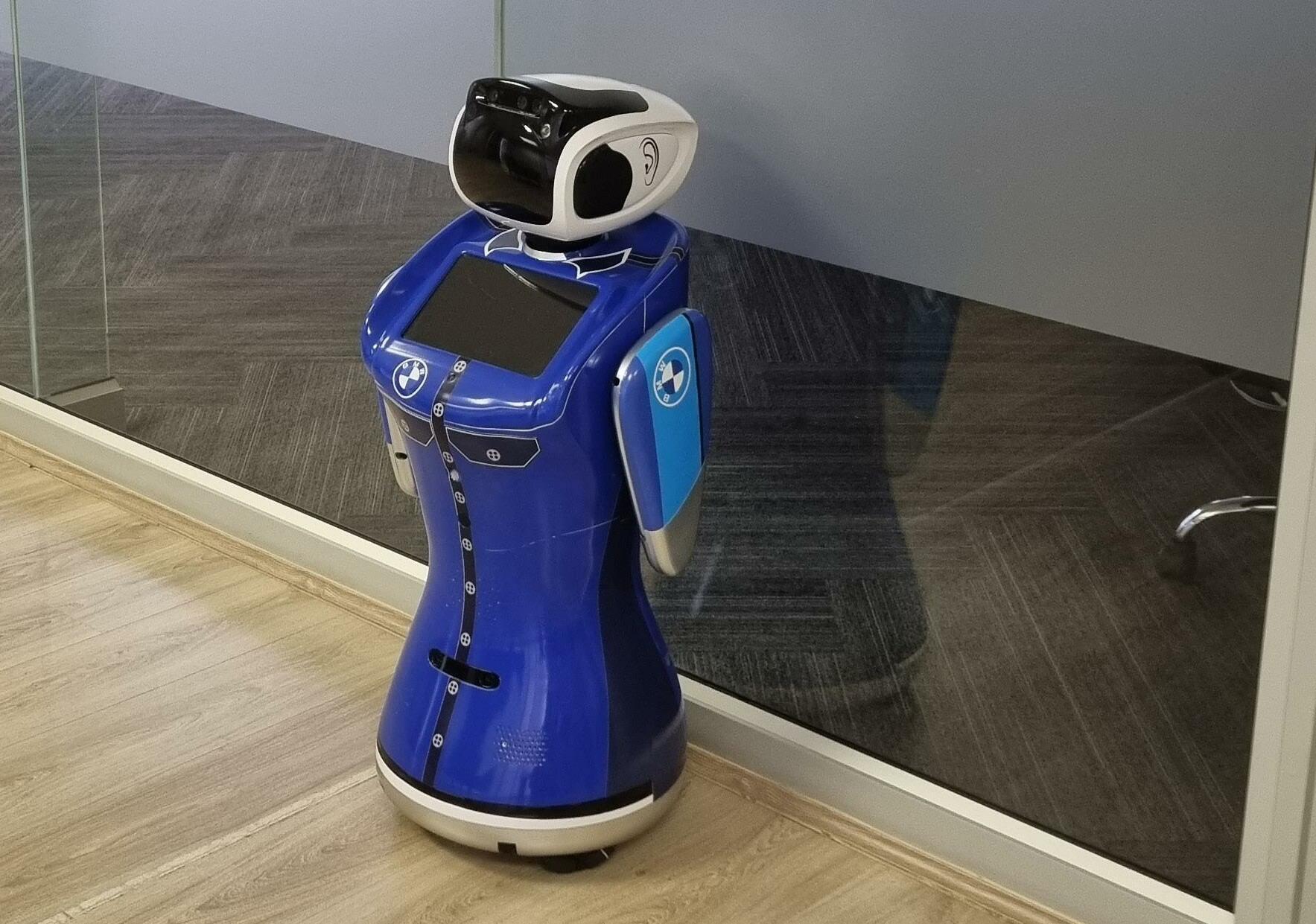
late 1980s Questek Audio Visual has been a true pioneer in designing, supplying and maintaining audio visual, video conferencing, control room, video wall, digital-out-ofhome equipment and providing solutions for companies both large and small in Southern Africa.
“Questek offers a turnkey approach to each project, from inception to installation and operation, on-site training and after sales support,” the company outlines. “A team of dedicated and skilled professionals work hand-in-hand with clients to deliver a cuttingedge solution to keep abreast in today’s highly competitive corporate market making sure clients’ AV needs are met to the last detail.”
// QUESTEK OFFERS A TURNKEY APPROACH TO EACH PROJECT, FROM INCEPTION TO INSTALLATION AND OPERATION, ON-SITE TRAINING AND AFTER SALES SUPPORT //
Quest for Technology is the exploded version of Questek’s more neatly abridged name, which perfectly encapsulates what has kept it growing and improving over more
than three decades to date. “Questek is a 34-year-old company - a relatively old company in the grand scheme, but still constantly at the forefront,” sets out Sales Manager Darren Cox. “Beginning life in 1988, we were one

of the first audiovisual companies in South Africa, having come from the broadcast industry which in fact dates us back slightly further even, through the combination of the three companies that joined together to form Questek.
“We have succeeded in building up quite an illustrious history, which has encompassed a number of world firsts and several innovation awards,” Cox shares, but adding a typically humble rejoinder. “The important thing, though, that we always have to remember, is it is not the past
// WE HAVE SUCCEEDED IN BUILDING UP QUITE AN ILLUSTRIOUS HISTORY, WHICH HAS ENCOMPASSED A NUMBER OF WORLD FIRSTS AND SEVERAL INNOVATION AWARDS //Darren Cox, Sales Manager
that is important, but what we are doing right at this moment.”
A particular strength of Questek’s at present, Cox reveals, is in the
area of humanoid robotics. “We brought the first of these into South Africa about three years ago now - a Pepper Robot, the world’s first social humanoid robot able to recognise faces and basic human emotion” he details. “We have taken it much further, however, and are now at the stage whereby recently we have removed the insides of robots that we have bought in, leaving the shell, and developed a local system in terms of the software and the brains that go around the whole operation.
“As a result, we now have a locally-hosted robotics system, entirely here within South Africa, which comes with a whole of host of functionality along with it; we have just completed the first of these with

our partner company. This is totally owned by us and is the first time it has been done in South Africa, and the obvious next step with which we are busying ourselves now is looking into building the bodies here to make it a 100% South African product.”
Cox cites the example of a project which has entailed Questek deploying such robots in a retail store, to deal with customer enquiries and guiding them toward their desired destination. “It is an invaluable additional resource to aid in sales,” he puts it. “The robot acts as a nice interface, or middle ground, between a human being and a machine. There is no desire here to replace humans, and never will be - this is one thing we make abundantly clear to our
FOR THREE DECADES QUESTEK HAS DESIGNED, INSTALLED, AND MAINTAINED SOME OF THE HIGHEST PROFILE BOARDROOMS IN THE COUNTRY
customers; it is all about putting a pleasant face on a computer, and in turn actually serves to make the people more efficient themselves.”
Aligning itself acutely with the continued and concerted move away from coal-based energy sources in the country, and indeed the world, Questek is also developing applications for its robots in the solar sphere, Cox delineates. “We are working with companies to see how we can use a different type of robot for the cleaning of solar panels, and mechanisms for cleaning solar farms, in this current great shift towards solar and alternative energies in South Africa.”
The other aspect of the great Questek that Cox is anxious to unpack is that under the enterprise video and e-learning umbrella. “I like to equate it to being a corporation’s YouTube,” he condenses, “recording and uploading videos into the company’s portal and working hand-in-hand with their learning systems. We’re making it easy to record and distribute video, and we want transform how an organisation communicates, learns, and grows.
“We have also introduced a number of innovations into universities, looking at cutting costs through identifying the most key basic functionalities - nobody wants to have to learn how to use hugely advanced technology to be able to do their job, and we wanted to make it as easy as possible for them to disseminate their message to pupils.”
New products for boardrooms, Cox goes on, represent another key focus for Questek in the bid to cut
Discover
costs and simplify the process of putting together solutions based on the needs of each individual client. “For three decades Questek has designed, installed, and maintained some of the highest profile boardrooms in the country, and we have a very good product which is really contributing to this. Our designs factor in considerations like room acoustics, room size and layout, existing infrastructure and the intended use of the room to produce an exceptional meeting experience.”
Another particularly fruitful area for Questek, Cox closes, is in control room installations, where it has been leading the way in South Africa since 1989. “We find that a lot of companies are consolidating into main control rooms at present, and it boils down to better managing
multiple systems,” he explains. “We are focussing on the management of these multiple systems and installing the right ergonomics into these control rooms, and although it has boomed recently it has always been a mainstay of the business.
“Almost everything revolves around making the management of information easier, and being able to communicate more seamlessly,” he says. “I don’t classify us as an audiovisual company any more,” he concludes of such a multifaceted, ever-evolving outfit, “but as an ICT company with a primary focus on visualisation and communication.”
Proud to be supporting Questek
// I CLASSIFY US AS AN ICT COMPANY WITH A PRIMARY FOCUS ON VISUALISATION AND COMMUNICATION //
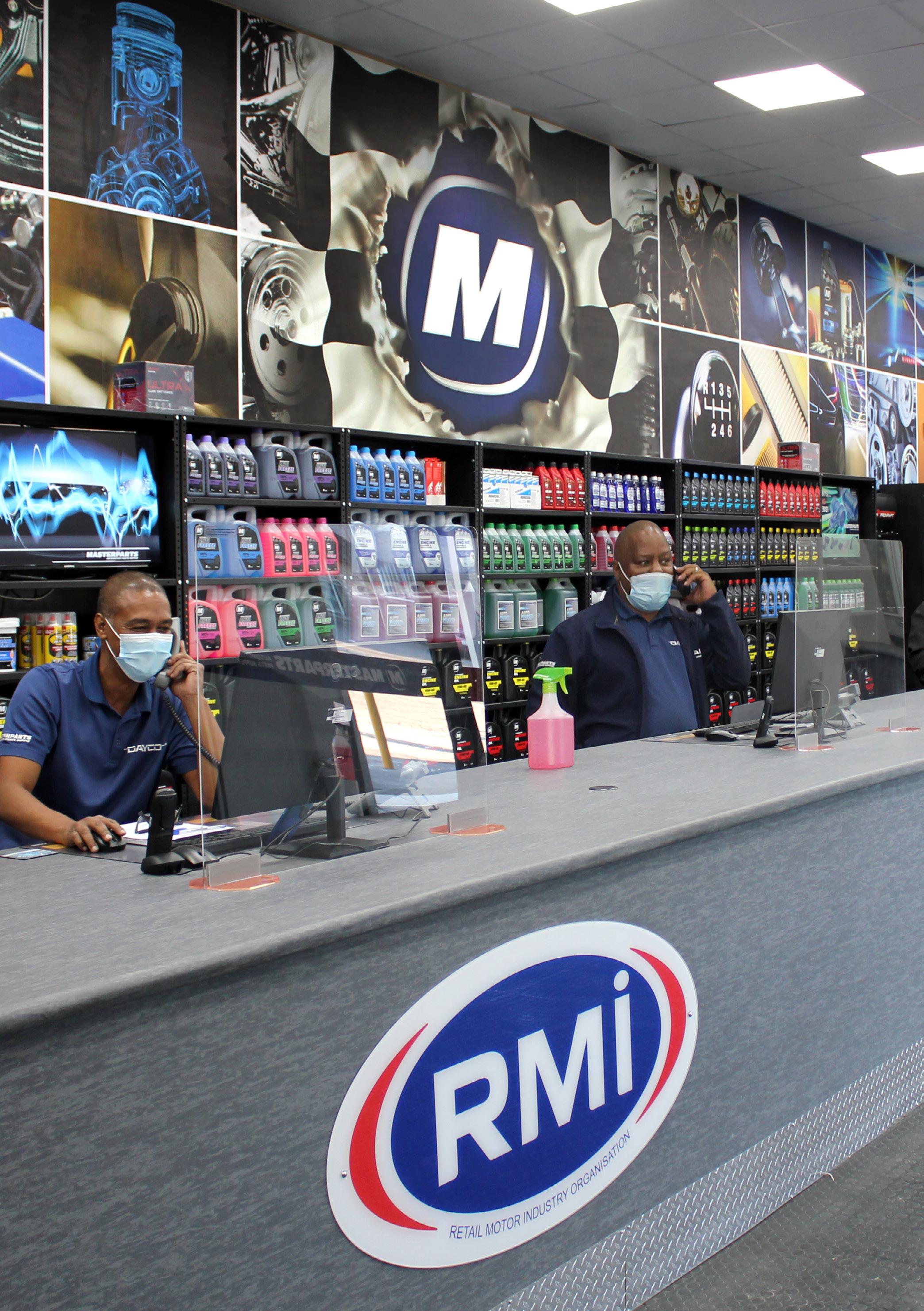
Expertise gathered and honed over 40 years supporting South Africa’s automotive industry makes Masterparts the obvious choice for engine, suspension, steering, braking and electronic parts. Offering one of the largest product portfolios and stocking hard-to-find items, Masterparts is the go-to for more than 50,000 automotive components for thousands of vehicle models over an increasingly broad footprint.
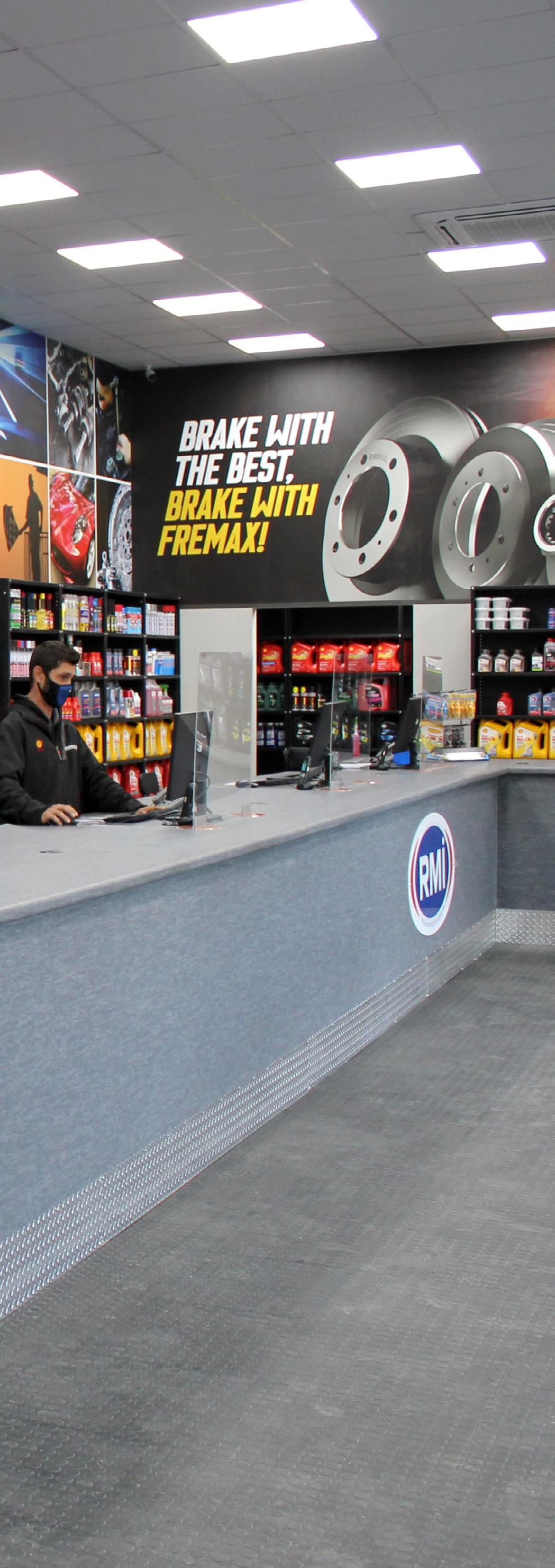
//Traditionally the African leader of the automotive industry, South Africa now produces more than half a million automobiles of all types each year. Amid the despondency around load shedding and other weakening economic indicators, the National Association of Automobile Manufacturers of South Africa’s (Naamsa) New Vehicle Sales stats for September 2022 evidence a year-on-year increase of 10.8%.
The automotive industry contributes 4.3% to South Africa’s GDP, with the export of vehicles and
automotive components reaching a record amount of R207.5 billion –equating to 12.5% of South Africa’s total exports – in 2021, and according to Naamsa, aggregate domestic new vehicle sales in September 2022 rose to just shy of 50,000 units, an increase of near-on 5,000 from the previous September. Despite much positivity,
however, the cumulative effects of the pandemic, looting, pricing, taxes, environmental concerns, and demands of SA’s road network make it a far from easy space in which to operate. The South African Reserve Bank pointed to economic and financial conditions expected to remain more volatile for the foreseeable future, then lowered its economic growth outlook for
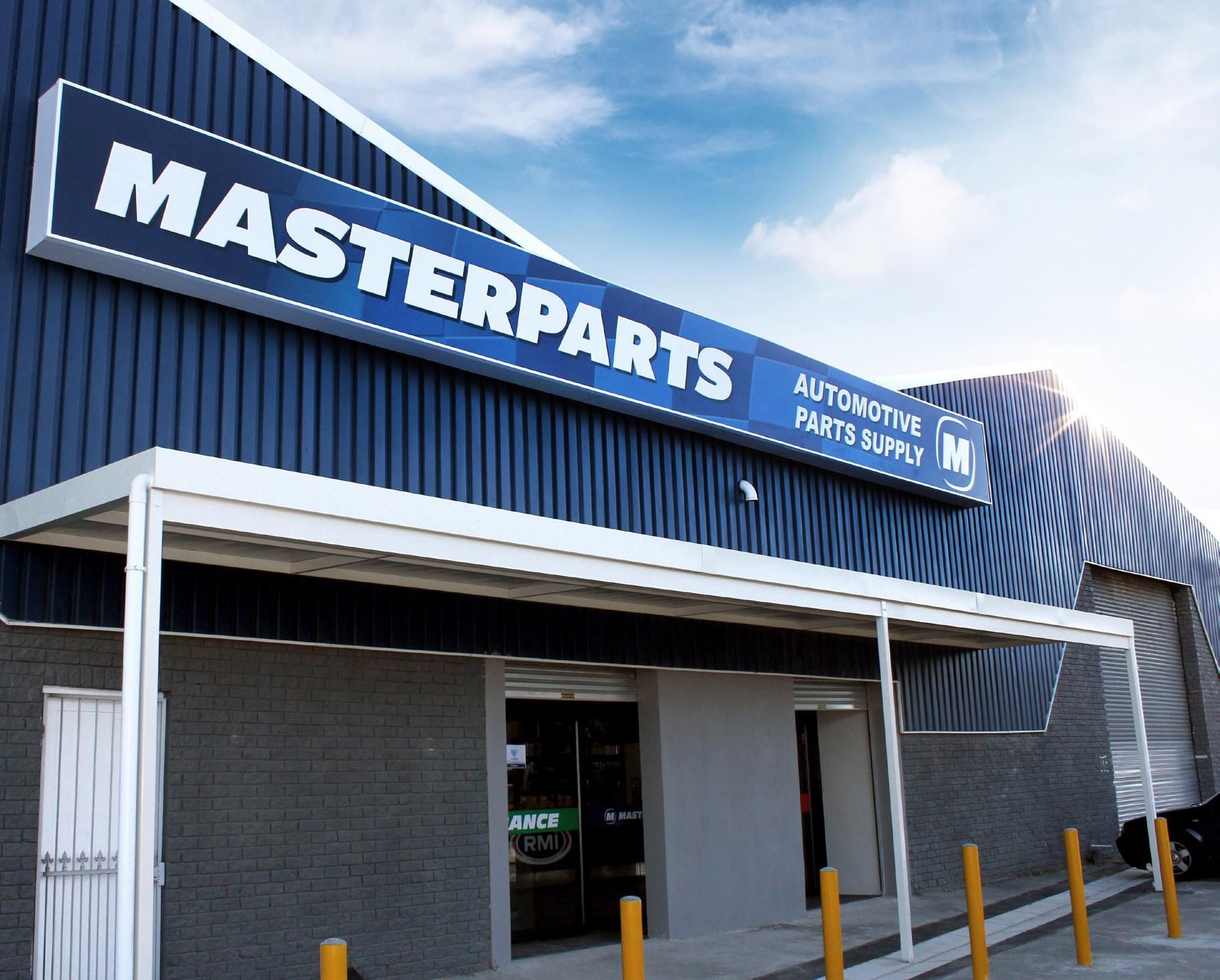
// OUR MISSION IS TO CONTINUE PROVIDING THE WIDEST POSSIBLE SELECTION OF CAR PARTS, INCLUDING HARD-TO-FIND ITEMS //
2022. Naamsa added that the global economy has entered a period of persistently high inflation and weaker economic growth impacting demand.
It leaves the strongest and most robust businesses in the industry to
move through the gears and lead the industry on the upward curve that has been shown to be abundantly possible. Big international OEMs have committed long-term to the country, which has seen some of the national chain stores already benefit from this vote of confidence.
A leading supplier and distributor of car engine parts and automotive accessories, Masterparts was founded in South Africa in August 1975, with the goal of providing other retail shops, engineers, workshops and the public with an extensive range of high-quality engine parts shot through with superior technical ability and a depth of knowledge greater than any competitors can offer. “To
do this,” Masterparts says, “we draw on over 46 years of experience in the aftermarket parts and spares industry.”
In the early 2000s, the product range was vastly extended to include suspension and steering components and shortly thereafter, braking components, radiators and wheel bearings, clutch kits and more. More recently, a wide range of electronic components has been added to the peerless offerings.
“Our mission is to continue providing the widest possible selection of car parts, including hard-to-find items, and remain the number one choice for everything from engine, suspension and steering to braking and electronic parts.”

With more than 500 staff active across 12 branches and a large distribution centre (DC) in Cape Town, Masterparts is more than equipped to negotiate both the soaring peaks and the inevitable troughs of the economy and industry.
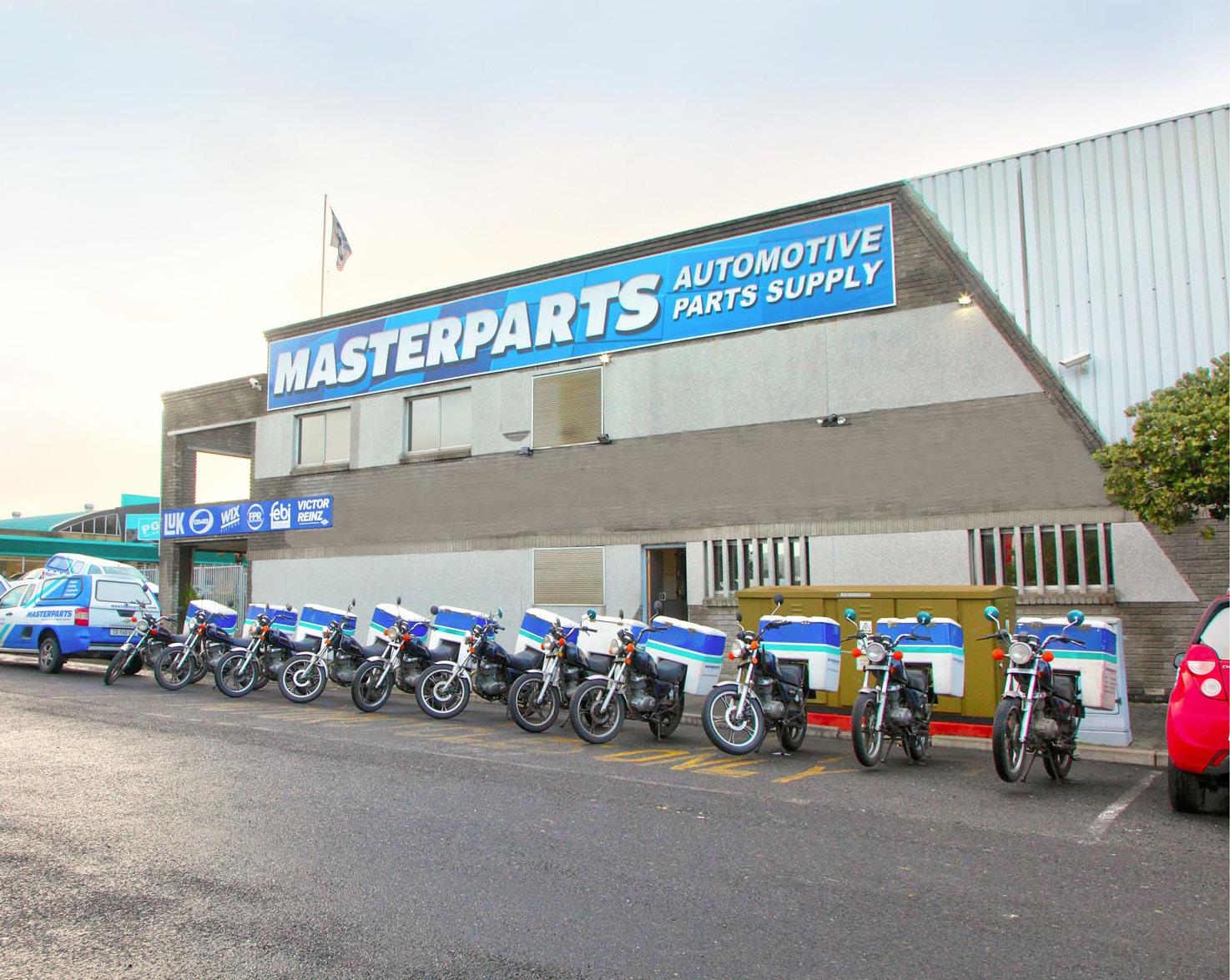
“We started in 1975 and were sourcing from local suppliers, agents and warehouses,” Managing Director, Chris O’Carroll, detailed last year. “As the company has grown we have been able to source directly from international suppliers in various markets in order to achieve our aim of having an extensive
range with good availability.
“We have one store in Windhoek, six in the Western Cape as well as the DC, and we have three in KZN,” he detailed, an already strong arsenal which has since been further bolstered by a site in Windhoek, opened in October, and earlier in the year, a huge new store in Pietermaritzburg.
The opening of the new warehouse in KZN was geared toward supporting the company’s strong growth in the region and streamlining the movement of stock around the
country. “The aim was to try and cut down on stock movement and make the handling process as efficient as possible.”
The logistical benefits of the new
// OUR SCOPE ENABLES US TO COVER THE FULL RANGE OF MAKES AND MODELS IN OUR MARKET //
warehouse site cannot be overstated, either; many Masterparts suppliers send products into the company from international markets and most come in through the Port of Cape Town, and the new warehouse means that these containers can come through the Port of Durban – subSaharan Africa’s largest – to expedite entry into Masterparts outlets.
“We buy from about 20 countries,” details O’Carroll. “We have suppliers in North and South America, Asia and a number of countries in Europe. That scope enables us to cover the full range of makes and models in our market.” For more than four decades, Masterparts has offered one of the largest selections of engine, transmission, steering, electronic, suspension, timing, exhaust, filtration, brake, wheel and cooling parts in the country, and is making it easier and easier for customers to walk into a branch and pick up what is required.
This broadening, strengthening footprint will be vital, as the automotive industry continues to regain confidence and freedoms are universally restored. People have returned to the roads with a vengeance, keen to make up for the time lost to the pandemic and its restrictions, resulting in more cars purchased and repaired and more people heading into stores in their droves again.
“Thankfully we are growing,” O’Carroll reiterated, with Masterparts firmly on the move. “We have added
Land Line: +27 11 592 7000
E-Mail: orders.mhza@mann-hummel.com
www.wixeurope.com
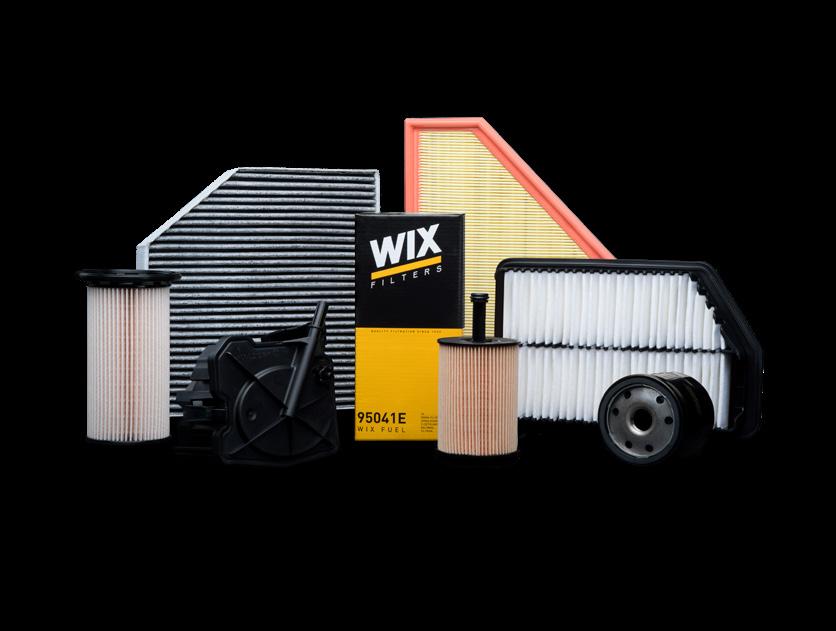
stores in order to reduce pressure on existing stores, so that we can maintain high levels of service.”
The auto sector in KZN has long been cited as thriving and driving itself forward with a number of major international brands present in the province, and a number of assembly operations helping to create opportunities; the new Masterparts warehouse means that stock could not be easier to come by for these clients and potential clients.
The KwaZulu-Natal automotive manufacturing sector is a major employer and driver of economic development, with around 20% of major automotive component suppliers located in the region contributing over R7 billion towards South Africa’s total value added. It is also home to Toyota’s
assembly plant, South Africa’s largest producer of vehicles.
“Now that we have the warehouse in Durban, we can service that region far more efficiently,” O’Carroll beamed, and it is only going to become more valuable as the KZN automotive industry looks to grow its sales, employment and manufacturing value added in support of Government’s objective of having 1.3 – 1.5 million vehicles produced in South Africa by 2035. This requires a near doubling of local production over the next five years, and Masterparts will play a vital role in supporting the KZN, and South African, drive to achieve it. WWW.MASTERPARTS.COM
// WE HAVE ADDED STORES IN ORDER TO REDUCE PRESSURE ON EXISTING STORES, SO THAT WE CAN MAINTAIN HIGH LEVELS OF SERVICE //


//South Africa’s automotive industry continues to move as a major driver of the economy – there is no swerving this indisputable fact. From manufacturing, distribution, technology, repair, after market, modification, and sales, the industry supports more than half a million jobs and contributes 4.3% of the country’s entire GDP.
It is the fuel of cities, it is the power of industries; the tough automotive industry connects South Africa, from Cape Agulhas to Musina. The likes of VW, Toyota, Ford, and BMW makes the cars that go out across the world. Some of the world’s best reside in the South African repair, mechanic, and engineering space. And one company leads the way in vehicle sales – WeBuyCars.
Established in 2001 by brothers Faan and Dirk van der Walt, the WeBuyCars journey started out in Pretoria. Doing almost everything themselves, the pair – who grew up
fixing cars, and buying and selling – created a stable business, adding more people and more stock each year. By 2010, the company bough the land it traded on and built a showroom for 100 cars. After just six months of opening this new site, the purchase of neighbouring property became necessary as demand boomed. Advertising on billboards and in newspapers, the company quickly grew its presence, with space for 700 cars. From here, national expansion was the next gear.
By 2012, new managers were appointed, and by 2014, buyers were present in all of South Africa’s major metros. The following years saw the company open up significant showrooms in Cape Town and Durban, but in 2017 WeBuyCars laid a marker for the industry, cutting the ribbon to the largest car showroom in Africa, able to house 1100 cars under one roof in Centurion. By the

end of 2019, the company employed its 1000th member of staff, and in 2020 a new brand and a new website was launched to bring the service offering of the company fully digital.
The next mile marker for the company was dramatic. In 2021, after many had suffered through the pandemic – with the entire automotive industry struggling – WeBuyCars revved its engine, acquiring the formerTicketpro Dome in Johannesburg. The 11,000m2 exhibition and events space was converted into one of the world’s largest second-hand car dealerships.
“The Dome is evidence that WeBuyCars is an agile business, exercising good judgement and making quick decisions. In fact, the decision to buy this site was made in one day. The Dome is evidence that WeBuyCars is disruptive and restless,” said David Hurwitz, CEO of Transaction Capital – the company that took a R1.8 billion share in WeBuyCars in 2020.
In 2022, the company is a different
model altogether when compared to the business of 21 years ago. Today, owners of cars, bakkies, busses, bikes, trailers, caravans and boats can get quotes for their assets online, before welcoming an agent to their home to purchase these vehicles. WeBuyCars sells the assets on through its showrooms and weekly online auctions.
Like most, the company has had to adjust to a set of issues that seem to come through like a traffic jam finally receiving a green light. In South Africa, floods, riots, political instability, energy, inflation, and interest rate rises have
all hit consumers and businesses hard. Globally, the pandemic continues to leave a legacy, and the war in Ukraine continues to hamper international supply chains. The automotive sector in particular has been handbraked by a global shortage of semiconductor chips.


// THE DOME IS EVIDENCE THAT WEBUYCARS IS AN AGILE BUSINESS, EXERCISING GOOD JUDGEMENT AND MAKING QUICK DECISIONS //

company announced it had reached the milestone of purchasing 12,000 vehicles in a month. Chief Marketing Office, Rikus Blomerus said: “The number of transactions in the market increased from 1,633,003 to 1,659,395 from July 2021 to June 2022 versus the previous period, amounting to a 1.62% increase. Yet over the same time, our sales have increased by 39.12% due to our increased footprint, internal operational efficiencies, and technological advances.”
But WeBuyCars is a problemsolving company at its core. The founders have always been fixers, and bumps in the road are regularly overcome.
Total domestic sales for 2022 up until end of November sat at 487,2180, up 13.68% on the previous year. WeBuyCars was a strong player in this growth. In September, the
The result of this success was a move to a new 3000+m2 office space in Centurion at the Byls Bridge Office Park, itself an exciting and beautiful development, home to may other continent-leading organisations.
The pandemic slowdown that hit the brakes for the industry saw many change their buying patterns as their situation changed. Importantly
for WeBuyCars, many moved away from new car purchases and opted for used. This helped the company to cruise through, jumping from 6000 sales each month before March 2020, to 11,000 sales per month in February 2021. The average price of the cars sold reflected the new level of demand, accelerating by 8% in 2021.
In May, Wynand Beukes, Chief Digital Officer at WeBuyCars, told eNCA that the company had done all the right things when navigating the legacy of the pandemic, and would be there for those looking to manage their transport situation as the cost-of-living crisis grips.
“We didn’t see a big trend of more people selling their vehicles and registering vehicles. The great thing about WeBuyCars is that we grew by around 3% in our market
// THAT IS THE GREAT THING ABOUT WEBUYCARS, WE SERVE THE WHOLE MARKET. WE HAVE EVERYTHING AND WE BUY EVERYTHING //
in the past 12 months,” he said.
“If you look at what people are trading in and what they are buying after that, people who trade in hatchbacks go for hatchbacks again. But there is a trend for people trading in SUVs to go for smaller sedans that are more economical.”
The company expected that trend to continue as petrol prices spiked, and they were right. The petrol price sits today at R23.16 for unleaded 93 and R23.46 for unleaded 95, and this bites consumer wallets.
“Many of the enquiries on our website are for vehicles under R200,000,” added Beukes. “That is the great thing about WeBuyCars, we serve the whole market. We have everything and we buy everything.
“There is a stock shortage and that has been because of the floods in Durban for example. There has been a shortage on Toyotas and the market is waiting for them.
“We try to give as much information about the vehicle as possible, so that the consumer can make an informed decision,” he went on. “Right now, fuel efficiency is right at the top of the list of enquiries.”
Despite questions around affordability and household finances, WeBuyCars remains popular because it is not only a provider of excellent deals on used cars, covering the entire market spectrum, it is also a tool for money making as customers can quickly and easily sell their car should they want or need to. The process comes highly recommended and, according to most, is painless.
With new branches in place in Polokwane and Nelspruit bringing the company’s track mark to 13 in South Africa, there are more to come as WeBuyCars sees opportunity for sustained growth.
Plans are already being implemented to take the brand to Africa with a small operation active in Morocco and other markets in the headlights. Adding ancillary services
including mechanical support and financing have been successful and, in collaboration with Transaction Capital, GoMo was launched as an inhouse personal finance offering, allowing customers to easily package insurance, maintenance, and a quality used vehicle.
Above all, the company’s deeply held values remain around quality customer service and delivery of superior products.
“At WeBuyCars you, our valued customer, always comes first,” the company states. “We pride ourselves on high quality, professional and safe service to ensure a hassle-free experience for you. We do not make use of third parties or agents. Over decades we have built solid relationships with car dealers across South Africa. Numerous dealers trust WeBuyCars to be the source from which they obtain
quality vehicles. We are committed to customer service, trust and adding value to the distribution network.
“As South Africa’s number one car buying and selling service,” it continues, “WeBuyCars buys and sells thousands of vehicles every month. As such, we serve and support thousands of South Africans on a monthly basis.”
Without this unending focus on delighting the customer, the tank in WeBuyCars would have dried up long ago. The brand is no longer about only car sales; it is now a strategic partner for consumers and industry, and that is why it continues to thrive.


It was Gus Ackerman’s vision of a world where value-for-money products are affordable to all that saw the doors open on the very first Ackermans store in 1916 in Wynberg, Cape Town. This vision remains at the heart of every one of the nearly 1000 stores operating across six countries today, a number that increases with irrepressible speed. “At Ackermans we’re proud of where we’ve come from, and excited about what’s still ahead.”


Family comes first, and always will: this is the central doctrine shared by South Africa’s value retailer, and that which originally inspired founder Gus Ackerman to cut the ribbon on his historic first store in Wynberg; immediately, he succeeded in creating a place where customers could find great products at unprecedented prices, providing value fashion for the whole family and creating an ethos to which Ackermans remains dedicated today.
“We are a leading value fashion retailer for the whole family –continuously setting the standard for value and affordability,” says the South African stalwart. “With a wide selection of fashion for ladies, kids, babies and
men, as well as homeware, cellular and key financial products, we’ll keep bringing value to your life every day.”
Paying less without compromising on either quality or style is the Ackerman’s way, always important but primordial now up when cash is increasingly having to be squeezed harder and harder to facilitate all of the important things in life. “We call it Bringing Value to Life, and it’s what we work toward every day,” is the commitment that Ackermans has evinced for more than a century.
“Our customers have been at the heart of our story for over 100 years,” Ackermans explains, and one of the
many elements to the Ackermans brand is the breadth the of the audience it attracts, comprising valueseeking consumers spanning a host of roles and responsibilities but with one definite commonality: they are generally strongly family-focused.
“We’re with you for the balancing
AT ACKERMANS WE’RE PROUD OF WHERE WE’VE COME FROM, AND EXCITED ABOUT WHAT’S STILL AHEAD //
act of family life - we understand the pressure on your pockets and we get that every little helps,” Ackermans vows, responding with the tireless and unending bid to offer valuefor-money products at competitive prices, along with multiple payment options. “These are supported by a strong service culture, a focus on store accessibility and a busy promotions calendar,” the company adds.
Ackermans resides within the Pepkor Holdings family, whose total 5,470 stores operating across 10 African countries give it the largest retail store footprint in southern Africa to flaunt many of the most trusted brands on the continent. Pepkor and Ackermans are a perfect fit, and their respective ethe have many synergies. Like Ackermans, Pepkor began life over 100 years ago and has, too, built a reputation of giving
South Africans the right products, at the right price and at their convenience.

Ackermans also fits in well with Pepkor’s bid to dominate in the discount and value market segment, one which it has found to enjoy natural resilience in large part thanks to customers’ ability to buy ‘up’ or ‘down’ according to both their budgets and prevailing economic conditions. “Pepkor’s long success rests on its understanding of, and strong relationships with, its customers,” it further echoes. “Pepkor brands are part of the fabric of southern African life.
“Deep, market-specific knowledge is the foundation of the group’s strategic and operational ability and has allowed Pepkor brands to
// WE ARE A LEADING VALUE FASHION RETAILER FOR THE WHOLE FAMILY –CONTINUOUSLY SETTING THE STANDARD FOR VALUE AND AFFORDABILITY //
offer southern African customers, especially those with limited disposable income, access to an extensive range of value-for-money products and the opportunity to live their lives with dignity, respect and pride. We have done this for more than 100 years and will continue to do so through our trusted brands.”
Under this most trusty of wings since 1986, Ackermans has grown into one of Pepkor’s most important operating subsidiaries, as well as one of its most profitable and robust, which unceasingly grows its market share as savvy consumers abandon retailers for whom value and service are merely meaningless buzzwords. Popular throughout the generations and genders, it is without doubt the baby and children’s wear segment for
which Ackermans is most vehemently celebrated, and recognition for which dominates the many, many awards that it has garnered through the decades.
Not a year has passed since 2010 that Ackermans has not received the plaudits of some of the key industry honours - the Times Sowetan Retail Awards, Best of Bloemfontein Reader’s Choice Awards and Kasi Star Brands Survey among them - for its junior lines, and number one for children’s clothing over multiple years in the Ask Afrika survey. One fabric in particular has allowed Ackermans to have this category well and truly sewn up, with durable, versatile and cost-effective denim an all-occasion champion for arguably the most sartorially discerning customers.
“Ackerman’s kids’ denims are
durable and can be mixed and matched to create outfits for all occasions,” the company declares. “And the best of all is they don’t cost an arm and a leg.”

Once again, this perfectly illustrates the Pepkor-Ackermans team-up delivering veritable value by using world-class systems and processes, ones that ensure cost efficiency as well as product quality. “By keeping our costs low, we give more customers the opportunity to look and feel good,” Ackermans reasons, and the overarching mission of each and every one of its stores is to make the greatest range of products affordable to everyone.
The Ackermans experience centres on its philosophy of ‘bringing value to life’, guiding Ackermans’ more than
to its business.” Perhaps the greatest testament to the success of this approach is in the ever-swelling number of Ackermans stores, sites and outlets decorating South Africa’s key retail locations. That 15 of these have appeared in only the last month is quite staggering; it is a feat arguably dwarfed by the opening of 50 last year, in the context of Covid’s continuing chaos.
Ackermans remains very much alive and well, then - better than ever, in fact, and unlikely to be forced to confirm its own living status any time
communities in which we operate by providing easy access to everyday products and services at the best price.
“Every Pepkor business maintains an ongoing focus on the group’s ultimate purpose: to make a positive difference in the lives of our customers.”

// EVERY PEPKOR BUSINESS MAINTAINS AN ONGOING FOCUS ON THE GROUP’S ULTIMATE PURPOSE: TO MAKE A POSITIVE DIFFERENCE IN THE LIVES OF OUR CUSTOMERS //


Much more than just the foremost tobacco manufacturer in South Africa by market share, British American Tobacco (BAT) is a leading, multi-category consumer goods business drawing on a long and rich history since its founding in 1902. Innovation and ambition continue to collide in the never-ending quest for new and better products, as the company embarks on a drive to Net Zero before 2050.
Founded in 1902, the BAT Group today is a truly global company employing more than 53,000 people worldwide, with operations in over 180 markets and factories in more than 40 countries. “We’ve been around a long time, and have evolved into one of the world’s leading consumer goods companies,” BAT opens of 120 years at the forefront of the industry, “proud of our history and excited about the opportunity to write a new chapter in our success story.”
The Group’s global business is divided into four regions and covers over 150 million consumers and 11 million retail points of sale, offering a balanced presence in both high-growth emerging and developed markets. BAT is made up of more than 53,000
individuals across the world, based in offices, factories, tech hubs and R&D centres but also at grass roots - on the road helping and advising tobacco farmers and the retailers who sell the finished products.
“Both are valued partners who have always played a major part in our success,” BAT states. “We pride ourselves on the strength of our relationships with farmers, suppliers and retailers –crucial business partners who are vital to the sustainability of our company.
“Our operations span the globe; we are a leading FTSE company with truly international credentials.”
As the only large-scale tobacco manufacturer producing locally in South Africa BAT buys 90% of locally
grown tobacco leaf, which supports 200 commercial tobacco farmers, 150 emerging farmers and facilitates some 10,000 agricultural jobs. “We are a BBEEE level 4 company,” BAT elaborates, “employing more than 1100 people
Continues on page 150
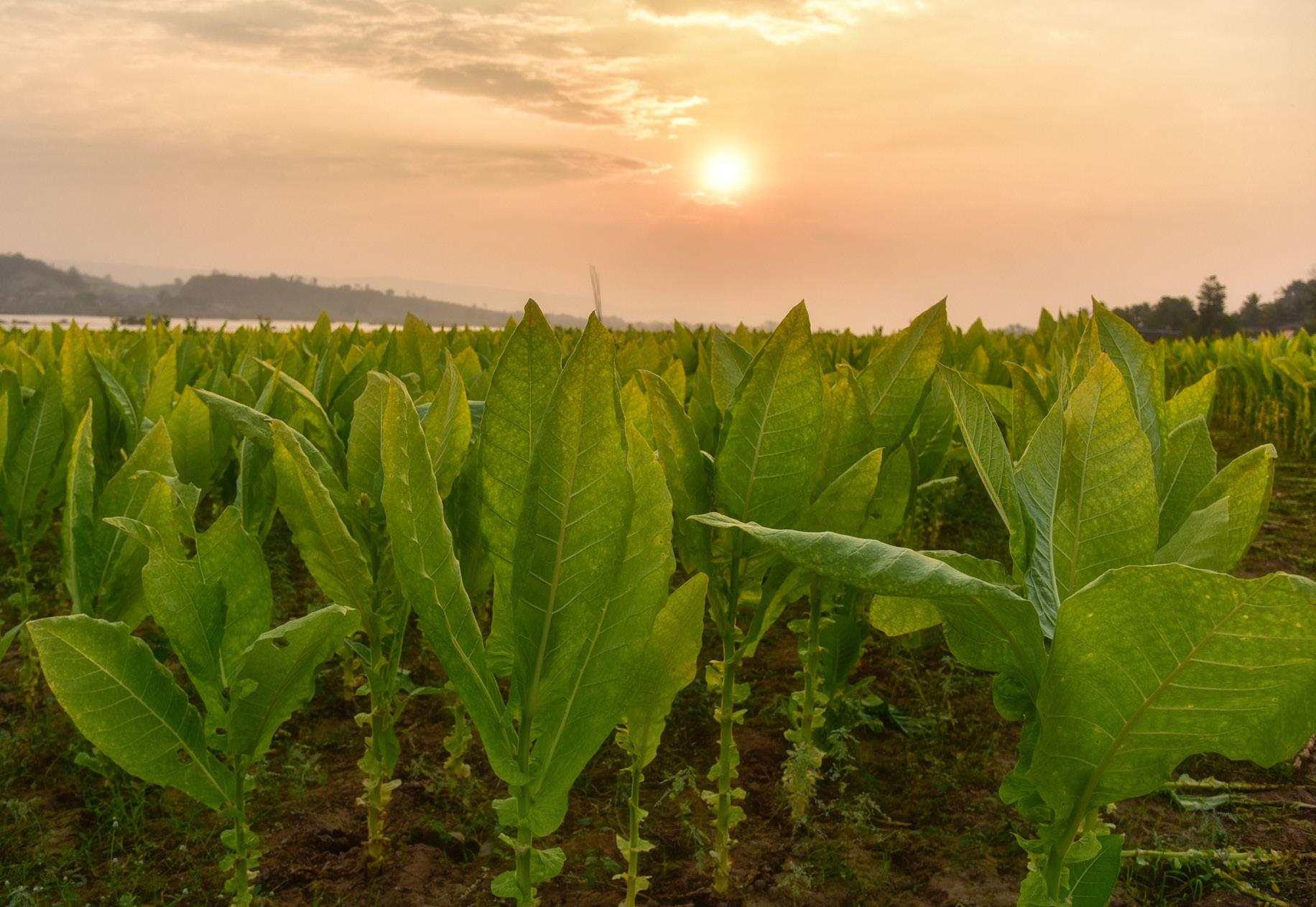
// WE’VE BEEN AROUND A LONG TIME, AND HAVE EVOLVED INTO ONE OF THE WORLD’S LEADING CONSUMER GOODS COMPANIES
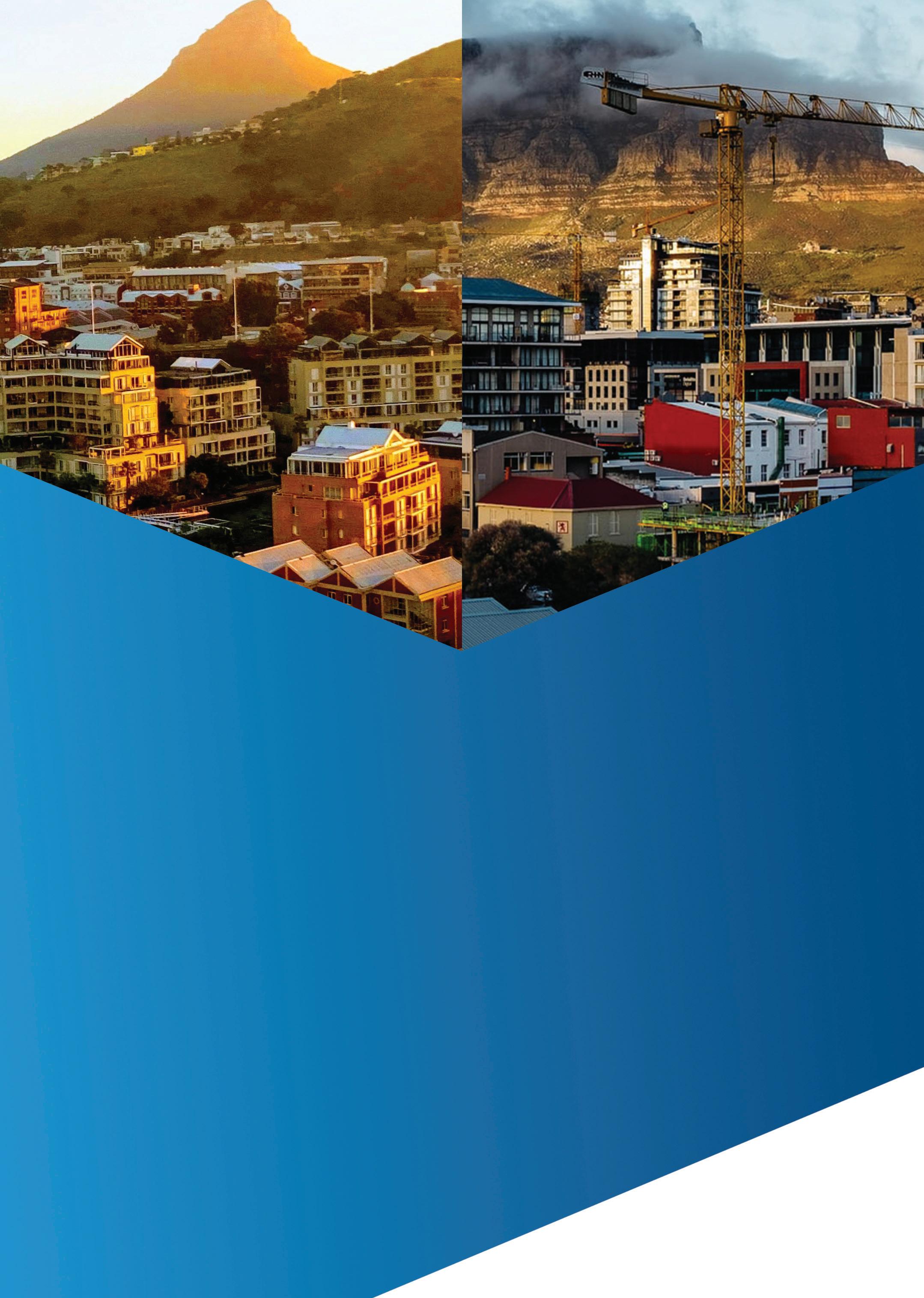
Continued from page 148
directly and goods and purchasing goods and services worth R6 billion from local suppliers, certified in 2020 as a Proudly South African company.
“We have a strong heritage of more than 100 years in South Africa, and are the country’s leading tobacco manufacturer by market share.
“BAT is the only remaining largescale local tobacco manufacturer in the country, and also the sole tobacco manufacturer that is fully integrated into the tobacco value chain.”
BAT’s Heidelberg factory is the eighth largest in BAT’s global armoury, and accounts for a significant total production for both domestic consumption and export into the wider Southern African Region. From
the outset it was ahead of its time, and remains the largest employer in the Heidelberg area boasting the capacity to produce more than 27 billion cigarettes a year for local and export markets.
“British American Tobacco South Africa is a significant player in the global BAT group, with a proud local heritage,” summarises André Joubert ESA Area Director, “committed to the future of this country and protecting local tobacco production and the 125,000 jobs sustained by our operations.”
A long, proud and distinguished history is evident, certainly, but BAT’s enduring success and accompanying diversified portfolio has always lain in and reflected its commitment to meeting the evolving and varied needs of the contemporary adult consumer. In March 2020 Chief Executive Jack
Bowles laid bare BAT’s evolved strategy, at the heart of which was the vision to ‘Build A Better Tomorrow’, by reducing the health impact of the business through a greater choice of enjoyable and less risky products for consumers.
“Our A Better Tomorrow purpose drives a reduction in the health impact of our business, and is based on three core beliefs,” BAT details. “Rigorous science should underpin our portfolio of reducedrisk products, product innovation is essential to satisfy evolving global consumer needs and sustainability is at the centre of our business decisions and heart of our strategy.”
Along its six celebrated cigarette brands Dunhill, Peter Stuyvesant, Rothmans, Pall Mall, Benson & Hedges, and Kent, BAT South Africa’s portfolio today comprises a range of scientifically tested, reduced risk vapour products, and modern oral products, under its own brands Vuse and VELO

// BRITISH AMERICAN TOBACCO SOUTH AFRICA IS A SIGNIFICANT PLAYER IN THE GLOBAL BAT GROUP, WITH A PROUD LOCAL HERITAGE //
respectively. Free of tobacco, VELO is a global brand available in more than 14 countries and now in South Africa, while Vuse is one of the world’s leading vapour brands and the first carbon neutral vape brand globally.
“BAT South Africa’s diversified portfolio reflects our commitment to meeting the evolving and varied needs of today’s adult consumer,” the company asserts. “Adult nicotine consumers drive everything we do at BAT South Africa, and we invest effort and care in understanding their preferences. We believe that adult consumers should make informed choices about their brand and product preferences, and we aim to meet the evolving and varied needs of today’s consumers who seek sensorial enjoyment for different moods and moments.”

With the spirit of evolution and choice such prominent elements of this prolific company, it is only befitting that 2022’s half-year results evidence the primordial importance of New Categories, whose overall revenue boomed 45% to reach £1,283m.
Vapour revenue was up 48% and Vuse extended its global category value share leadership, becoming top in the U.S, and Modern Oral revenue also climbed by 37%, driven by Velo and its continued volume share leadership in Europe.
“I am very proud that our continued New Categories growth momentum is driving Faster Transformation,” Bowles reiterated. “We are delivering both strong operational performance and transforming the business. Our A Better Tomorrow purpose, partnered with our well-established multi-category strategy, continues to drive growth. We are confident in delivering £5bn New Category revenue, and profitability, by 2025.” Also central to BAT’s strategy is the transition from being a business where sustainability has always been important, to one where it is front and centre in everything that it does. “Specifically, we are clear that reducing the health impact of our business is our principal focus area, as well as placing a greater emphasis on the importance of addressing climate
change and excellence in environmental management,” BAT furthers, and now an aggressive, targeted Low-Carbon Transition Plan has set out the specifics of aligning its business model with a thriving economy that works for people and the planet in the long term.
“We’re proud to take this latest step in our sustainability journey,” beamed Kingsley Wheaton, BAT’s Chief Growth Officer. “By outlining the measures we will take to live up to our Net Zero targets through our Low-Carbon Transition Plan, we’re demonstrating our continuing commitment to building A Better Tomorrow. As a global company, we know minimising impacts across our value chain is the right thing to do, as well as making sound business sense. That is why we have set stretching science-based climaterelated targets and continue to embed sustainability across our business.”
Important events and exhibitions taking place across sub-Saharan Africa, giving brands a platform to tell their story.
JAN 23 - 25 | ADDIS ABABA
EITE is a multi-sector trade show that showcases the latest products and services in the consumer market ranging from home decor and electronics to textiles and FMCG products and everything in between. The event is set to be a one stop shop to source and display commodities, meet with industry partners and customers and examine recent market trends and opportunities.
Ethiopia was Africa’s fastest growing economy in 2015 and having the continent’s second largest population, there is a huge demand from the rising middle class for consumer goods. Being a strictly B2B trade show, EITE is guaranteed to offer return on investments for exporters and manufacturers looking for new business contacts in the last big untapped market on the continent, Ethiopia.
FEB 15
FEB 15 - 17 | KIGALI
The African Fine Coffees Conference & Exhibition is Africa’s largest coffee trade platform that – over the three days of the event –brings over 2000 regional and international coffee roasters, traders, producers, professionals and connoisseurs under one roof!
The wonderful exhibition area has increasingly been regarded as pivotal in providing a unique opportunity to exhibitors showcasing the best coffees and affiliated services and providing ample opportunity to network with coffee luminaries from all over the world. This will be the perfect platform for gathering valuable coffee information, building trade relations and buyer/seller interaction.
FEB 27
FEB 27 - MAR 01 | JOHANNESBURG
Meetings Africa 2023 will see the 17th advent of this Business Events Trade Show, owned by South African Tourism, with the specific objective of creating a market access platform, for African Business Events Products. It serves as the primary platform to enable the growth of the business events industry on the continent and ultimately contributes towards its economic growth.
Meetings Africa is a 2-day trade show with a dedicated Educational Day which is executed in conjunction with the key global, continental and national industry associations.
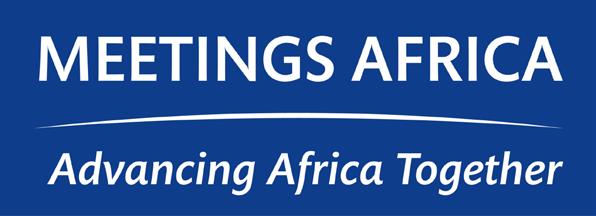
Meetings Africa exists to provide a platform for exhibitors to showcase their offerings to International and local buyers, African associations and corporate planners. It is the most formidable platform on the continent for you to meet face-to-face with the most influential buyers in the world, and to be part of Africa’s growth.
ETHIOPIA INTERNATIONAL TRADE EXPO | ADDIS ABABA
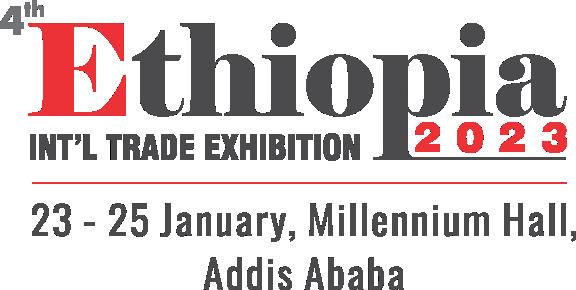
SOLAR POWER AFRICA CAPE TOWN
AFRICAN FINE COFFEE CONFERENCE | KIGALI
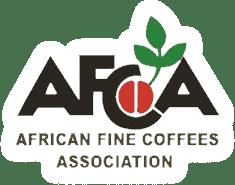
INVESTEC CAPE TOWN ART FAIR | CAPE TOWN
SENCON DAKAR
MEETINGS AFRICA JOHANNESBURG

